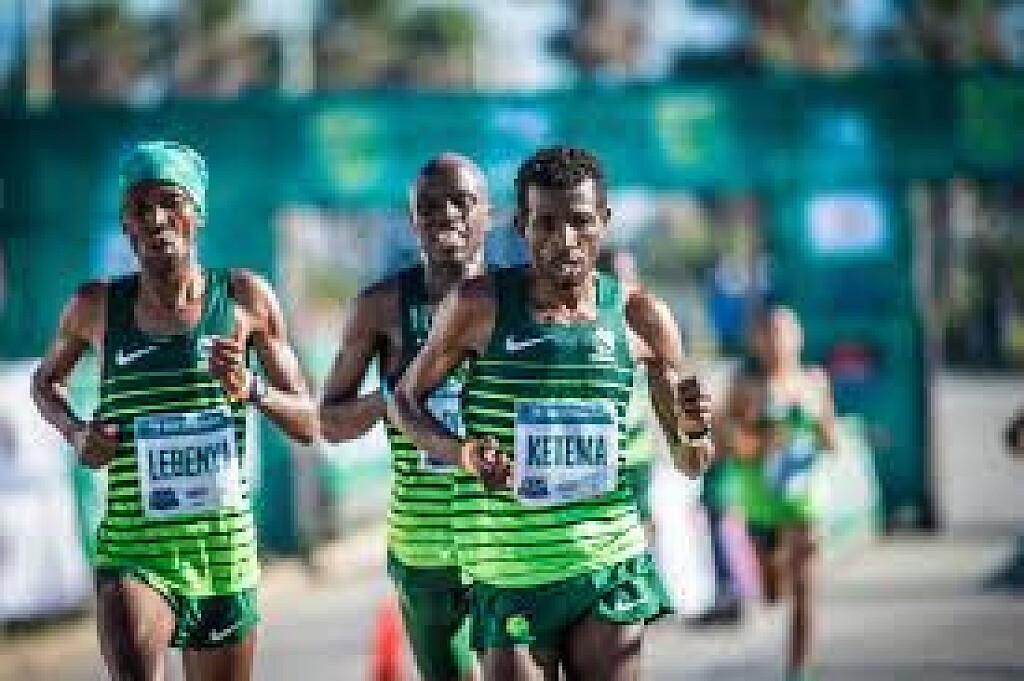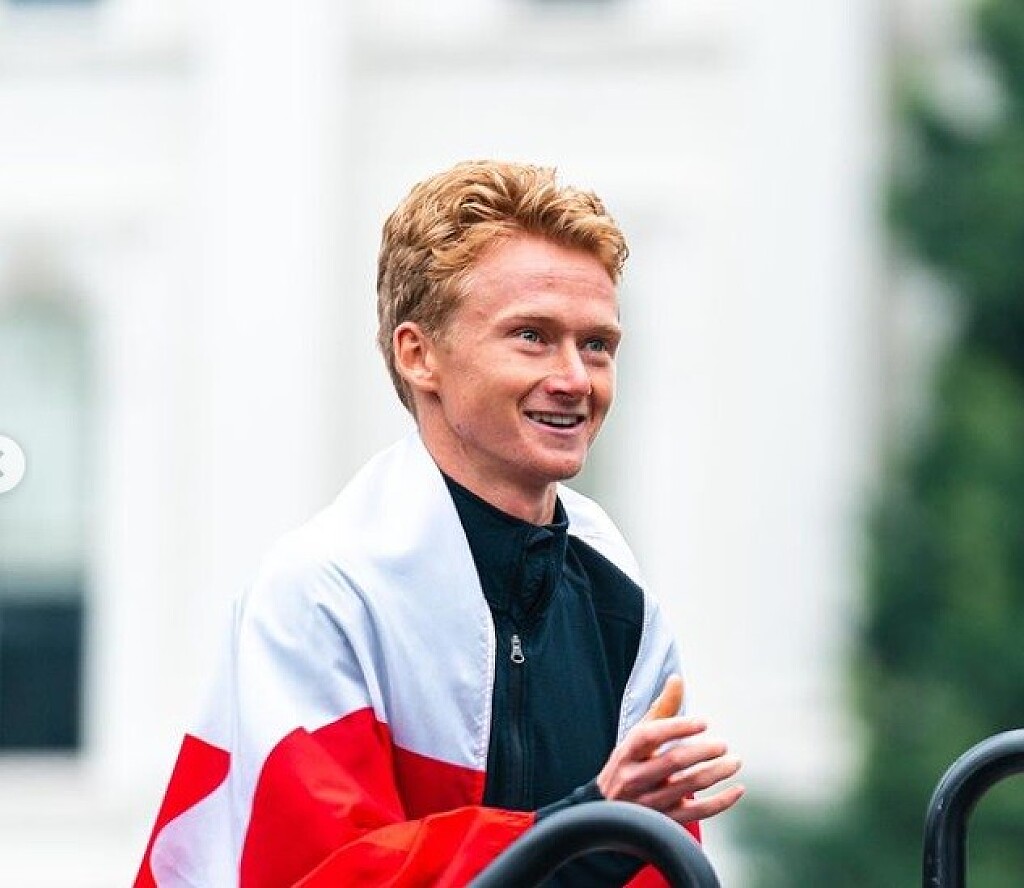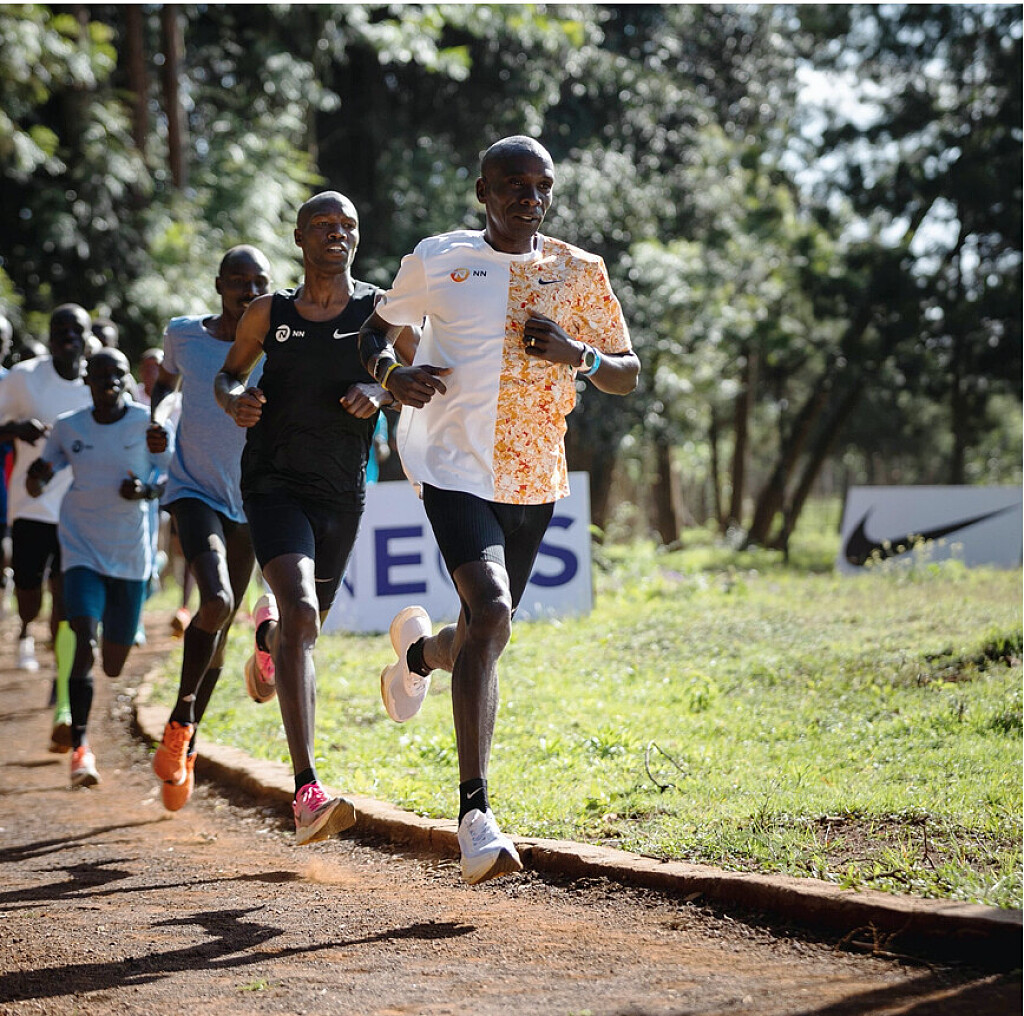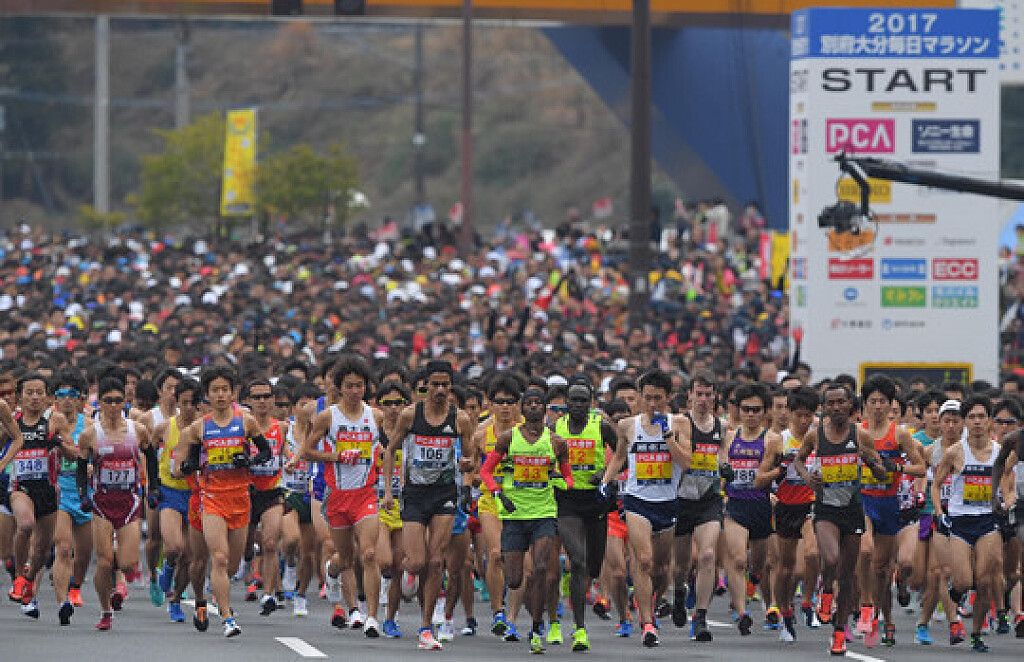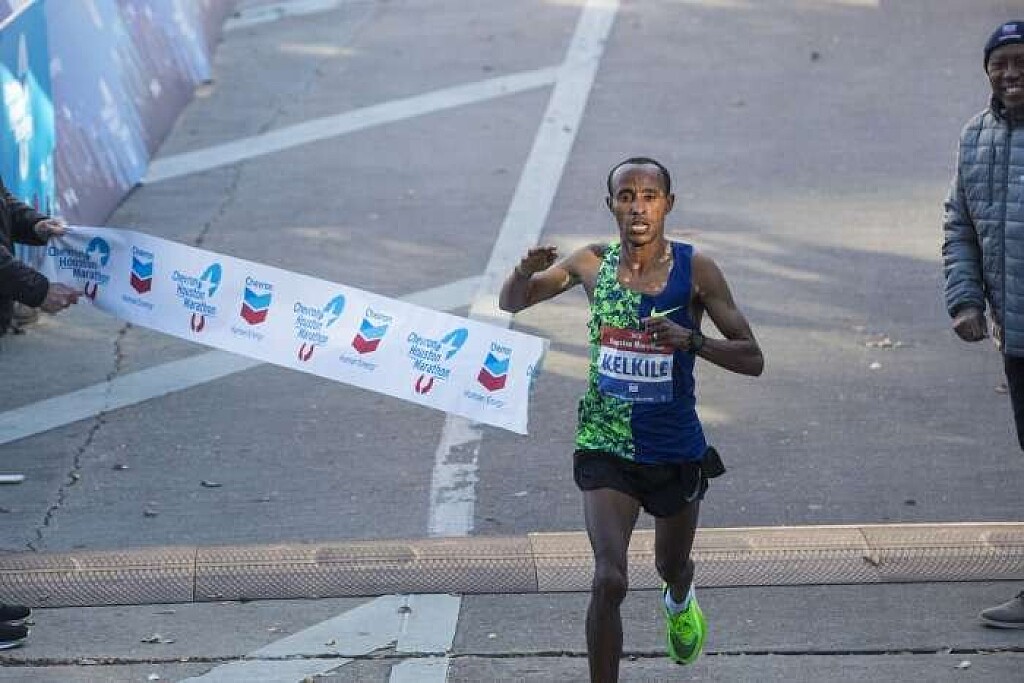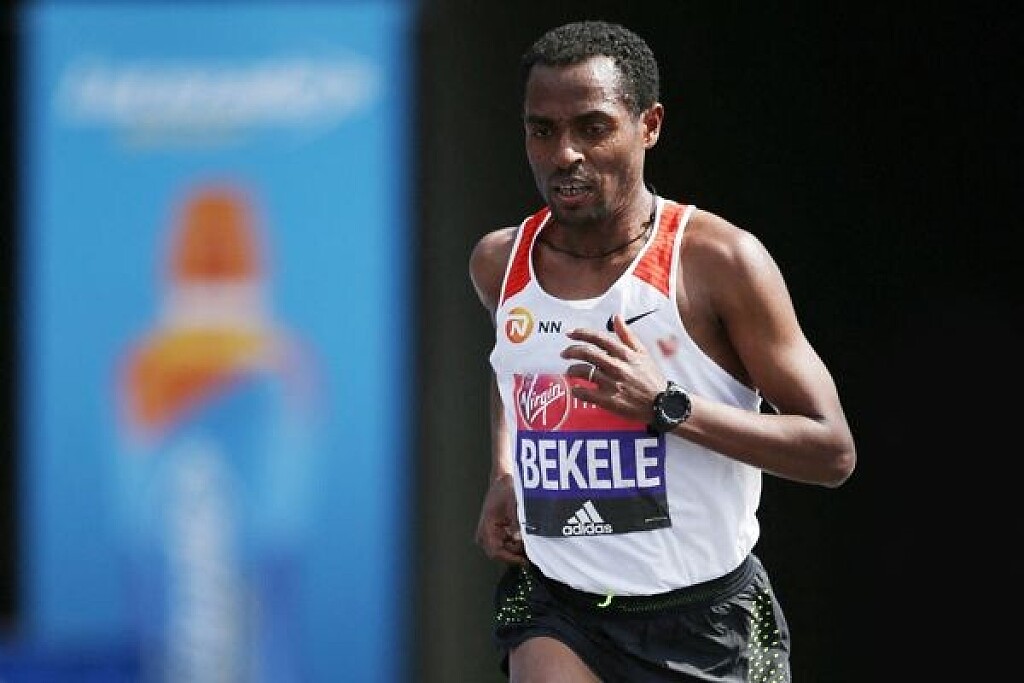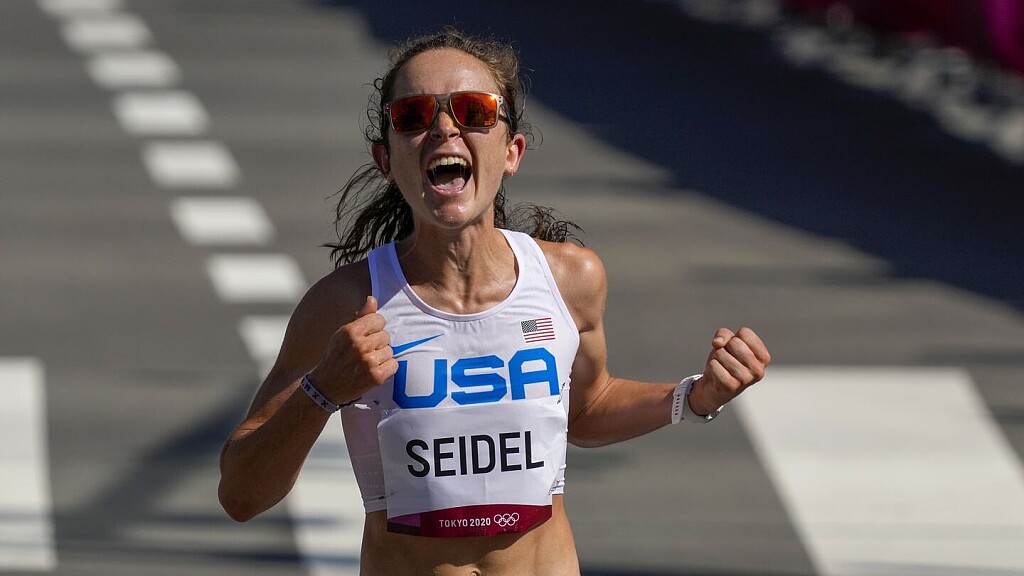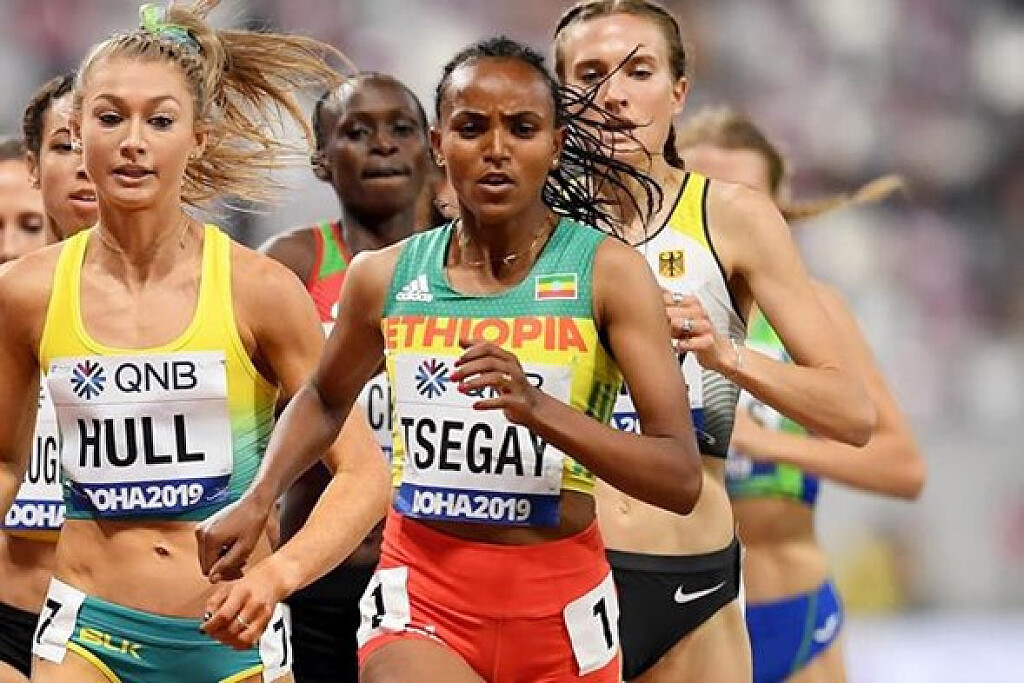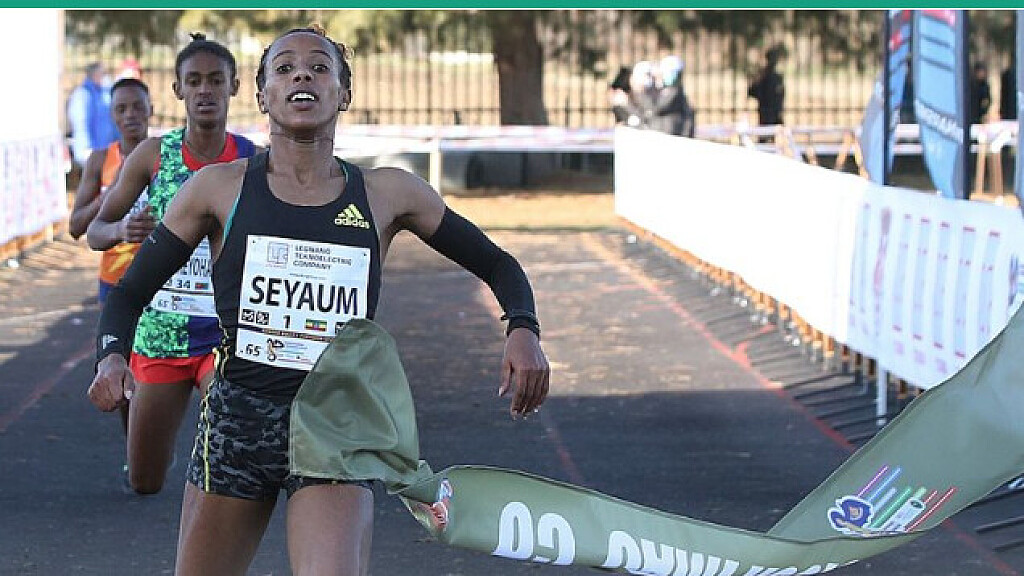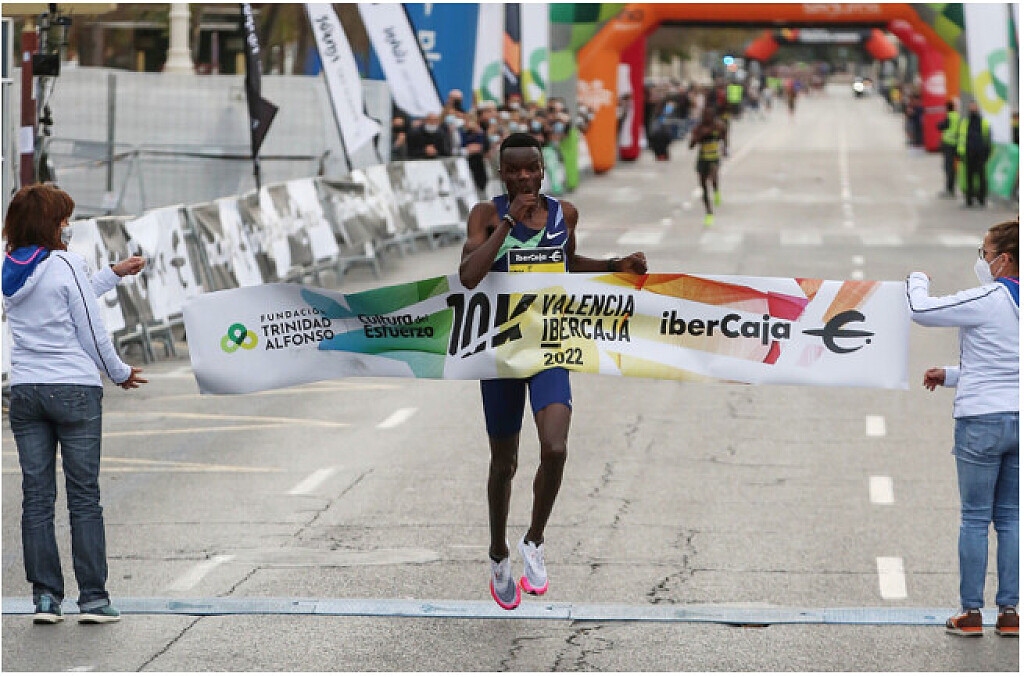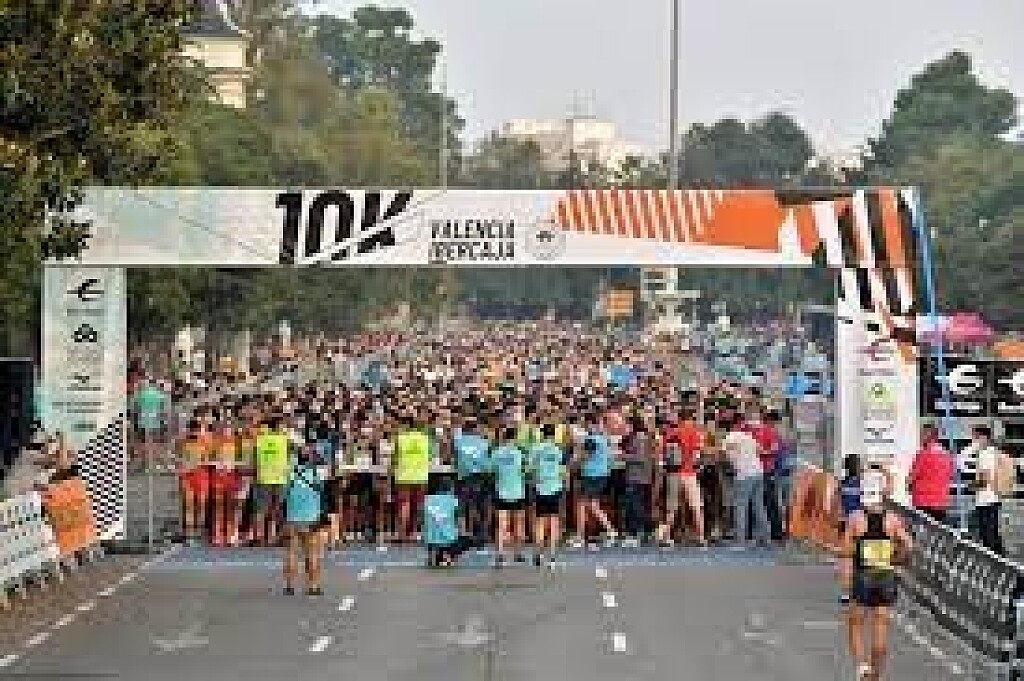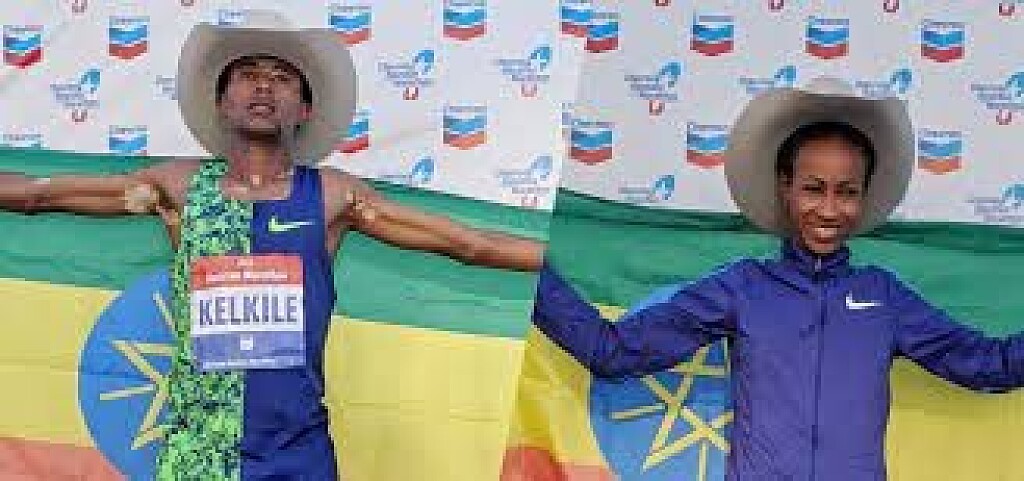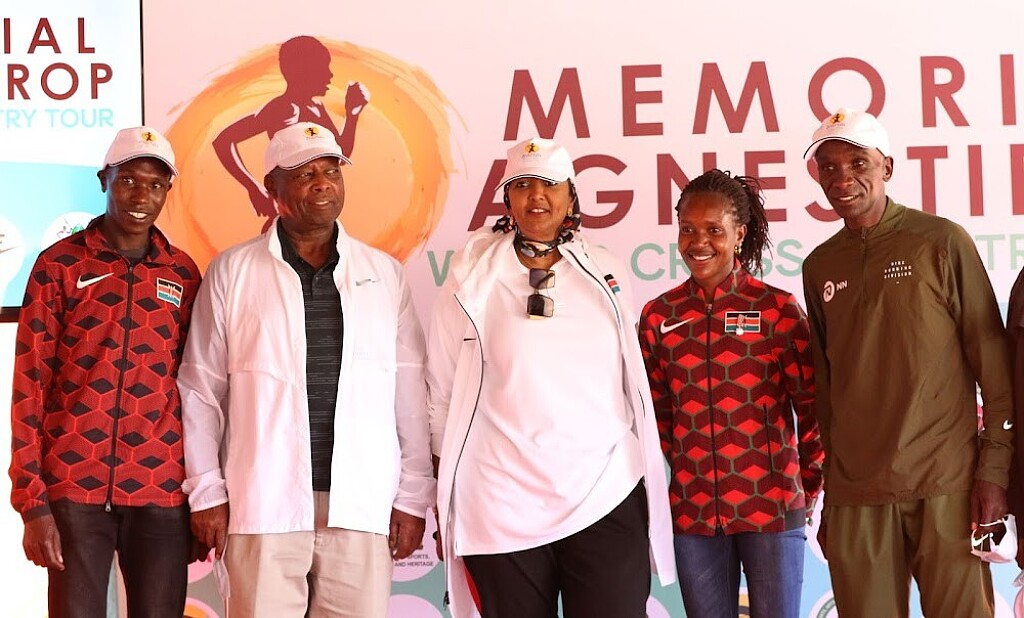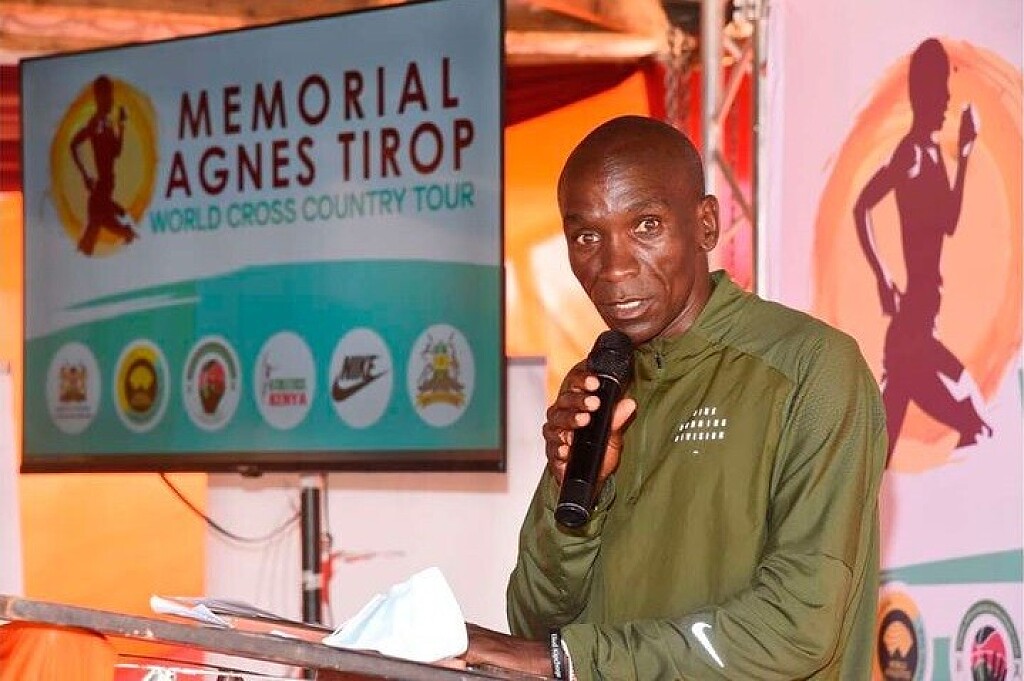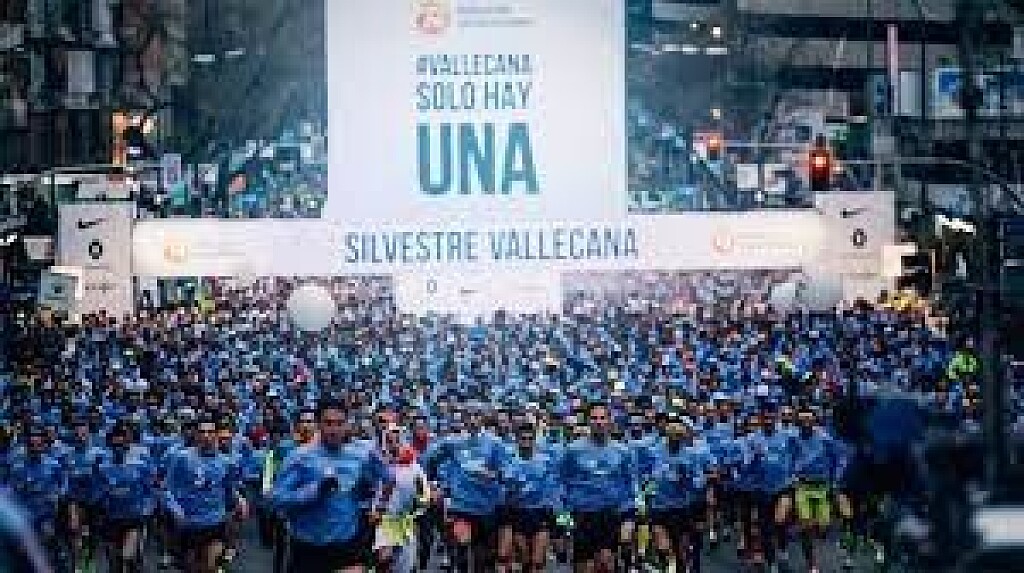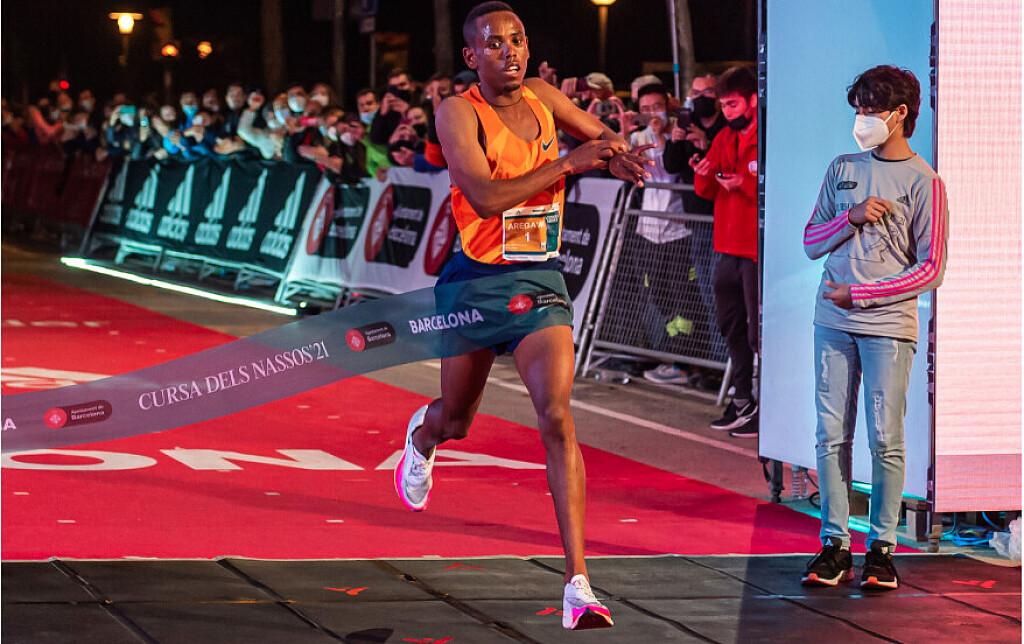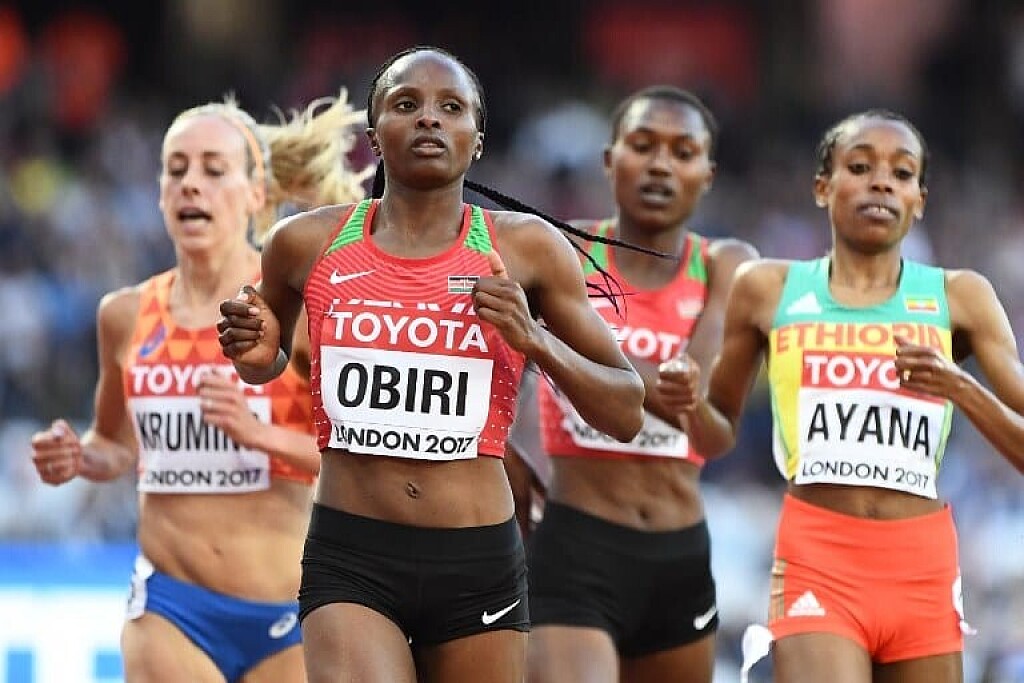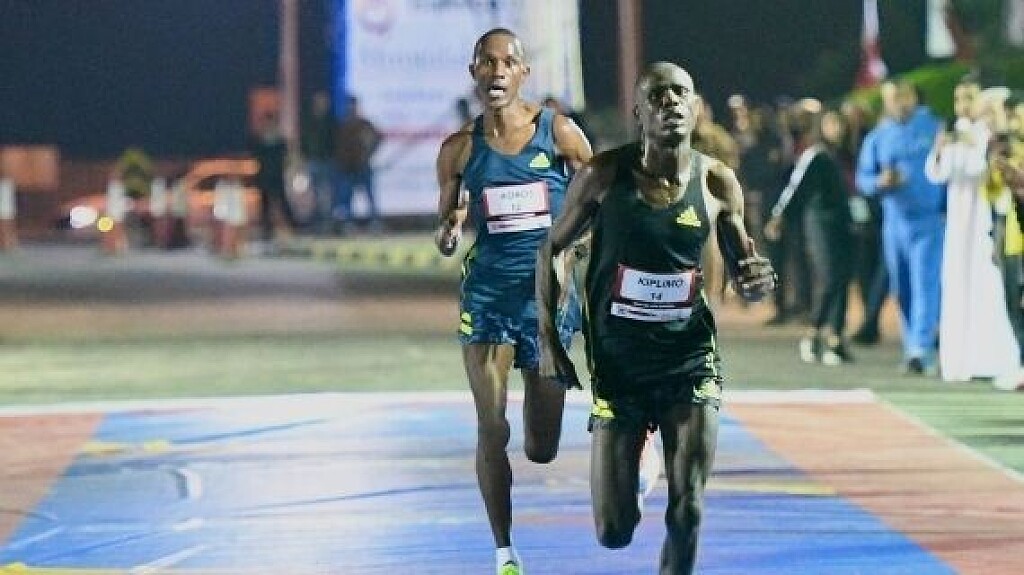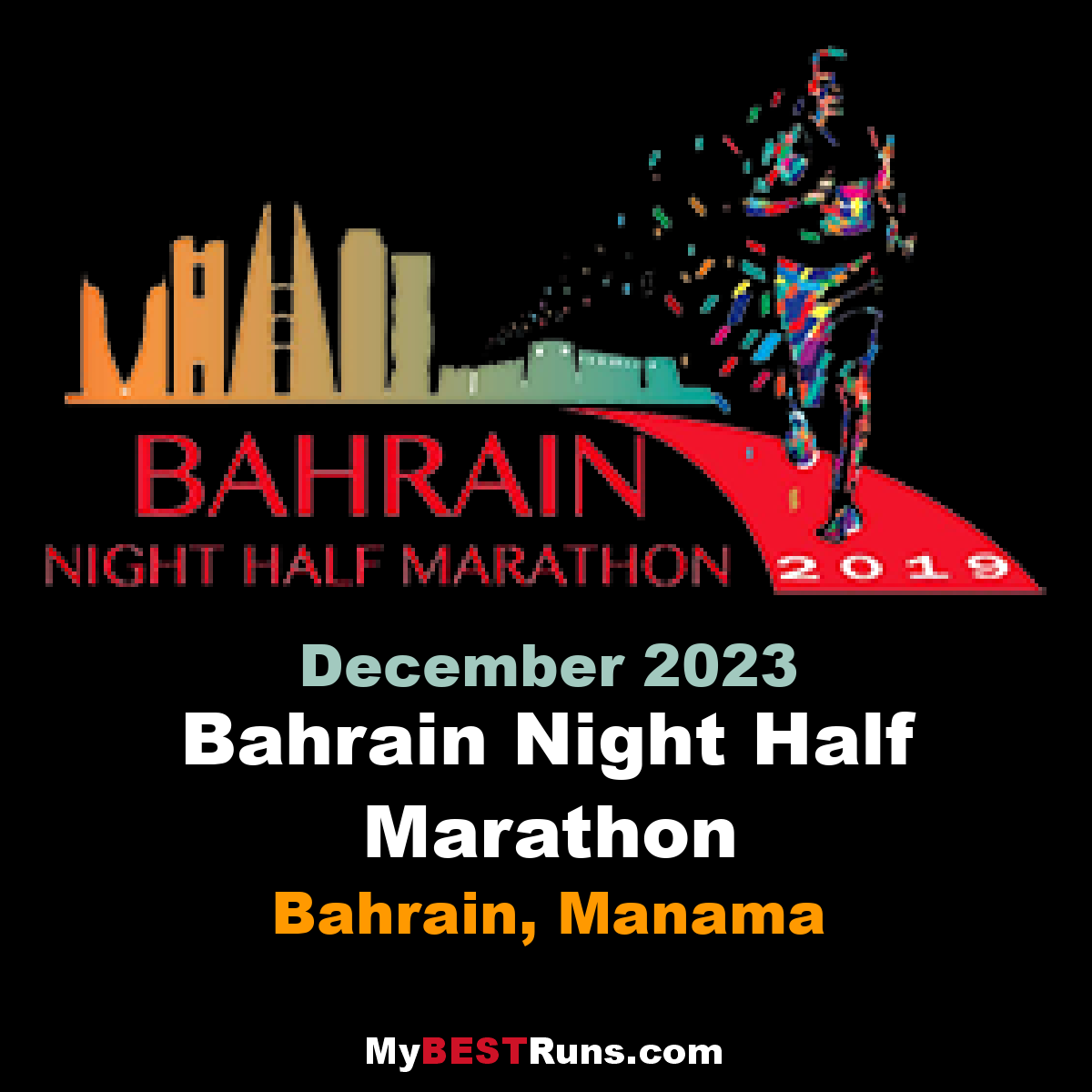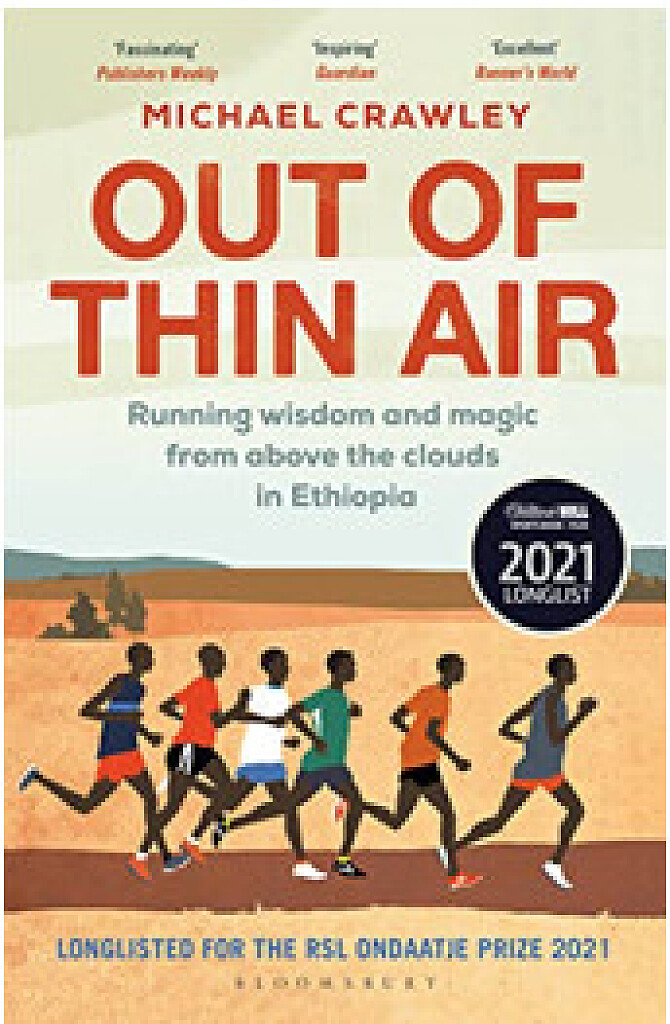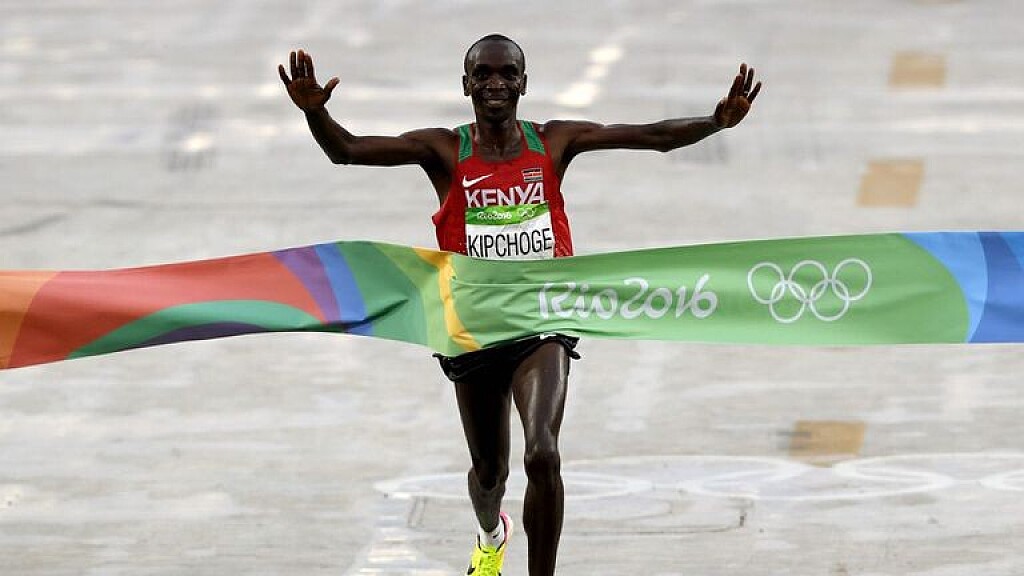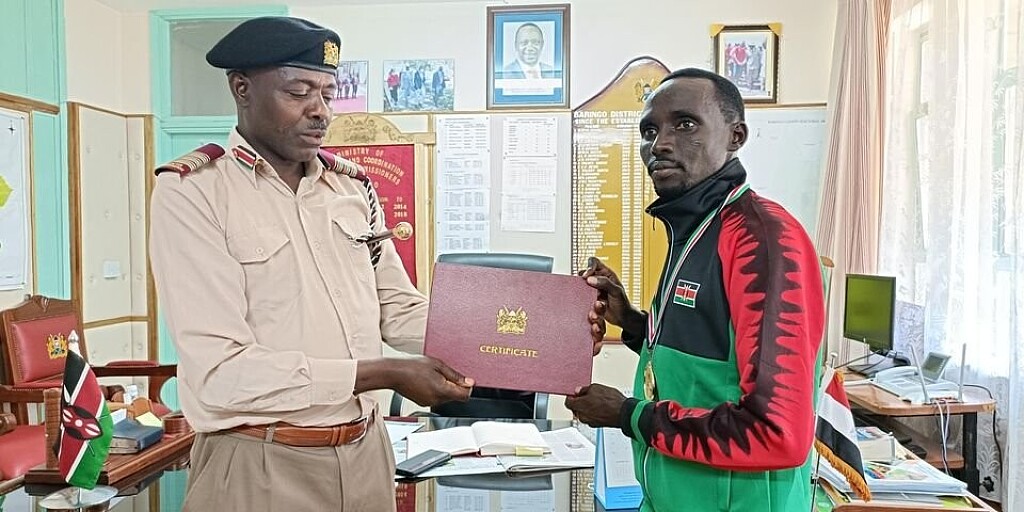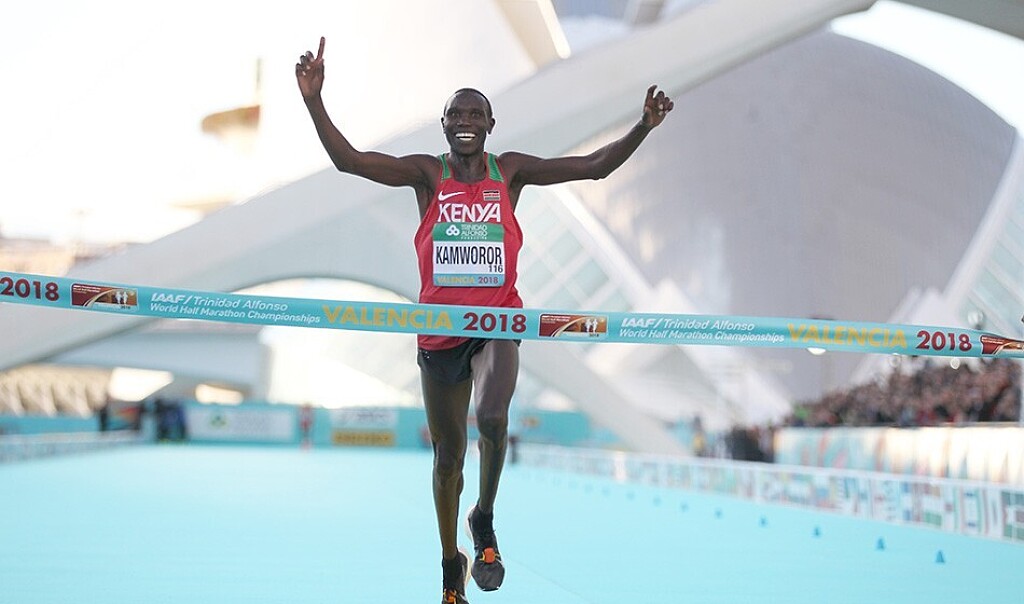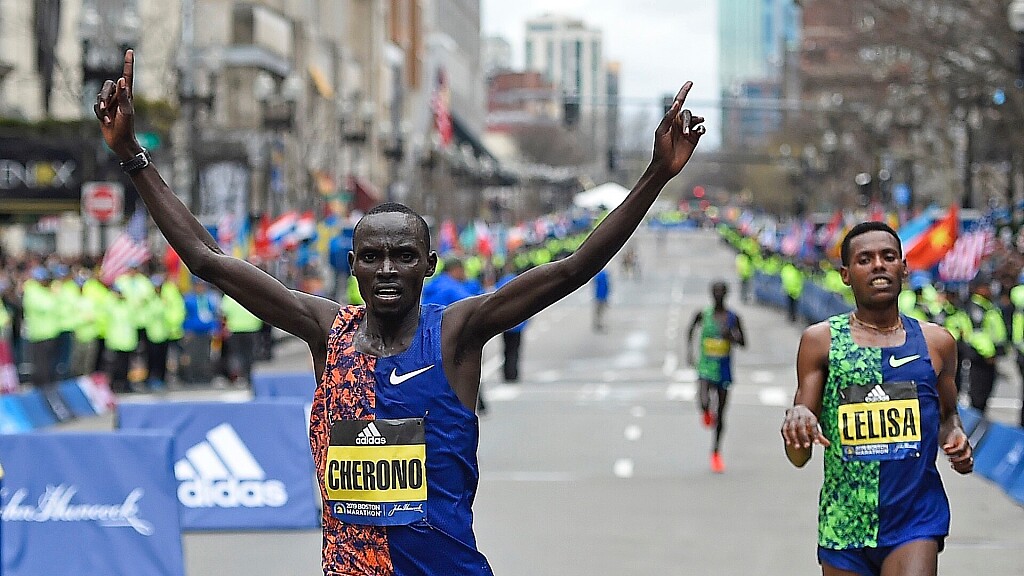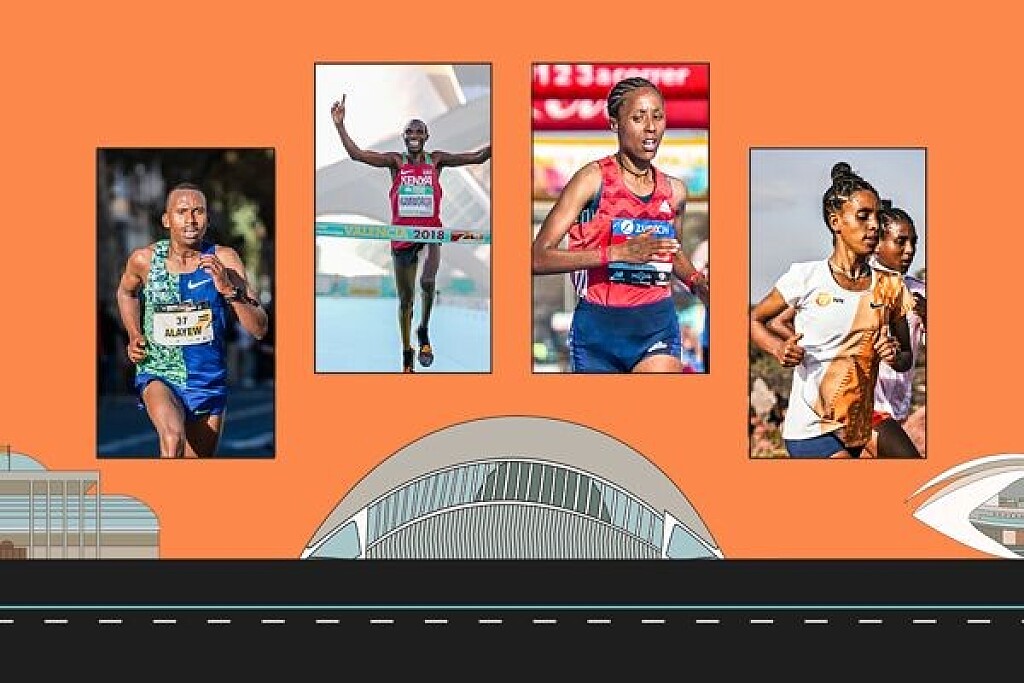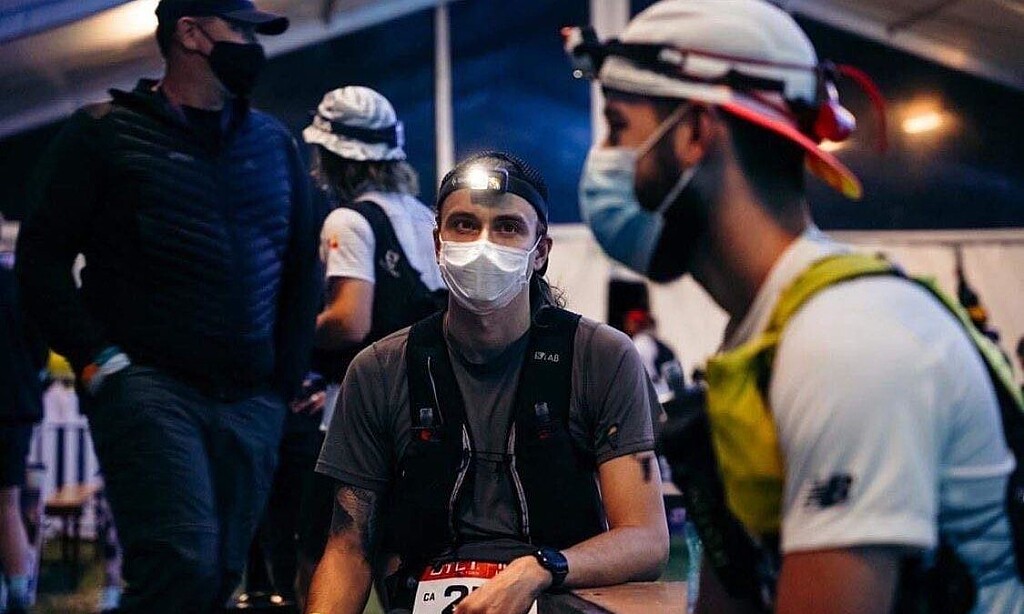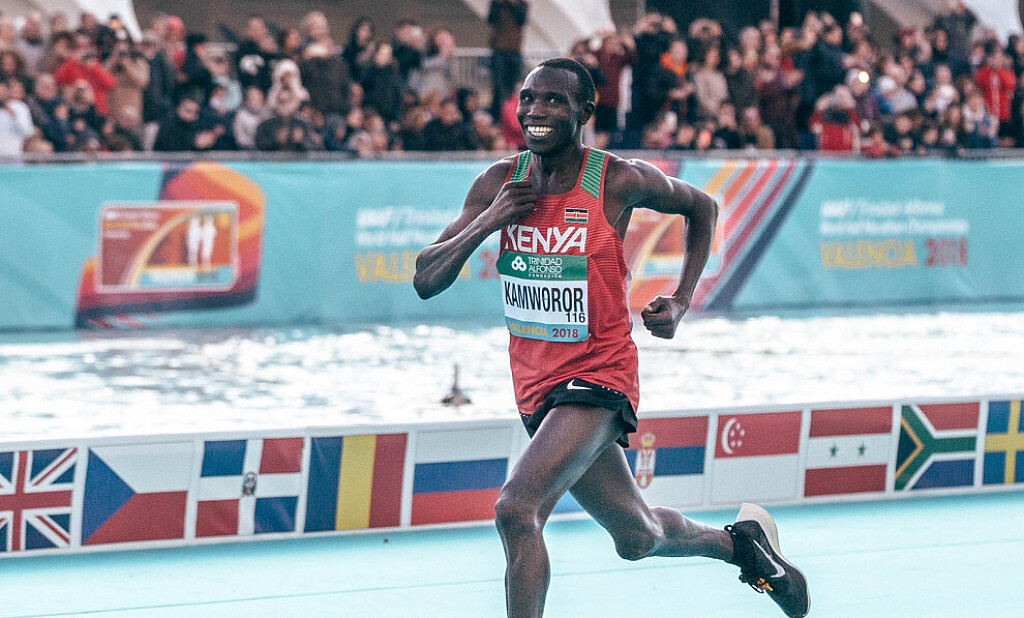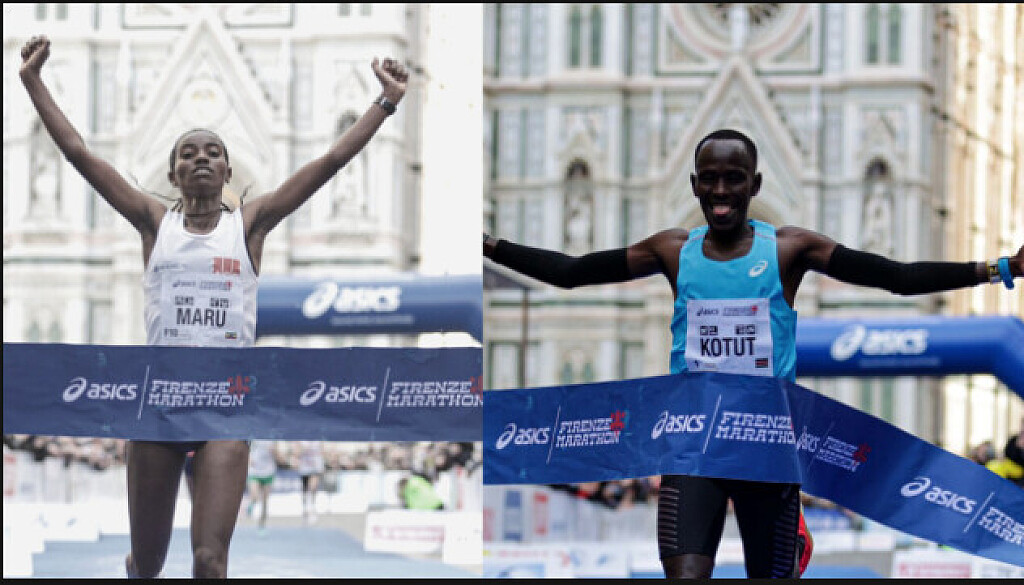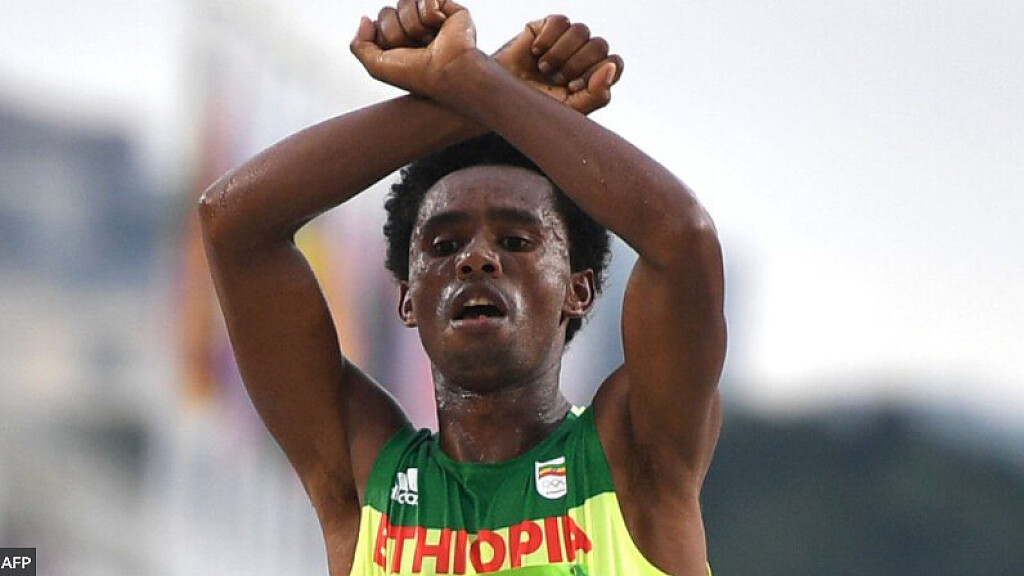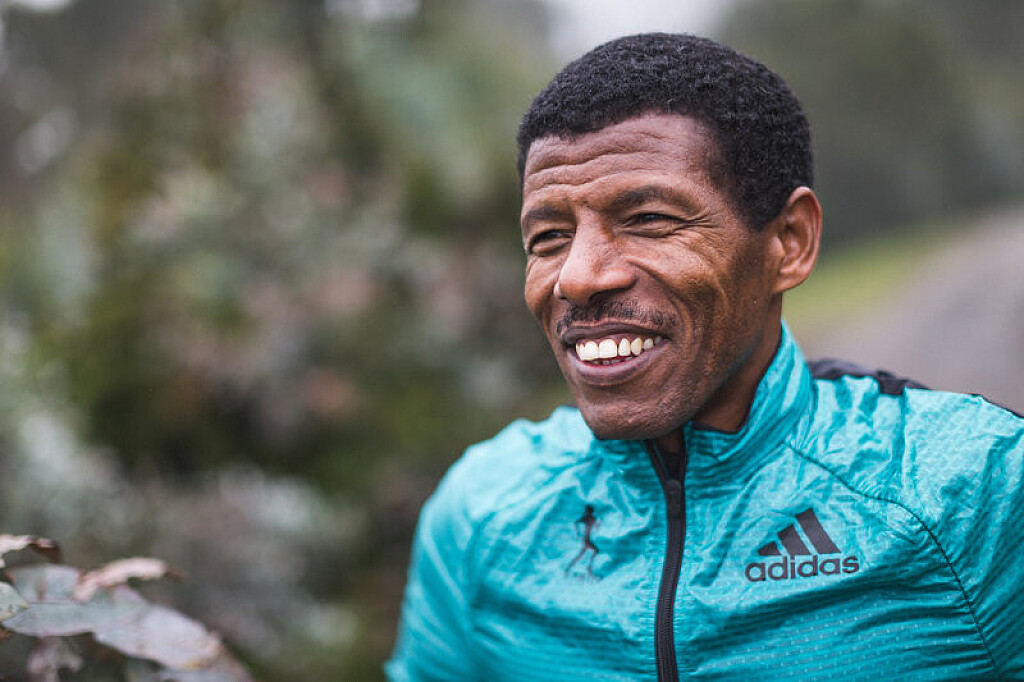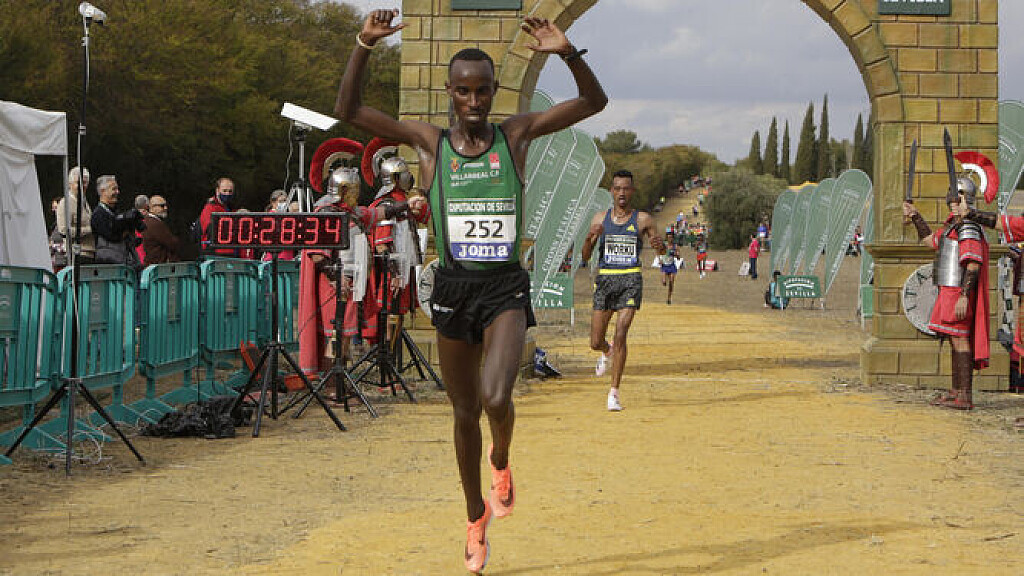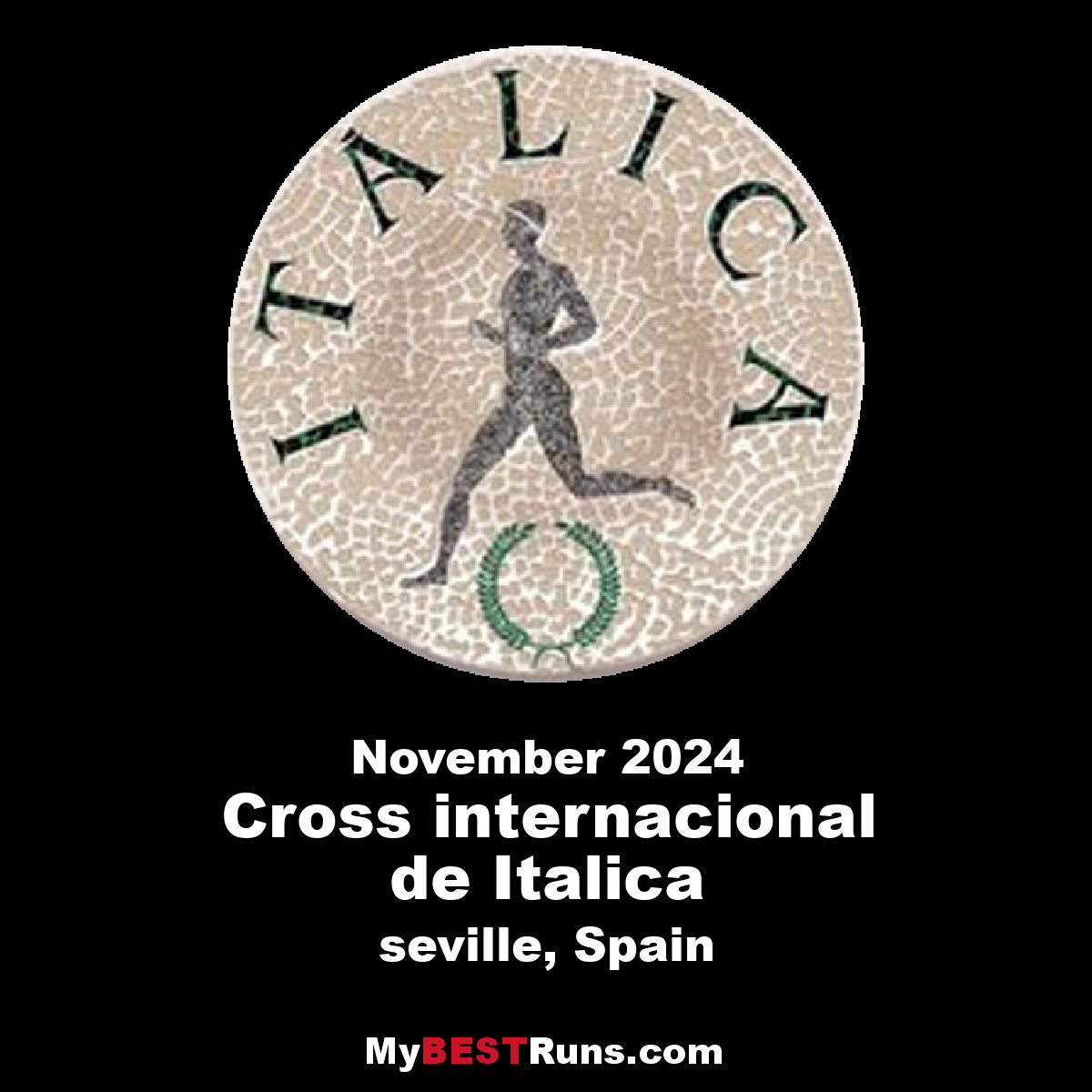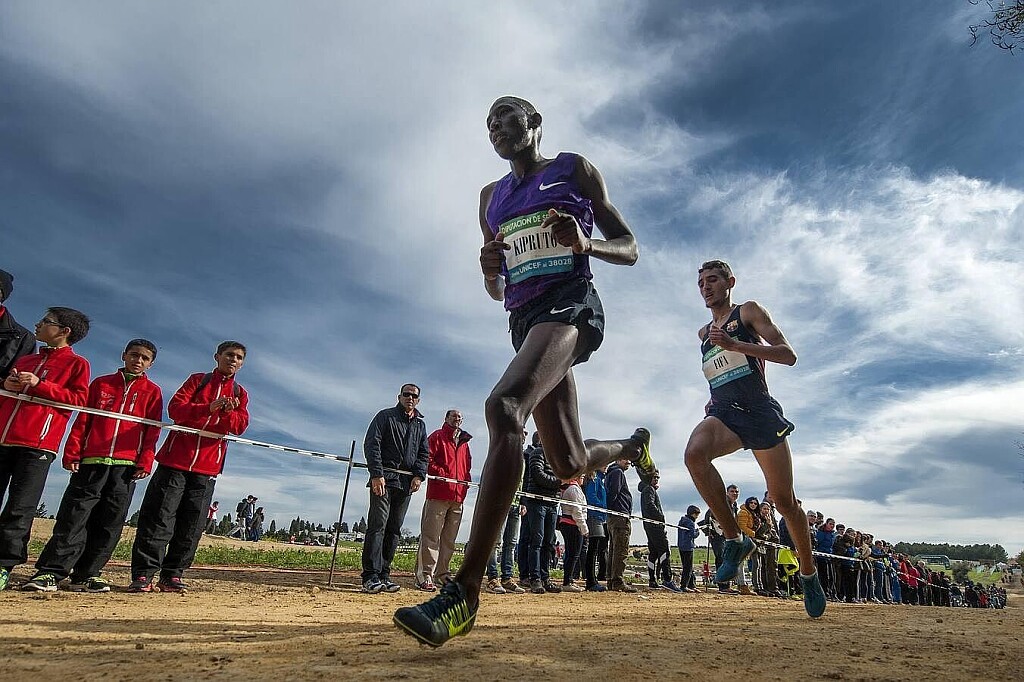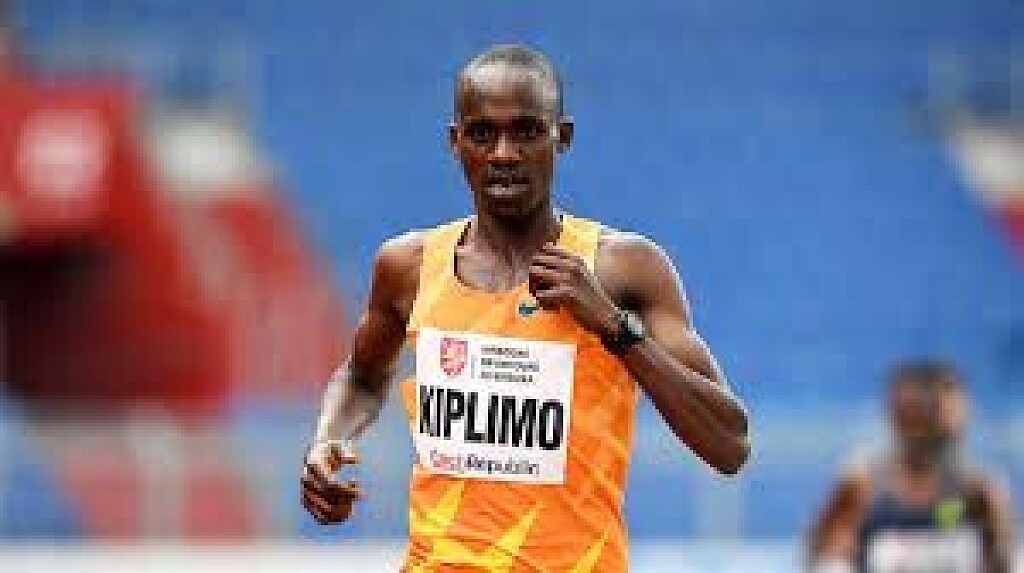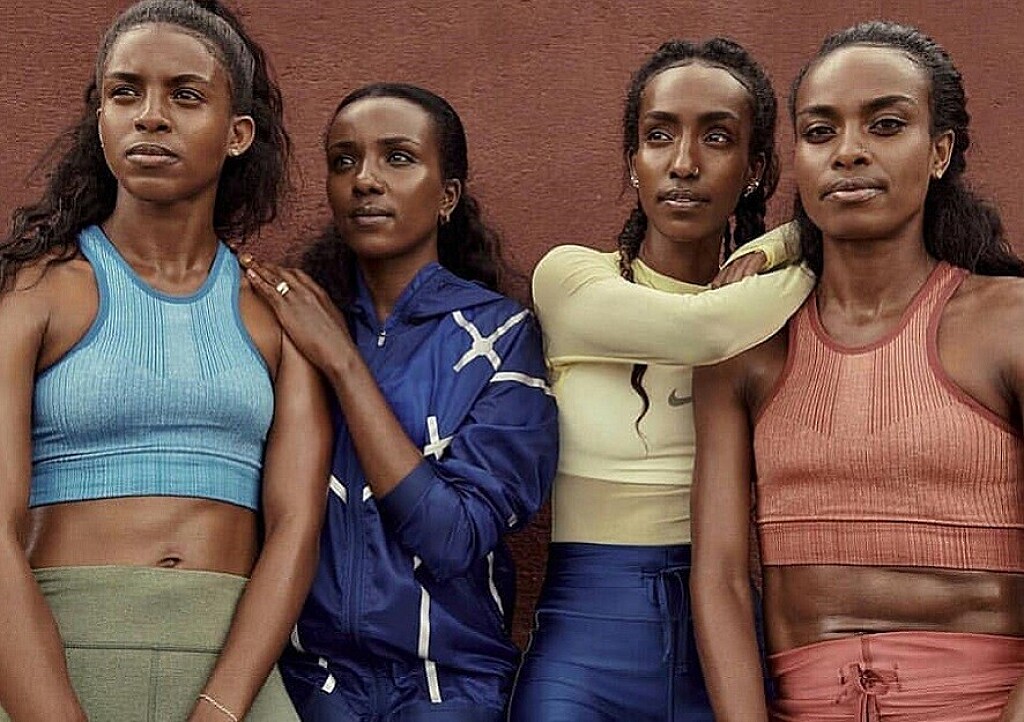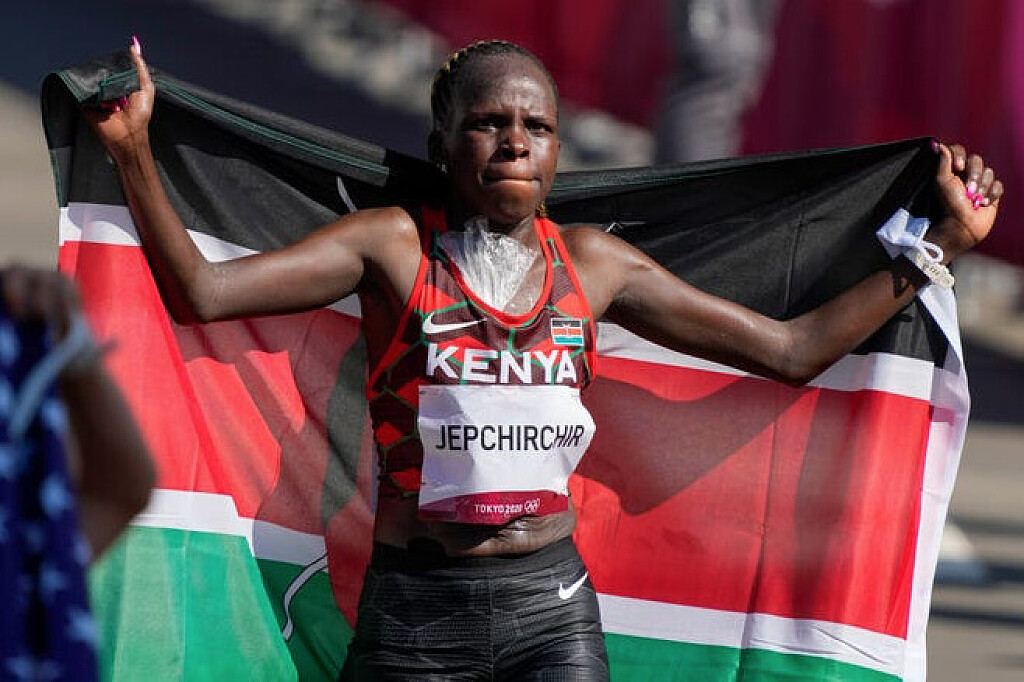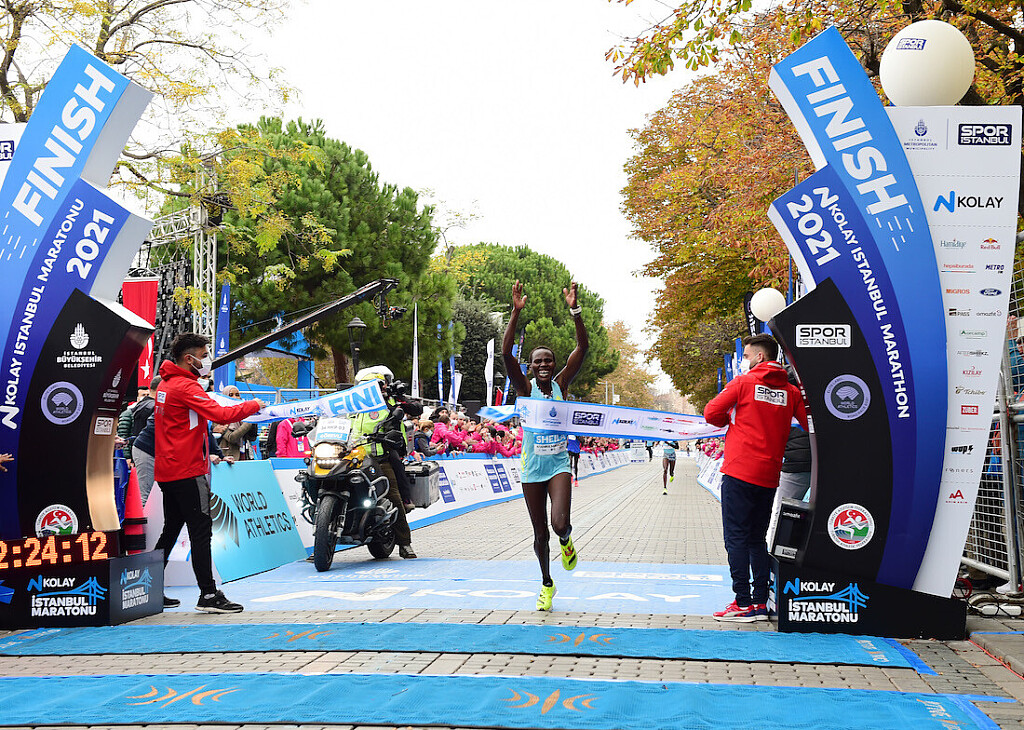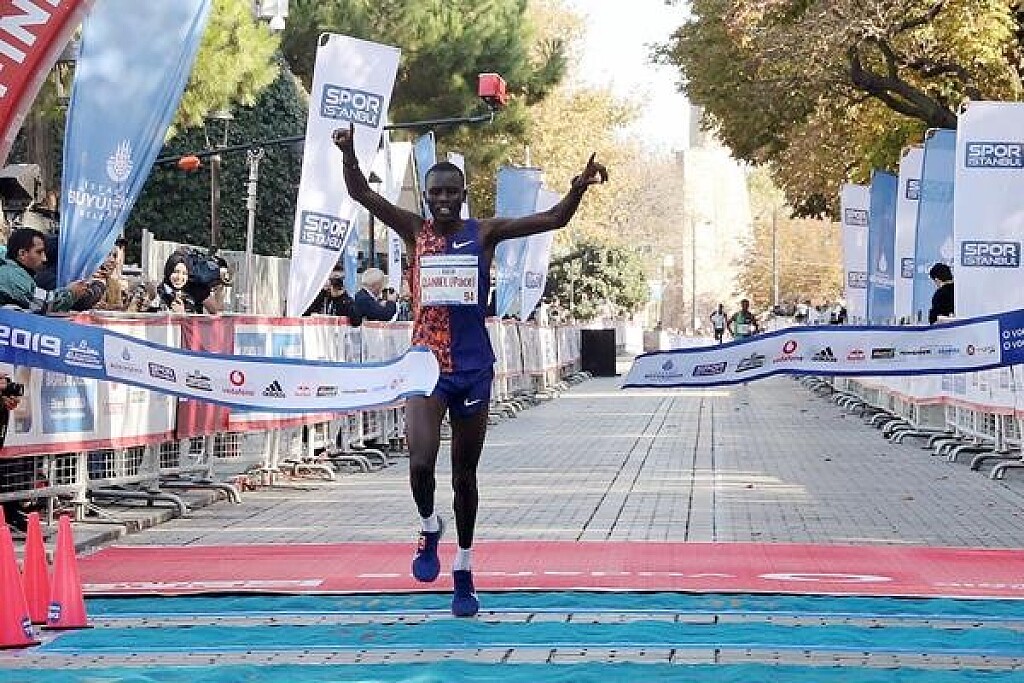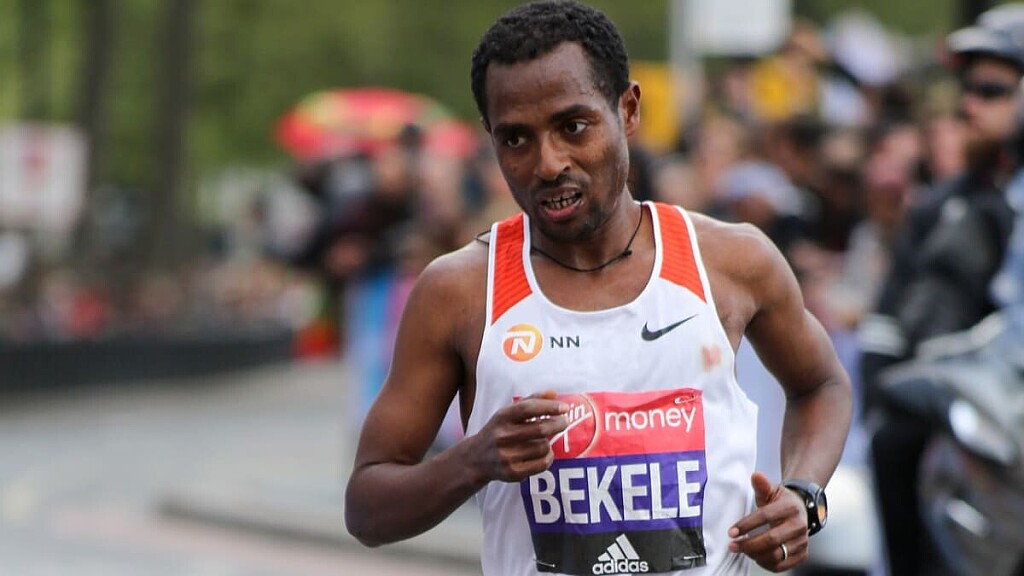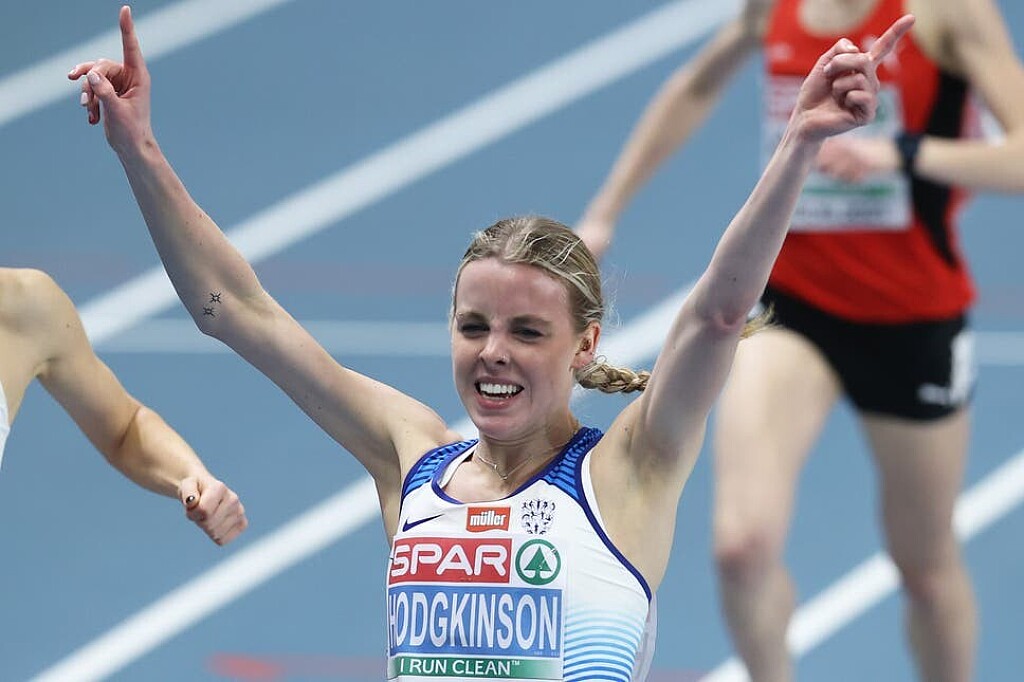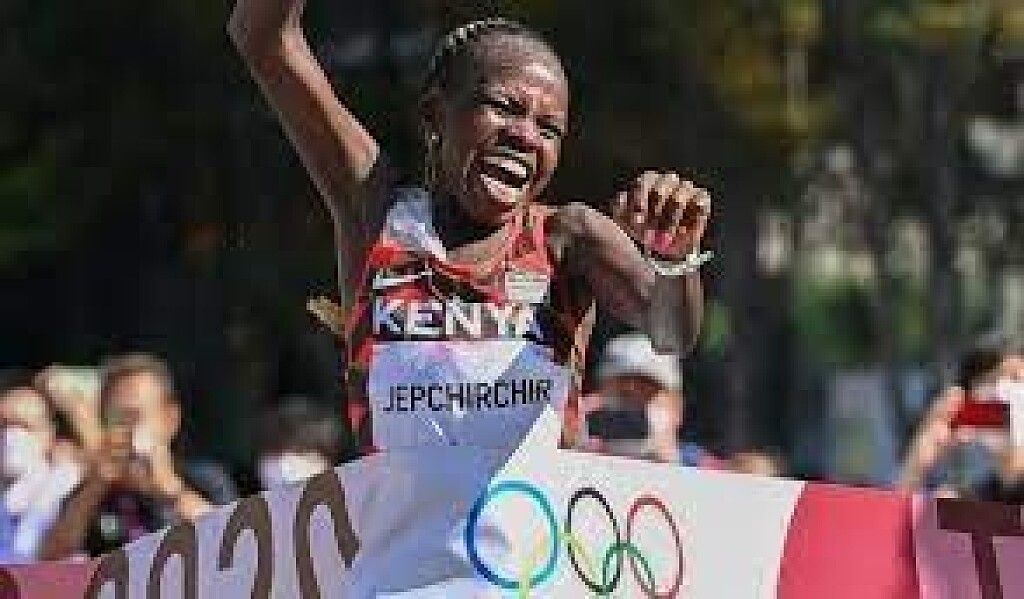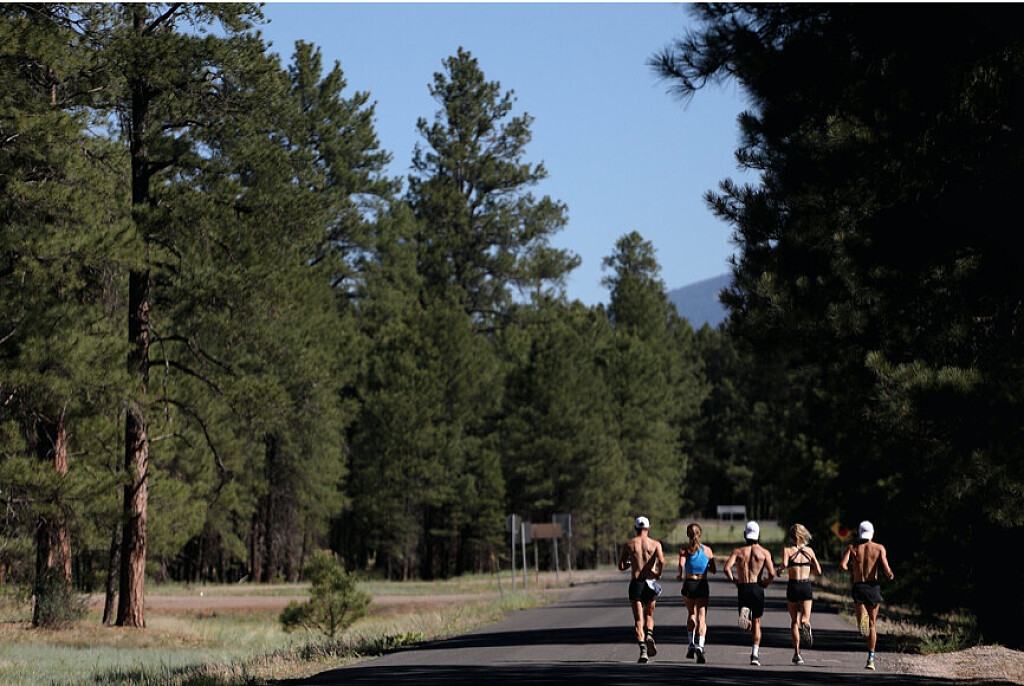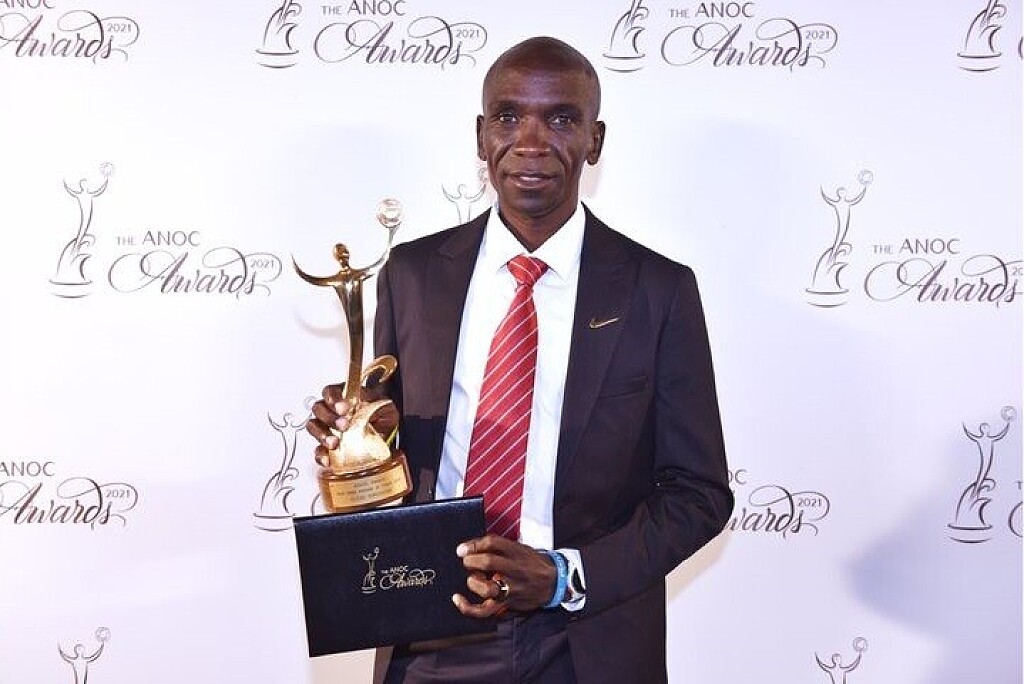Running News Daily
Running News Daily is edited by Bob Anderson. Send your news items to bob@mybestruns.com Advertising opportunities available. Train the Kenyan Way at KATA Kenya and Portugal owned and operated by Bob Anderson. Be sure to catch our movie A Long Run the movie KATA Running Camps and KATA Potato Farms - 31 now open in Kenya! https://kata.ke/
Index to Daily Posts · Sign Up For Updates · Run The World Feed
Search Results for ethiopia
Today's Running News
Inaugural world 50km records ratified
Women’s world 50km record (mixed race)2:59:54 Desiree Linden (USA) Dorena Lake USA 13 April 2021Men’s world 50km record 2:42:07 Ketema Negasa (ETH) Port Elizabeth RSA 23 May 2021Women’s world 50km record (women-only race)3:04:24 Irvette van Zyl (RSA) Port Elizabeth RSA 23 May 2021The 50km performances achieved by Desiree Linden, Ketema Negasa and Irvette van Zyl in 2021 have been ratified as inaugural world 50km records.
Given the increasing popularity of 50km road races, the decision to add the distance to the list of events for which world records are recognised was made at the 225th World Athletics Council meeting in Tokyo in July.
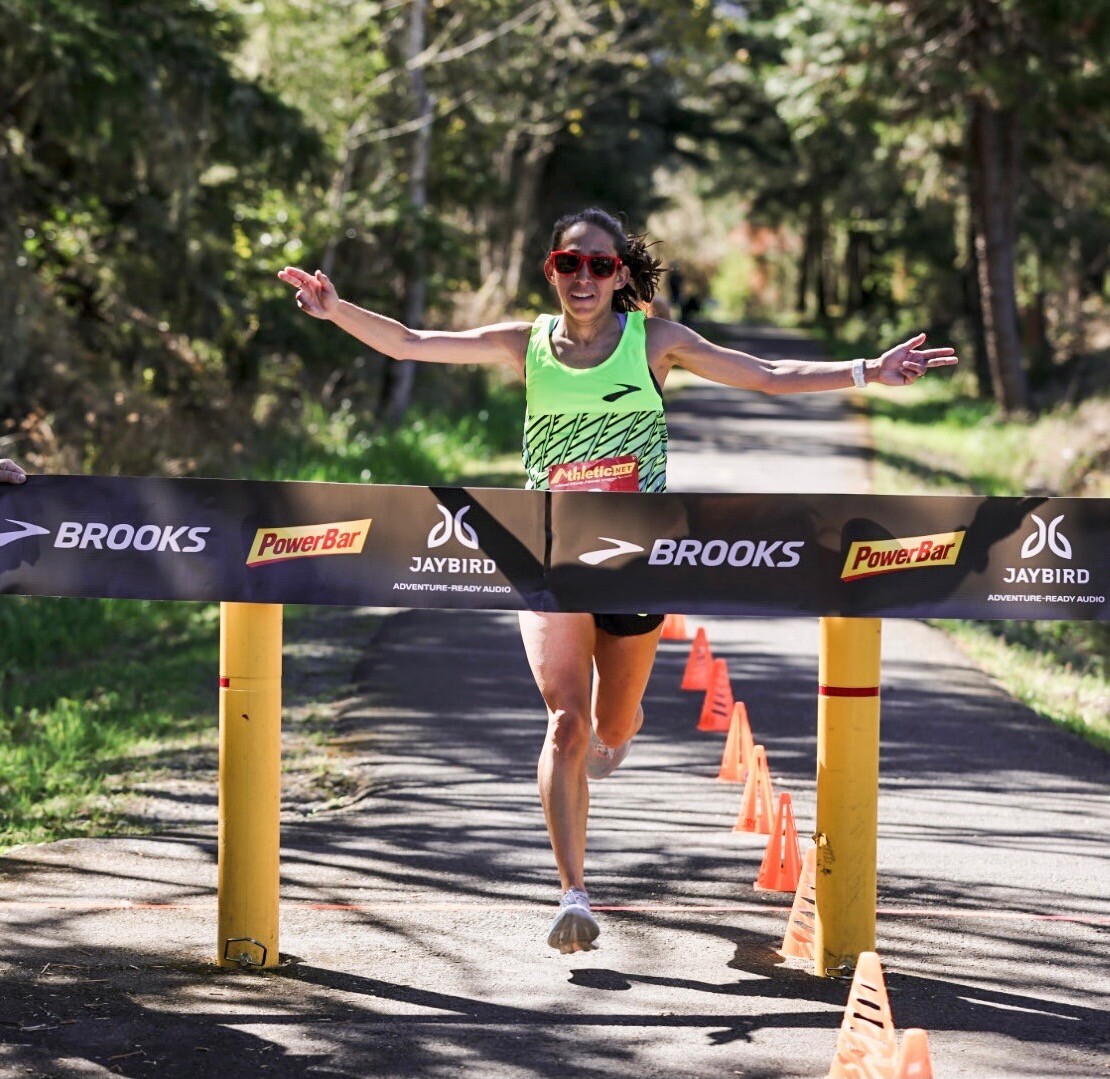
The best legitimate performances as at 1 January 2022 – provided they met the minimum standards of 2:43:38 for men, 2:59:54 for women in a mixed race and 3:07:20 for a woman in a women-only race – were eligible for record ratification.
As a result, the 2:42:07 recorded by Ethiopia’s Negasa and the 3:04:24 run by South Africa’s Van Zyl, both in Port Elizabeth in May, plus the 2:59:54 achieved by the USA’s Linden in a mixed race in Oregon in April, have been ratified as world 50km records.
Linden’s performance came at the Brooks Running 50km & Marathon on 13 April 2021, when she became the first woman to run 50km in under three hours. To achieve it, the 2018 Boston Marathon champion averaged at a pace of 3:35 per kilometre, clocking 1:15:47 at the half-marathon mark.
The following month, on 23 May 2021, Negasa and Van Zyl both lined up for the Nedbank Runified Breaking Barriers 50K. Negasa went on to race at an average pace of 3:15 per kilometre to achieve his winning time of 2:42:07, while Van Zyl clocked 3:04:24 after averaging at a kilometre pace of 3:41.
(01/30/2022) ⚡AMPby World Athletics
Ethiopian Senbere Teferi set for Agnes Tirop Memorial race
Ethiopia's Senbere Teferi has become the latest international athlete to confirm her participation to next month's Agnes Tirop Memorial World Cross Country Tour.
She joins compatriot world 5,000m and 10,000m record holder Letesenbet Gidey, who is currently training Eldoret and Djibouti’s Ayanleh Souleiman.
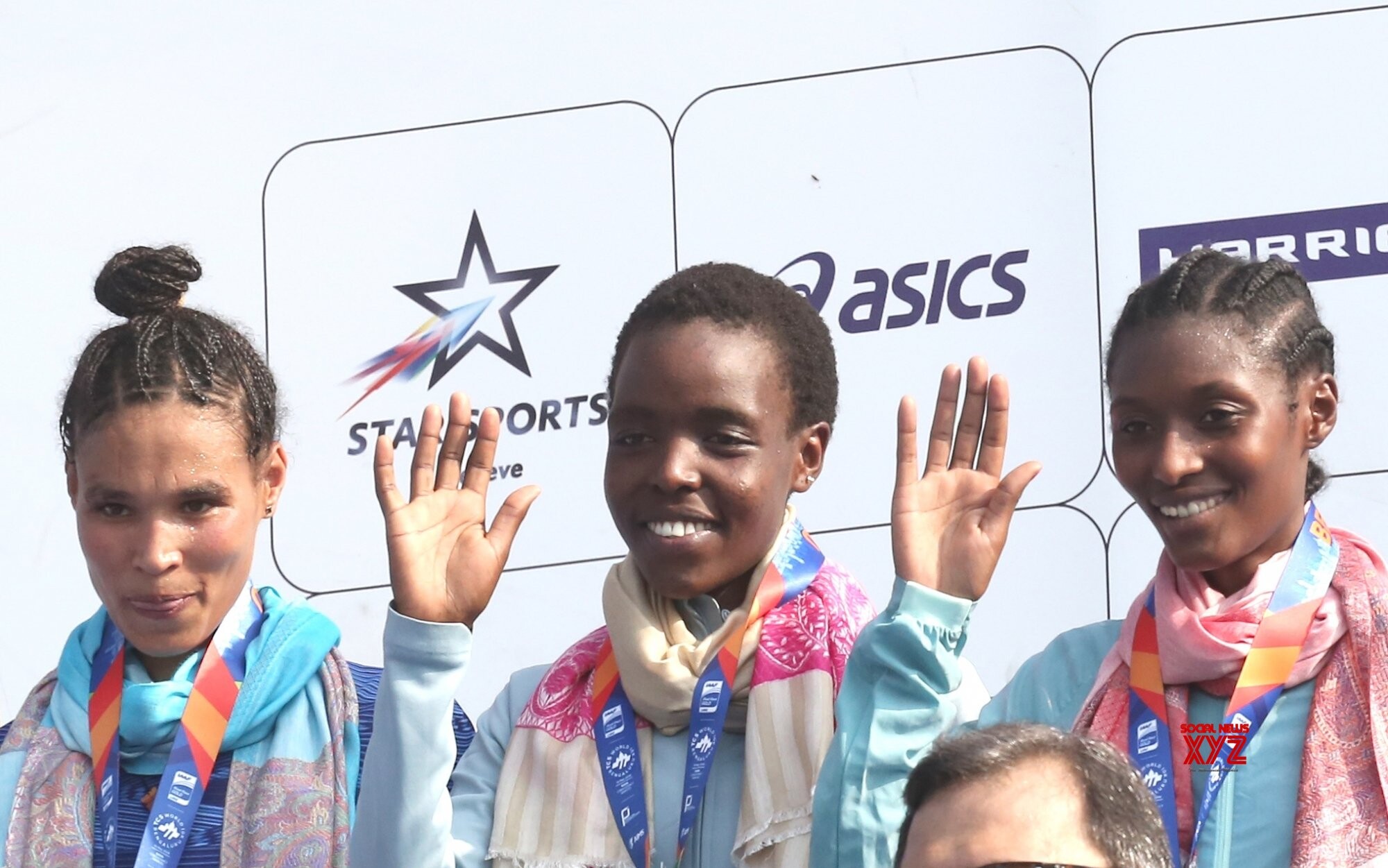
Kenyan Geoffrey Kamworor will also take part in the race set for February 12 at Lobo Village in Eldoret, Uasin Gishu County.
Teferi is keen to compete in honor of her departed best friend Agnes Tirop, who was found murdered in her home in Iten, Elgeyo Marakwet County on October 13 last year.
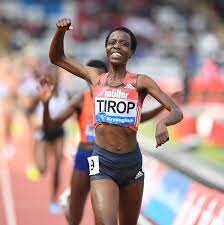
The estranged lover of the 2015 World Cross Country Championships winner, Ibrahim Rotich, is in police custody after denying murder charges.
In an interview with Nation Sport during the Great Ethiopian Run in Addis Ababa over the weekend, Tefere said she was saddened by Tirop’s cruel murder.
She recalled how they became good friends in 2015 when Tirop beat her during the World Cross Country Championships in China where she bagged silver behind the Kenyan.
Since then and they would always talk over the phone for long periods and were both managed by Gianni Demaonna.
“I was touched by the death of Tirop who was my best friend and shared a lot with in terms of competition. Losing such a nice friend in such a manner was really sad and I hope her family will get justice.
I will be starting my season during the Memorial Agnes Tirop Cross Country Tour in Eldoret, Kenya and running there is special for me because I want to honor my departed sister.
We always had a good relationship when we competed because we came from one continent and when a Kenyans win we celebrate, the same way we would when an Ethiopian wins," said Tefere.
She is looking forward to meet some of her competitors when she lands in Kenya in the next few days.
“I have never been to Kenya but I’m looking forward to meet some of the athletes who train there and get to share their experiences. I hear it is a nice place to train,” she added.
She is hoping to use the race to prepare for the World Championships to be held in USA later this year.
“The race in Kenya will gauge my preparations this season but my target is to compete in the 10,000m race where I’m targeting to be in the podium after emerging in sixth position in 2019 during the World Championships in Doha, Qatar,” said Tefere.
During the 2020 Tokyo Olympic Games, Tefere finished 10th in the 5,000m won by Dutch’s Sifan Hassan with Hellen Obiri settling for silver and Ethiopia’s Gudaf Tsegay winning bronze.
(01/25/2022) ⚡AMPby Bernard Rotich
World half marathon bronze medalist Yalemzerf Yehualaw breaks race record at Great Ethiopian Run
Yalemzerf Yehualaw opened her 2022 season in spectacular style by claiming victory at the Total Energies Great Ethiopian Run 10km, taking 38 seconds off her own race record with 31:17.
Her winning time is the fastest 10km ever recorded at altitude, with Addis Ababa standing 2350m above sea level. Gemechu Dida won a close men's race in 28:24, just five seconds shy of the long-standing race record.
Yehualaw, who set the previous event record of 31:55 in 2019, came into the race eager to impress after having to withdraw from the Valencia 10km just two weeks ago. Today she ran a smart race, making her break from long-time leader Girmawit Gebregziabiher, the 2018 world U20 5000m bronze medalist, just past the 7.5km mark after cresting the hill near the National Palace.
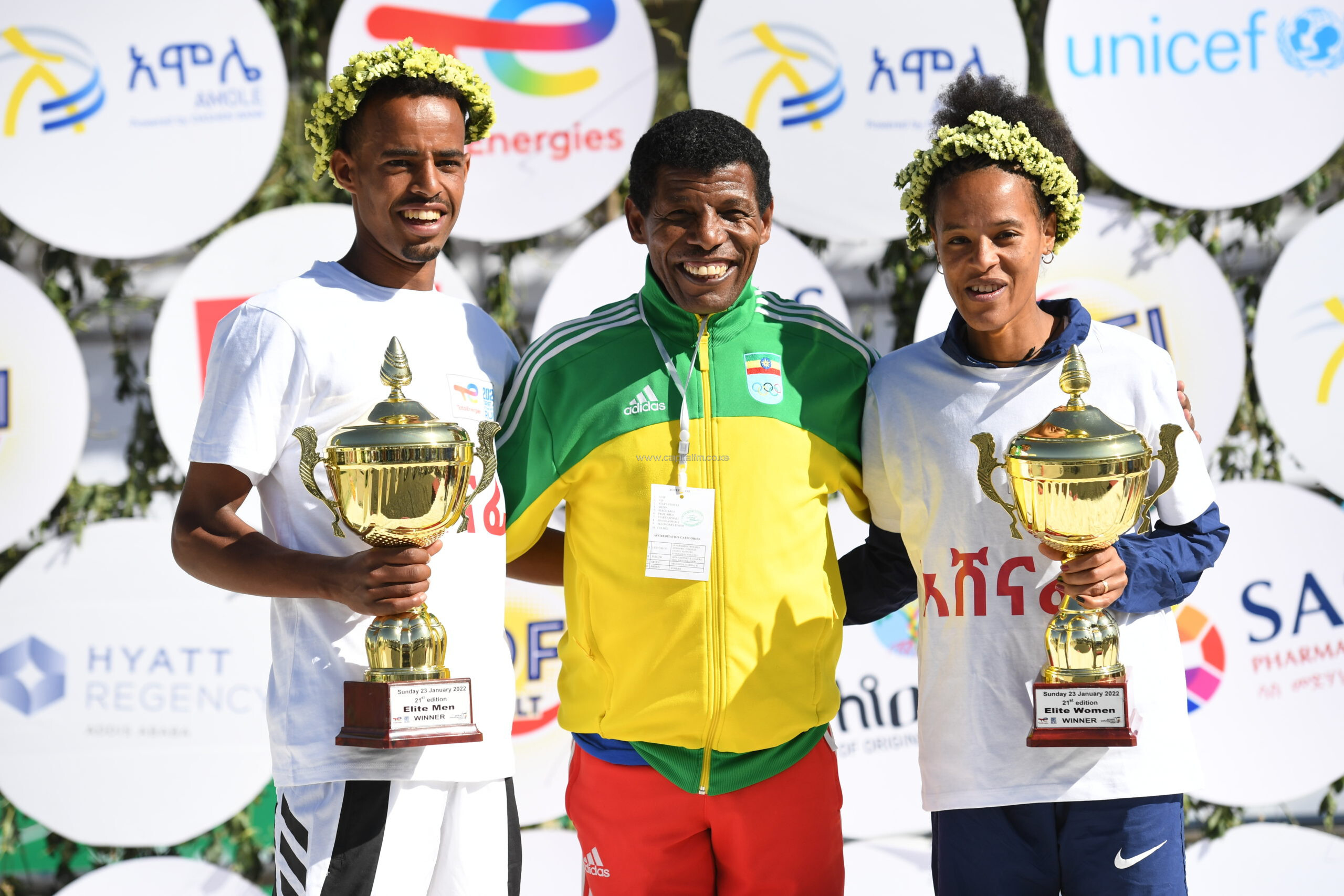
At the 9km turn at Urael Church, Yehuawlaw accelerated dramatically and pulled clear of her rival, cruising to the finish line to win by 12 seconds from Gebregziabiher, who clocked 31:29. Double world U20 medalist Melknat Wedu, still just 17 years of age, finished third in 31:45.
The men’s race was much closer, with six athletes still in contention in the final 500 meters. In the end it was Dida who took a surprise victory over former Dubai Marathon champion Getaneh Molla with Boki Diriba finishing third as two seconds separated the podium finishers.
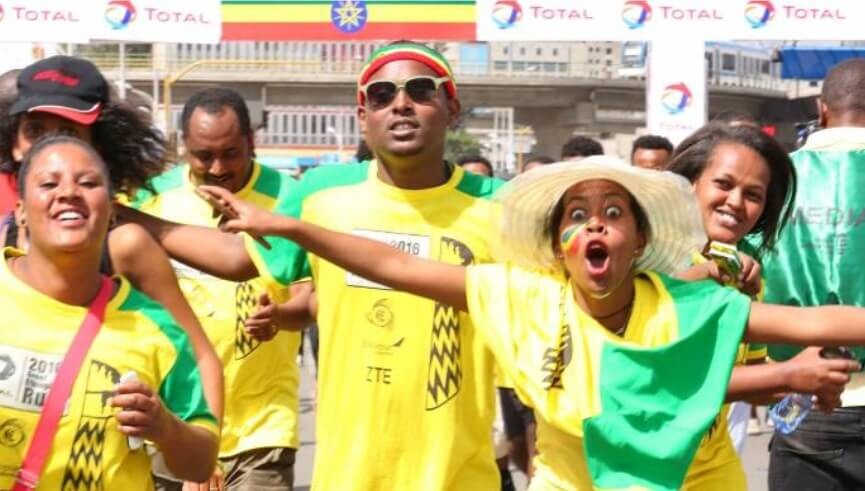
The highest-placed non-Ethiopian athlete was Kenya’s Cornelius Kibet Kemboi, who finished sixth in 28:39. A total of 17,600 runners finished the mass race.
Leading results
Women
1 Yalemzerf Yehualaw (ETH) 31:17
2 Girmawit Gebrzihair (ETH) 31:29
3 Melknat Wedu (ETH) 31:45
4 Gete Alemayehu (ETH) 32:06
5 Bosena Mulate (ETH) 32:17
6 Hawi Feyisa (ETH) 32:18
7 Birtukan Wolde (ETH) 32:22
8 Anchinalu Desse (ETH) 32:38
9 Mebrat Gidey (ETH) 32:42
10 Ayenaddis Teshome (ETH) 32:49
Men
1 Gemechu Dida (ETH) 28:24
2 Getaneh Molla (ETH) 28:25
3 Boki Diriba (ETH) 28:26
4 Moges Tuemay (ETH) 28:31
5 Getachew Masresha (ETH) 28:33
6 Cornelius Kibet Kemboi (KEN) 28:39
7 Teresa Ggnakola (ETH) 28:43
8 Solomon Berihun (ETH) 28:55
9 Ashenafi Kiros (ETH) 28:59
10 Antenayehu Dagnachew (ETH) 29:05.
(01/24/2022) ⚡AMPby World Athletics
the Great ethiopian 10k run
The Great Ethiopian Run is an annual 10-kilometerroad runningevent which takes place inAddis Ababa,Ethiopia. The competition was first envisioned by neighbors Ethiopian runnerHaile Gebrselassie, Peter Middlebrook and Abi Masefield in late October 2000, following Haile's return from the2000 Summer Olympics. The 10,000 entries for the first edition quickly sold out and other people unofficially joined in the race without...
more...2022 Dubai Marathon edition will not take place in January but hopefully in December due to COVID-19
The 2022 Dubai Marathon has been postponed, organizers told LetsRun.com last week. Typically staged in late January, the 2021 edition was cancelled due to COVID-19 and the 2022 edition will not take place in January either as local health and safety guidelines — including a temporary ban on flights from Kenya and Ethiopia — make it difficult to stage the race.
First held in 2000, Dubai began offering a $250,000 first-place prize in 2008 and a $1 million bonus for a world record. Though the world record bonus no longer exists and the prize money has been cut, the $100,000 reward for first place remains one of the biggest paydays in the sport.
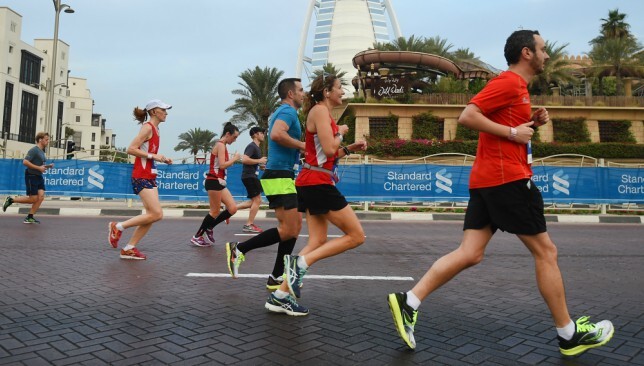
As of now, Pace Events, the organizers and promoters of the Dubai Marathon, have set a tentative date of December 10 for the postponed 2022 edition. That would put the race in competition with the Abu Dhabi Marathon, a rival race begun in 2018 which staged its 2021 edition on November 26.
Pace Events provided the following statement to LetsRun.com on the 2022 Dubai Marathon:
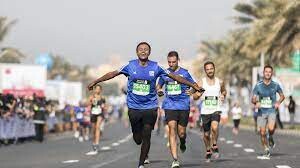
On behalf of Pace Events FZ LLC, we trust you had a good new year and are looking forward to a brighter future for running events. As the organisers of the Dubai Marathon for 21 consecutive years since its first edition in 2000, Pace Events anticipates a time when we can all come together and have another World Athletics-sanctioned Marathon and mass participation event in the city of Dubai.
Unfortunately, because of the current situation and adhering to the strict local health and safety guidelines, it still remains impossible for Pace Events to reunite the running community in Dubai with its iconic Marathon in the early part of 2022. Races organised by our team normally attract well in excess of 25,000 runners from all over the world and until we can safely bring together athletes, stakeholders, sponsors, partners and officials we have to wait for circumstances to change.
Naturally, we are disappointed to have to wait longer but we hope to be able to put on a bigger and better event later this year. The date we have set for the return is December 10, 2022.
For now, we can only sit tight and look forward to seeing everyone on the start line…
(01/21/2022) ⚡AMPby Jonathan Gault
Dubai Marathon
In its relatively brief history (the race was first held in 2000), the Dubai Marathon has become one of the fastest, most respected and the most lucrative marathon in the world in terms of prize money. Each year thousands of runners take to the roads in this beautiful city in the United Arab Emirates (UAE) for this extraordinary race starting...
more...Ethiopia's Selemon Barega returns to Lievin with world record target
Organizers have announced that Ethiopia's Selemon Barega is to return to the Meeting Hauts-de-France Pas-de-Calais – a World Athletics Indoor Tour Gold meeting – in Lievin on 17 February, to tackle the world indoor 3000m record.
The world indoor silver medalist moved to third on the world indoor all-time list with his performance in Lievin last year, the 21-year-old clocking 7:26.10 to finish second behind his compatriot Getnet Wale who ran 7:24.98 to just miss Daniel Komen’s long-standing world record of 7:24.90.
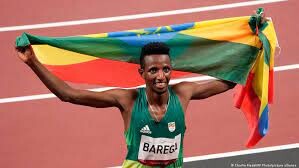
Barega went on to win over 1500m at World Indoor Tour meetings in Torun, where he set an indoor PB of 3:32.97, and Madrid, before becoming the Olympic 10,000m champion in Tokyo.
Barega has also been announced for the Copernicus Cup in Torun on 22 February, where he is set to be joined by Wale and Lamecha Girma, who finished third behind his compatriots in Lievin last year, clocking 7:27.98. Before that race, just six men had bettered 7:30 for 3000m indoors. Now the figure stands at 10, with the fourth-place finisher in Lievin last year, Berihu Aregawi, also dipping under the mark with 7:29.24.
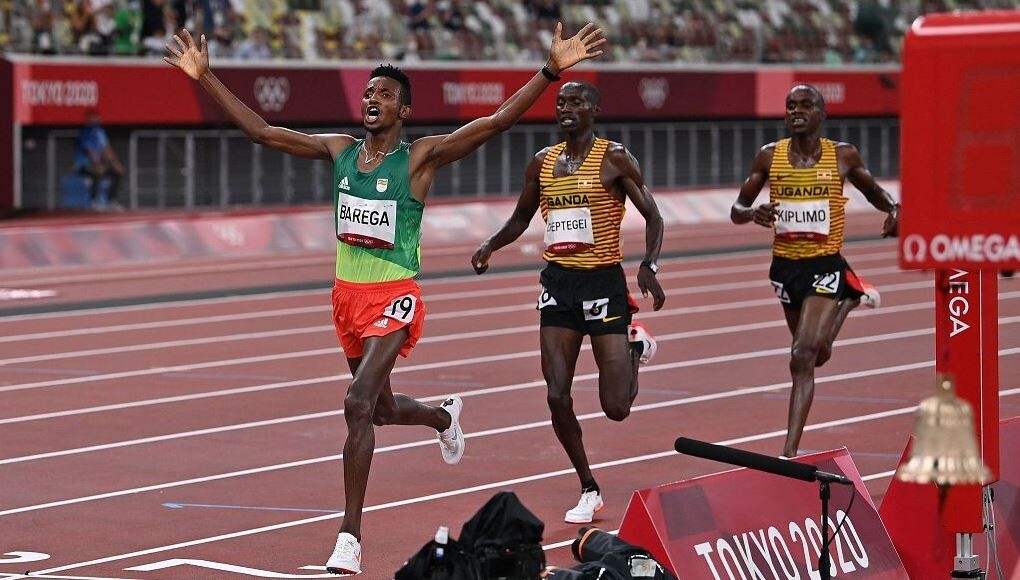
Also among those returning to Lievin is Gudaf Tsegay, who broke the world indoor 1500m record last year and this time races the mile.
Other athletes announced for the meeting include world indoor 60m hurdles record-holder Grant Holloway, Olympic 100m champion Marcell Jacobs and Olympic 1500m champion Jakob Ingebrigtsen.
(01/18/2022) ⚡AMPby World Athletics
Rory Linkletter breaks the Canadian half-marathon record at Houston, Linkletter ran 1:01:08 for eighth place
The Houston Half-Marathon took place Sunday morning as part of the Houston Marathon weekend, and Rory Linkletter lowered Jeff Schiebler’s 23-year-old Canadian half-marathon record of 61:28, crossing the finish line in 61:08 for eighth place. His compatriot, Ben Flanagan, was only half a minute behind him, finishing 12th in 61:38.
Going into the race, both athletes had their eyes on Schiebler’s record, which hasn’t been touched in more than two decades. Linkletter recently left the NAZ Elite track club to train with American Marathon record-holder, Ryan Hall, citing stagnation in training as his reason for making the change. His decision seems to have paid off, and he ran a huge PB Sunday morning to become the new Canadian record-holder. The 25-year-old’s previous record of 61:44 was also run on the Houston course just last year.

Linkletter has enjoyed plenty of success lately, and his most recent result was a second-place finish at the California International Marathon in a new personal best time of 2:12:52.
Flanagan was also on the hunt for the Canadian record this Sunday, and came agonizingly close, running just 10 seconds behind Schiebler’s time. The 27-year-old has also had a lot of success recently, winning the Canadian 10K championships in Toronto in October and taking the title in the Manchester Road Race in November. “I am looking forward to competing,” he told Canadian Running ahead of the race. “The plan is to run conservatively to tackle the Canadian record. It’s engraved in my head.”
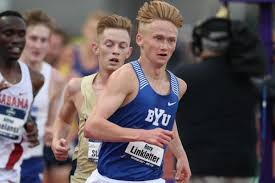
While he didn’t achieve his goal, Flanagan ran a very strong race and we will have plenty more opportunities to watch Flanagan on the roads. He will be running a few 5,000m and 10,000m races this spring to secure a spot on Team Canada at the 2022 World Championships in Eugene, Ore., but tells us that he will be stepping up to the marathon in hopes of qualifying for the Paris 2022 Olympics.
Ethiopia’s Milkesa Tolosa won the race in 1:00:24, followed by Kenya’s John Korir in second in 1:00:27 and Wilfred Kimitei of the U.K. in third in 1:00:44.
(01/17/2022) ⚡AMPby Brittany Hambleton
Aramco Houston Half Marathon
The Chevron Houston Marathon provides runners with a one-of-a-kind experience in the vibrant and dynamic setting of America's fourth-largest city. Renowned for its fast, flat, and scenic single-loop course, the race has earned accolades as the "fastest winter marathon" and the "second fastest marathon overall," according to the Ultimate Guide to Marathons. It’s a perfect opportunity for both elite athletes...
more...What it takes to become a Kenyan distance champion
For several generations now, Kenya has produced many of the world’s greatest distance runners.
Many athletes from elsewhere in the world, meanwhile, have tried to tap into the secrets of Kenya’s success as they try to play catch-up – quite literally – with the east African nation that continues to churn out global medallists and world record-breakers.
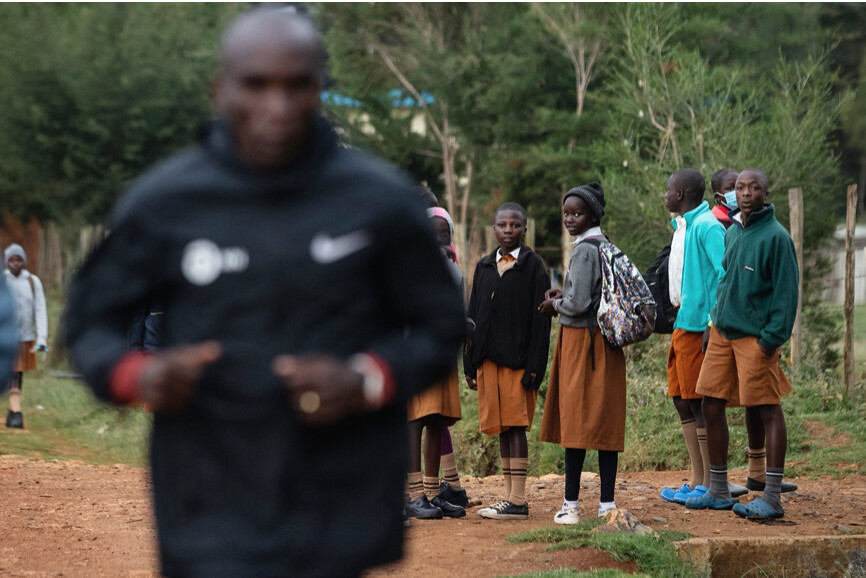
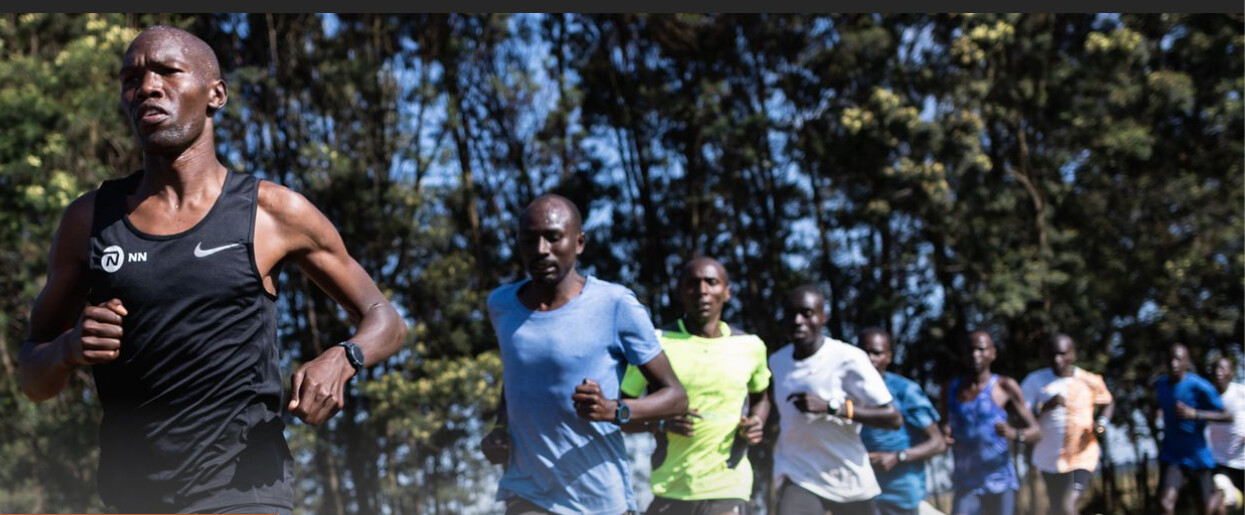
The truth is, there is no one single reason why Kenya is so dominant in distance events. It’s more down to a combination of factors, many of which were explained during a recent trip to the NN Running training camp in Kaptagat, about 24km east of Eldoret, where the likes of Eliud Kipchoge trains for 11 months of the year.
A way of life
There are few countries where people live and breathe athletics, and where the No.1 Olympic sport can claim to be more popular than football, filling entire stadiums even for age-group championships.
And while Kenya isn’t the only country in the world where kids run long distances to get to school, running has a whole different meaning to many people in the country.
Running is something that comes naturally to us as it’s something that has been part of our lifestyle since we were born,” says three-time world half marathon champion and two-time New York City Marathon champion Geoffrey Kamworor. “As a kid, I used to run from home to my school three kilometres away back and forth each day, so you end up running sometimes 12 kilometres a day as a teen without even realising it.”
Beyond being a means to an end, there is also a genuine love for running among the Kenyan population.
“As a kid, I would always go and watch athletics competitions when not at school and I enjoyed watching people competing,” added Kamworor. “It awoke my passion for running, especially seeing people cross the finish line and winning a trophy. In high school, it was always a fun and proud moment to represent your class and win a cup. I found it very encouraging.”
Having running embedded into day-to-day life sets Kenya apart from many other nations. But it’s just one of the many reasons why it is known as being the ‘home of the champions’.
Genetics
Simply running to school each day doesn’t automatically turn everyone into a world-class athlete. Genetics, as it does for every elite athlete, likely play a significant part.
Many people in the Rift Valley, where most of Kenya’s top distance runners originate, belong to the Kalenjin tribe. When compared to other Kenyan tribes, Kalenjin people are often described as having good natural running attributes: namely lean bodies and long legs.
Kipchoge, for example, isn’t particularly tall (1.67m / 5ft 6in), but the muscles on his legs are incredibly lean, his body fat percentage is low, and the strength in his feet make it appear as though he bounces along the grass.
But attributing all of Kenya’s success to just their genetics would be a gross over-simplification.
Conditions
Another element that helps Kenyan athletes in their training and preparation is the unique climate and surroundings in this part of the country. It also probably explains why there are so many training camps between Kaptagat and Iten, and why some people refer to it as the ‘Hollywood of elite runners’.
This region is located at 2500 metres above sea level, which, given the lack of oxygen, helps athletes produce a higher concentration of red blood cells and haemoglobin when training. This, in turn, gives runners an advantage when they return to lower altitudes to race.
The Eldoret region is also full of endless forests and dirt roads for athletes to use when running, while the area also enjoys a temperate climate with daytime temperatures ranging between 22-26C (68-78F) throughout the year, dropping to 10-12C (50-53F) at night time. That, combined with the good air quality, makes the area something of a distance-running paradise.
But as Kenya’s economy continues to develop, so do the local villages and the wider region, meaning many of the local dirt paths are now being made into proper roads – which is great for facilitating transport and access from other points of the country, but less so for athletes seeking a run-friendly surface.
Athletes are adapting well to this evolving environment, though, while remaining in close contact with nature. The Kalenjin community, Kipchogeand Kamworor included, are running many tree-planting initiatives. “We evolve in a very natural environment which is a great advantage when it comes to training,” says Kamworor.
Patrick Sang, the 1992 Olympic silver steeplechase medallist and head coach at the Kaptagat training camp, explains how the new generation of running shoes can help counter the effects of running on harder roads.
“New running shoes help a lot because athletes can now do a lot more training on a hard surface and still recover on time to do their next hard session,” says Sang. “Overall, you can get more work done to help improve performance.”
Sleep, eat, train, repeat
Most world-class athletes are fully committed to their sport, but the elite runners at the Kaptagat training camp in particular take dedication to a whole new level.
Many of these athletes – including young mothers such as two-time Olympic 1500m champion Faith Kipyegon – have children who are at home during the week so that they can entirely focus on their training at the camp.
“Of course, it’s very hard but that’s the only way to be fully dedicated to being the best athlete you can and avoid any distraction,” said Kipyegon.
When not running, athletes at the Kaptagat training camp are focused entirely on other elements of their training, namely recovery and nutrition.
“When you are at the camp, your sole focus is on running and you are not distracted by anything else,” says Kamworor, father to five children, including young triplets. “You are away from your family, your wife and your kids during the whole week, and that makes you take your training very seriously as you are making sacrifices to achieve your goals. That’s the only way to be focused 100% on running and to give your very best.”
As in any walk of life, hard work and having the right mind-set are key to success. Kipchoge might be the most successful athlete at the camp, but Sang says that’s not just down to his talent. “Eliud isn’t the most gifted athlete within his training group but certainly the most dedicated,” Sang says of Kipchoge, who is always the first one ready for training and the last one to leave.
In an average week, athletes at the Kaptagat camp do one long run of 30km (once a month it will be 40km), which usually takes place early on a Thursday morning. Typical track sessions, meanwhile, would be something like 8x1600m (each rep completed in 4:40) and 8x400m (at an average of 65 seconds) on their local 380m cinder track.
“Have you seen him?” Sang says when watching Kipchoge train. “This guy is a machine.”
Athletes are religious in their approach to punctuality and producing their best effort in training. And other local athletes from outside the NN Running team are welcome to join in the sessions, provided they arrive on time. After all, no one wants to be playing catch-up with the likes of Kipchoge and Kamworor.
Community
The Kaptagat training camp is run entirely by the 25 athletes who live there for 11 months a year from Monday to Saturday morning before going back to spend quality time with their family, often in the big city of Eldoret. In and around the 12 training runs they do in a typical week, the resident athletes to everything at the camp.
“If you look at life at the camp, the one making bread is an athlete, the cleaning is done by the athletes, the one doing shopping for the camp is an athlete,” says Sang. “You don’t want athletes to live on another island.
“The whole idea is to make sure these athletes become well-rounded people. You wouldn’t want to help someone become a great athlete who lacks social skills or is out of touch with society.”
Kipchoge, whose wife and three children live just 45 minutes away from the training camp, could easily go and spend time with his family during his time off, but instead he chooses to stay at the camp with the rest of the group, monastically isolated from the rest of the world.
Kipchoge is rarely bored, too. When he’s not training or resting, he will be reading or working at the camp or reading.
The sense of community extends to caring about the environment. Every athlete at the camp gets a tree planted at the entrance as a welcome gesture and to symbolise their connection to nature. Some special guests to the camp – including Ethiopian legend Haile Gebrselassie – have also had a tree planted for them in Kaptagat.
Occasionally, athletes at the camp will give each other lessons, or they will engage in real debates around serious issues, helping them develop holistically as people.
Simplicity
Far away from the latest technological innovations you often hear about in other parts of the world, daily life at the camp is basic.
Upon entering the gates at the Kaptagat training camp, the 380m cinder track is located on the left. It has a slight incline on the first bend and a couple of cows as spectators, but it meets all their needs.
“A synthetic track isn’t needed for what we do and the way we train,” says Marc Roig, a former international runner from Spain, who now works as a jack of all trades for NN Running, acting as a fitness coach, physio, runner, mentor and pacemaker. “If our athletes need a synthetic track, they can go to the one in Eldoret an hour away.” In fact, there are just four synthetic tracks in the whole of Kenya, but it’s clearly not a barrier to producing top athletes.
The runners at the camp rarely lift weights or spend time stretching, but twice a week they will do core strength sessions. Instead of water, they drink mursik – a nutritious fermented milk – in the morning and Kenyan tea in the afternoon. And not a single drop of water during their 30km long run. “That’s okay,” says Sang. “They don’t need it.”
Within the camp itself, there is a TV room with a small library corner with a few books there for the athletes, a living room for their meals, the dormitory (one for women and another for men), a basic gym comprising a bike, a treadmill, some elastic bands and a light weightlifting bar (with maximum 40kg available) and a big blue plastic drum outside used for ice baths.
It’s all quite rudimentary, but they don’t need more, and it seems to work.
The only visible ‘luxury’ – aside from the eco-friendly solar panels to get hot water – is that Kipchoge has his own bedroom. But even the king of the marathon does his fair share of the chores. He prepares tea for other athletes, and there’s a strict cleaning schedule that all athletes must stick to.
“I think that when you stop leading a simple life, your mind-set loses contact with the outside world and you lose your focus on your actual goals,” says Kipchoge. “At this point, you run the risk of forgetting about the really important things in life.”
Life at the camp is minimalistic, but nobody complains. Indeed, this simplicity is what defines them and enables the athletes to keep their focus and remain humble about who they are, where they come from and what they are here for.
Hollywood of running
To be the best, you need to surround yourself with the best – which is another reason why the Rift Valley continues to produce champion athletes.
The likes of Kipchoge, Kamworor and Kipyegon are true A-listers, but Kaptagat is filled with talented athletes who have achieved podium finishes at major championships and big city marathons.
Roig, who has a 2:18:05 marathon PB, moved to Kenya several years ago. “When I take my kids to school, I feel ashamed saying I am a runner as many of the dads there have 2:05 marathon PBs,” jokes Roig, who is now the race director for the Valencia Marathon. “There is even a mother at the school who has a PB similar to mine!”
But the Kaptagat camp isn’t the only leading training venue in the area. Iten, a small town at 2400 metres above sea level about an hour north of Kaptagat, is often referred to as the ‘home of champions’ or the ‘Hollywood of distance running’.
One of the drivers used for NN Running Team’s trip to Kenya, for example, was a former 1:06 half marathon runner. His wife, meanwhile, was a 2:21 marathon runner who finished second at the Rotterdam Marathon a couple of years ago. His neighbour is Emmanuel Korir, the Olympic 800m champion, and he is good friends with Joyciline Jepkosgei, the multiple world record-breaker and 2021 London Marathon champion.
Abdi Nageeye, the Olympic marathon silver medallist, also happened to be in Iten at the time of the trip. While ferrying around members of the media, the driver passed by a gas station named ‘Oslo’, which is one of many local businesses owned by Vivian Cheruiyot. The 2016 Olympic 5000m champion opened the station after winning at the Oslo Diamond League meeting.
One of the biggest training venues in Iten is the High Altitude Training Centre founded by multiple world half marathon champion Lornah Kiplagat, who herself is part of a highly successful family of runners, including Sylvia Kibet, Hilda Kibet and Susan Sirma. Many international athletes, including the likes of Mo Farah and Paula Radcliffe, have previously stayed there, while former steeplechaser Bob Tahri of France opened his own training centre in Iten a few years ago.
The Rift Valley – Iten and Kaptagat in particular – is like nowhere else on earth. Everybody knows a champion who is friends with another champion, who is the neighbour of another champion.
It’s yet another way – and one of the many – of becoming a great runner.
(01/16/2022) ⚡AMPby World Athletics
Beppu-Oita Mainichi Marathon is set to return this year on Feb 6
Other races have started canceling as Japan's COVID-19 numbers climb again, but the Beppu-Oita Mainichi Marathon is set to return this year on Feb 6, announcing its elite field on Jan 14. The front end is heavily dominated by people who part of the Miracle in Lake Biwa last year, Shuho Dairokuno (Asahi Kasei) and Tsubasa Ichiyama (Komori Corp.) leading the way at 2:07:12 and 2:07:41 from that race.
Four others on the list have run 2:08 recently, three at Lake Biwa, with two 2:09 veterans rounding out a sub-2:10 club that's as good as in any past year at Beppu-Oita, even without an international field. Well, there is one Ethiopian in the race, 2019 Fukuoka 3rd-placer Derese Workneh (Hiramatsu Byoin), but he's locally-based in Kyushu.
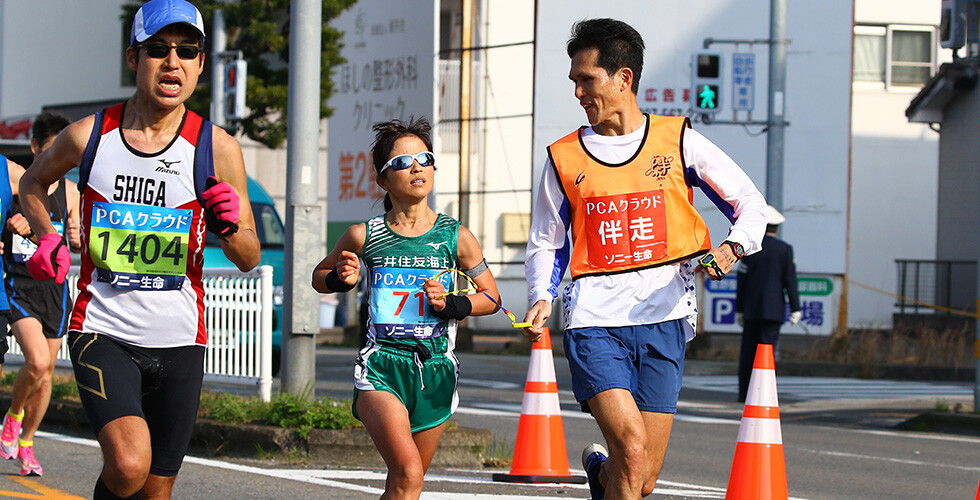
But where this year's field really stands out is in its list of first-timers. Sub-61 half marathoners Kiyoshi Koga (Yasukawa Denki) and Yusuke Nishiyama (Toyota) are there fresh off good runs on the New Year Ekiden's longest stage. Track specialist Tetsuya Yoroizaka (Asahi Kasei) is running for real after a couple of less-serious marathon stabs, and likewise doing it off a good New Year run.
Last time around Aoyama Gakuin University's Yuya Yoshida made a big impact at Beppu-Oita in his debut, and this time the 2022 Hakone Ekiden champ team has five members on the list including Hakone members Kotaro Kondo and Takayuki Iida, who ran the equivalent of 1:01:20 and 1:02:21 half marathons on their stages, and sub-63 half marathoners Taiki Miyasaka, Ryo Nishikubo and Shungo Yokota.
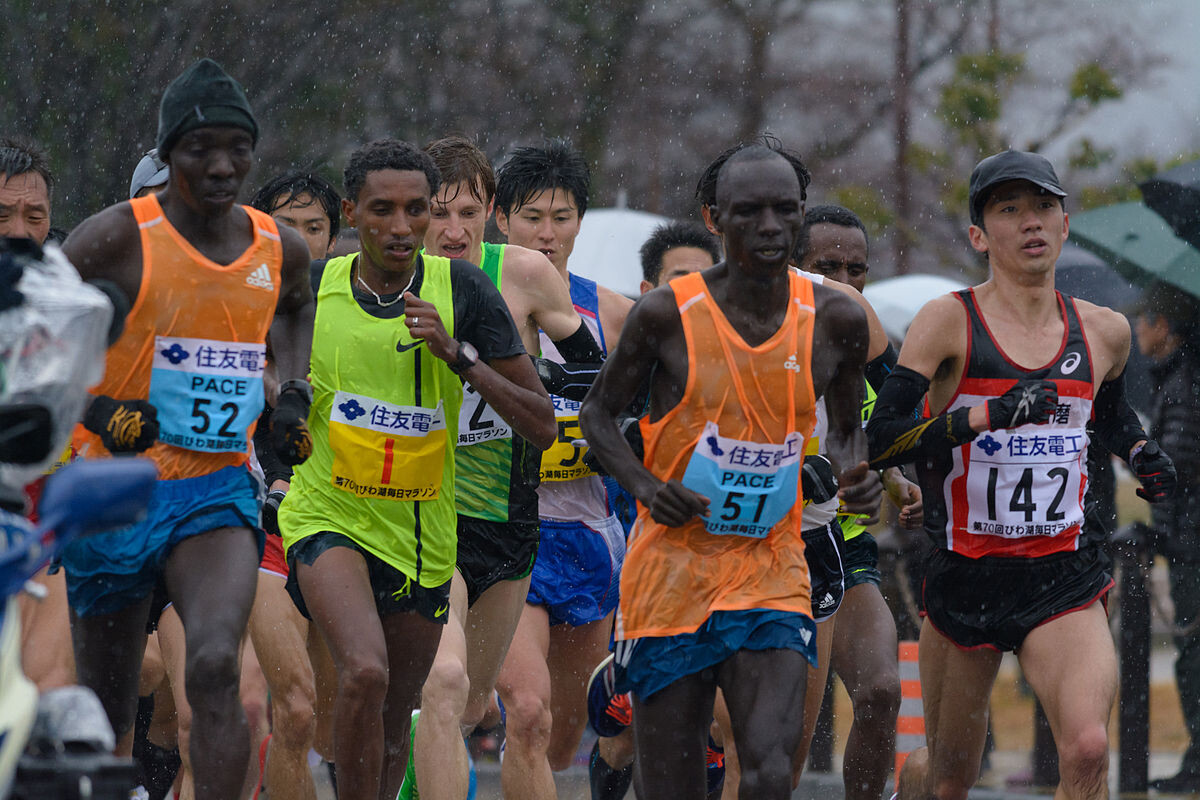
It should be a great race that cranks out even more quality Japanese marathoners. TBS will be broadcasting it live, and JRN will cover it on @JRNLive. Check back closer to race date for more info.
70th Beppu-Oita Mainichi Marathon
Elite Field
Shuho Dairokuno (Asahi Kasei) - 2:07:12 (Lake Biwa 2021)
Tsubasa Ichiyama (Komori Corp.) - 2:07:41 (Lake Biwa 2021)
Daisuke Hosomori (YKK) - 2:08:28 (Lake Biwa 2021)
Hiroto Fujimagari (Toyota Kyushu) - 2:08:30 (Lake Biwa 2021)
Takuya Fujikawa (Chugoku Denryoku) - 2:08:45 (Tokyo 2020)
Yuta Koyama (Toenec) - 2:08:46 (Lake Biwa 2021)
Ryo Hashimoto (GMO) - 2:09:29 (Beppu-Oita 2019)
Hisanori Kitajima (Yasukawa Denki) - 2:09:54 (Lake Biwa 2021)
Shogo Kanezane (Chugoku Denryoku) - 2:10:17 (Lake Biwa 2021)
Tadashi Suzuki (Suzuki) - 2:10:46 (Hofu 2020)
Derese Workneh (Ethiopia/Hiramatsu Byoin) - 2:10:52 (Fukuoka Int'l 2019)
Taiki Yoshimura (Asahi Kasei) - 2:11:13 (Hofu 2019)
Yuichi Okutani (Otsuka Seiyaku) - 2:11:16 (Beppu-Oita 2020)
Tomohiro Tanigawa (Konica Minolta) - 2:11:54 (Hofu 2020)
Debut/Do-Over
Kiyoshi Koga (Yasukawa Denki) - 1:00:49 (Nat'l Corp. Half 2020)
Yusuke Nishiyama (Toyota) - 1:00:55 (Nat'l Corp. Half 2020)
Akira Akasaki (Kyudenko) - 1:01:46 (Ageo City Half 2019)
Tetsuya Yoroizaka (Asahi Kasei) - 1:01:57 (Marugame 2020)
Riki Nakanishi (Toenec) - 1:02:02 (Osaka 2020)
Taiki Miyasaka (Aoyama Gakuin Univ.) - 1:02:26 (Takanezawa 2020)
Ryo Nishikubo (Aoyama Gakuin Univ.) - 1:02:30 (Takanezawa 2020)
Shungo Yokota (Aoyama Gakuin Univ.) - 1:02:36 (Hi-Tech 2022)
Yuya Kawata (Subaru) - 1:02:38 (Nat'l Corp. Half 2021)
Noriaki Oyama (Konica Minolta) - 1:02:41 (Marugame 2020)
Shogo Ise (Konica Minolta) - 1:02:53 (Marugame 2019)
Takayuki Iida (Aoyama Gakuin Univ.) - 1:03:10 (Takanezawa 2019)
Kotaro Kondo (Aoyama Gakuin Univ.) - 1:03:42 (Nat'l Univ. Half 2021)
(01/15/2022) ⚡AMPby Brett Larner
Beppu-Oita Mainichi Marathon
The Beppu-Oita Marathon is an annual men's marathon race that takes place every February between the cities of Beppu and Oita on the island of Kyushu in Japan. First held in 1952 as a 35km race, the looped marathon course begins at the bottom of Takasaki Mountain and reaches Beppu's Kankoko International Port before turning back towards the finishing point...
more...Ethiopia’s Askale Merachi and Kelkile Gezahegn will defend their titles at the 50th Chevron Houston Marathon, while Kenya’s Vicoty Chepngeno and Shadrack Korir lead the entries for the Aramco Half
Merachi won in Houston in 2020 in 2:23:29, finishing more than a minute ahead of the rest of the field. She went on to win the Taipei Marathon later that year in 2:28:31, but hasn’t raced since then, so her form going into this weekend’s race is relatively untested.
She will face stiff competition from compatriot Biruktayit Eshetu Degefa, a three-time winner in Houston who is aiming to become the race’s first four-time winner. She finished runner-up to Merachi in 2020, clocking 2:24:47. Her PB stands at 2:22:40, set in Toronto in 2019, while her fastest time in Houston is the 2:23:28 she ran to win three years ago.
Two-time Chicago Marathon winner Atsede Baysa has the fastest PB of the field with 2:22:03. A sub-2:25 time may be required to make the podium on Sunday, but the last time the 34-year-old Ethiopian bettered that barrier was back in 2012.
Ethiopian women have won the past 14 editions of the Houston Marathon, but that streak could be under threat on Sunday as Keira D’Amato aims to become the first US woman to win the Houston Marathon since 2005.
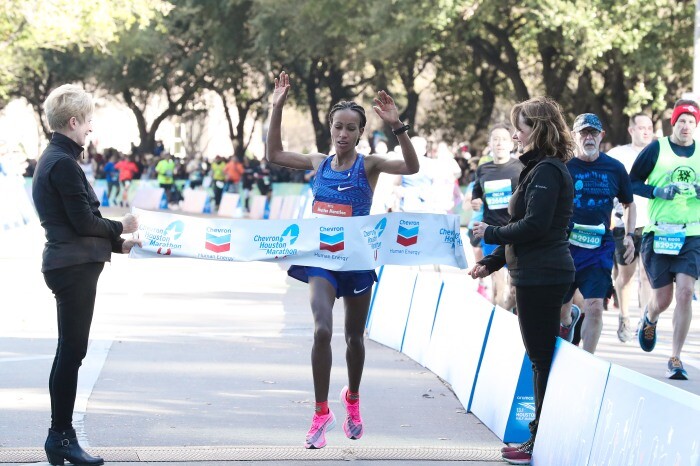
The 37-year-old, who took a complete break from running between 2009 and 2016, has been racking up impressive performances on the roads in recent years. She set a marathon best of 2:22:56 and a North American 10-mile record of 51:23 in 2020, finished fourth at last year’s Chicago Marathon, and clocked a half marathon PB of 1:07:55 last month. If conditions are good, the course record of 2:23:14 – set by Alemitu Abera in 2012 – could be under threat.
Ethiopian marathon debutante Tsige Haileslase and USA’s Robert Groner, who finished sixth at the 2019 World Championships, are among the other contenders.
Gezahegn, the defending men’s champion, won with 2:08:36 two years ago and finished two minutes clear of his nearest rivals. His only race since then was the 2021 Boston Marathon, where he finished 15th in 2:12:37. A 2:05:56 runner at his best, the 25-year-old will be keen to use this weekend’s race as an opportunity for redemption.
If John Langat can reproduce his form from 2019, when he won in Eindhoven in a PB of 2:07:11, he could contend for the victory on Sunday. Japan’s Kenta Uchida will also be a formidable opponent. He has a lifetime best of 2:08:12 and will be keen to earn his first marathon victory.
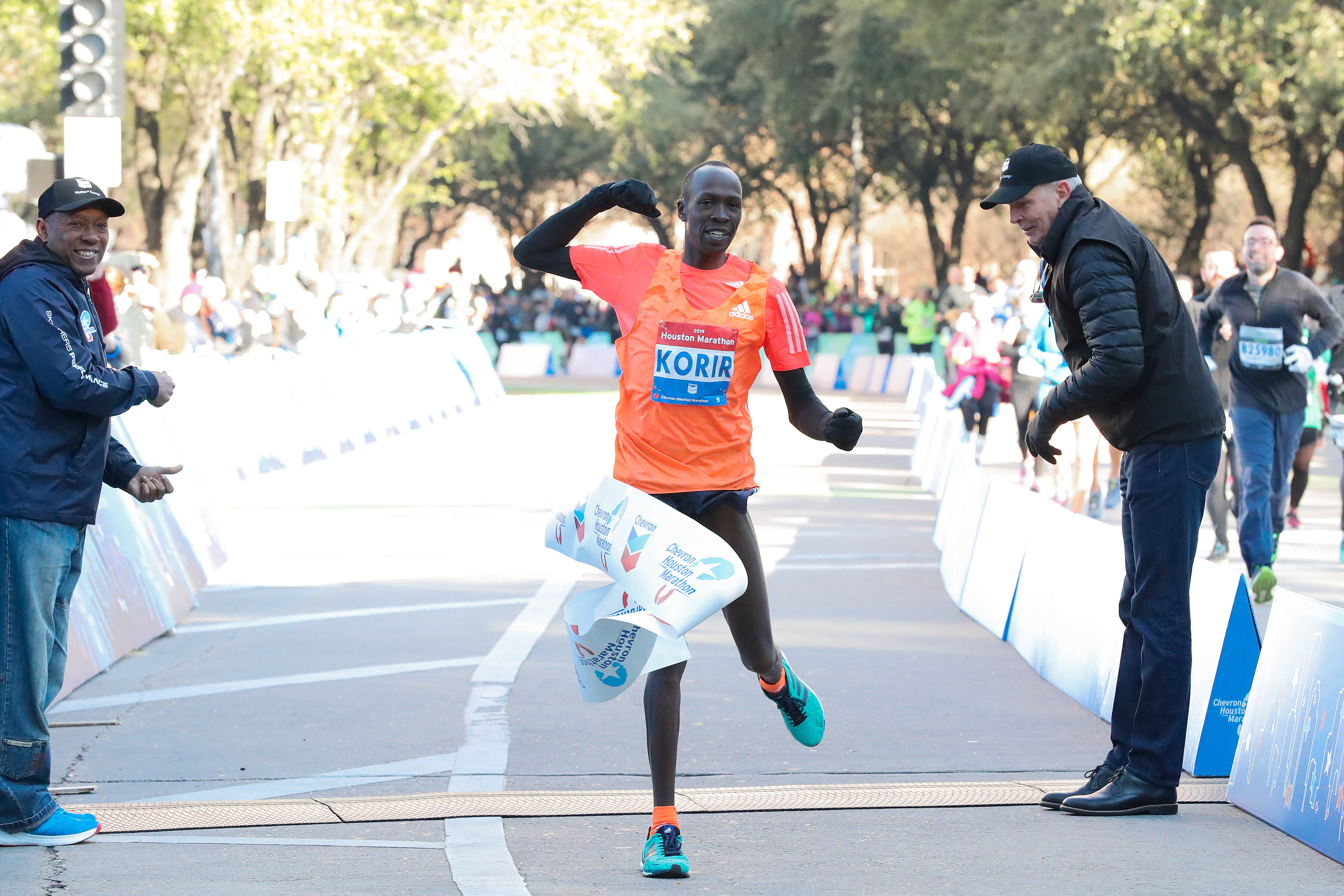
Bahrain’s Abdi Abdo, Ethiopia’s 2008 world indoor 3000m champion Tariku Bekele and US marathon debutant Frank Lara are others to watch out for.
Vicoty Chepngeno will start as the favourite for the Houston Half Marathon, held concurrently with the marathon. The 28-year-old Kenyan has an impressive record in US road races; she has won nine of her past 10 half marathons on US roads, and her lifetime best of 1:07:22 was set in her most recent outing over the distance, in Philadelphia two months ago. Despite her extensive racing experience, though, this will be Chepngeno’s first Houston Half Marathon.
Compatriot Monicah Ngige, meanwhile, will be making her third Houston Half Marathon appearance. The 28-year-old set her PB of 1:07:29 there in 2019. More recently, she finished fourth at the Boston Marathon in October on her debut over the distance, clocking 2:25:32.
Sara Hall leads the US entrants. The 38-year-old has focused more on the marathon in recent years, achieving podium places at the 2020 London Marathon and the 2021 Chicago Marathon, also clocking a PB of 2:20:32 in between those outings. But she has also won her two most recent half marathons, setting a PB of 1:08:18 in 2020.
Shadrack Kimining Korir returns to Houston after finishing third in 2020 in a personal best of 59:27, just two seconds shy of the winner. His most recent outing was at the Lisbon Half Marathon in October, where he finished fifth in 1:02:42.
Wilfred Kimitei also competed in Lisbon towards the end of last year, albeit in a different event to the one where Korir raced, and finished 11th in 1:00:03 – just 23 seconds shy of the PB he set in Ras Al Khaimah in 2018.
Ethiopia’s Milkesa Mengesha also heads to Houston in good form. The 2019 world U20 cross-country champion, still only 21, finished ahead of Kimitei in Lisbon in November, clocking a PB of 59:48 in what was just his second half marathon to date. Earlier in 2021 he set a 5000m PB of 12:58.28 and finished 10th in the Olympic final at that distance.
Kenya’s Raymond Magut, who clocked a PB of 1:00:00 in Herzogenaurach in September, should also be a strong contender, along with Ethiopia’s Bayelign Teshager and Eritrea’s Tsegay Tuemay.
Elite fields
WOMEN Half marathon
Vicoty Chepngeno (KEN) 1:07:22
Monicah Ngige (KEN) 1:07:29
Sara Hall (USA) 1:08:58
Caren Maiyo (KEN) 1:09:20
Sarah Pagano (USA) 1:09:41
Emily Durgin (USA) 1:09:47
Maegan Krifchin (USA) 1:09:51
Andrea Ramirez Limon (MEX) 1:10:20
Dominique Scott (ZAF) 1:10:42
Elaina Tabb (USA) 1:10:44
Nell Rojas (USA) 1:10:45
Julia Griffey (USA) 1:11:04
Emily Setlack (CAN) 1:11:41
Dakotah Lindwurm (USA) 1:11:43
Maor Tiyouri (ISR) 1:11:50
Paige Stoner (USA) 1:11:53
Jessica Judd (GBR) debut
Fiona O’Keeffe (USA) debut
Maddie Alm (USA) debut
Marathon
Atsede Baysa (ETH) 2:22:03
Biruktayit Eshetu Degefa (ETH) 2:22:40
Keira D’Amato (USA) 2:22:56
Askale Merachi (ETH) 2:23:29
Roberta Groner (USA) 2:29:09
Kathya Mirell Garcia Barrios (MEX) 2:34:46
Militsa Mircheva (BGR) 2:35:03
Tsige Haileslase (ETH) debut
Maggie Montoya (USA) debut
Emily Kearney (GBR) debut
Alice Wright (GBR) debut
MEN Half marathon
Shadrack Kimining Korir (KEN) 59:27
Wilfred Kimitei (KEN) 59:40
Milkesa Mengesha (ETH) 59:48
Raymond Magut (KEN) 1:00:00
Bayelign Teshager (ETH) 1:00:31
Tsegay Tuemay (ERI) 1:00:50
Patrick Tiernan (AUS) 1:01:22
Reed Fischer (USA) 1:01:37
Rory Linkletter (CAN) 1:01:44
Reid Buchanan (USA) 1:01:45
Colin Mickow (USA) 1:01:47
Matt Llano (USA) 1:01:47
Harvey Nelson (USA) 1:01:48
John Raneri (USA) 1:01:51
Brogan Austin (USA) 1:01:52
Zouhair Talbi (MAR) 1:02:00
Kirubel Erassa (USA) debut
Marathon
Kelkile Gezahegn (ETH) 2:05:56
John Langat (KEN) 2:07:11
Kenta Uchida (JPN) 2:08:12
Abdi Abdo (BRN) 2:08:32
Elisha Barno (KEN) 2:09:32
Tariku Bekele (KEN) 2:09:33
Augustus Maiyo (USA) 2:10:47
Jesus Arturo Esparza (MEX) 2:11:04
Birhanu Kemal Dare (ETH) 2:12:21
Tyler Jermann (USA) 2:12:40
Frank Lara (USA) debut
James Ngandu (KEN) debut
Luke Caldwell (GBR) debut
(01/14/2022) ⚡AMPby World Athletics
Chevron Houston Marathon
The Chevron Houston Marathon offers participants a unique running experience in America's fourth largest city. The fast, flat, scenic single-loop course has been ranked as the "fastest winter marathon" and "second fastest marathon overall" by Ultimate Guide To Marathons. Additionally, with more than 200,000 spectators annually, the Chevron Houston Marathon enjoys tremendous crowd support. Established in 1972, the Houston Marathon...
more...Boston Marathon announces their fastest ever men’s field
Organisers of the Boston Marathon have revealed their fastest ever men’s field for the 126th edition of the World Athletics Platinum Elite Label road race on 18 April.
It features 12 men with lifetime bests faster than 2:06, led by three-time Olympic champion Kenenisa Bekele of Ethiopia, the second fastest marathon runner in history with a best of 2:01:41.
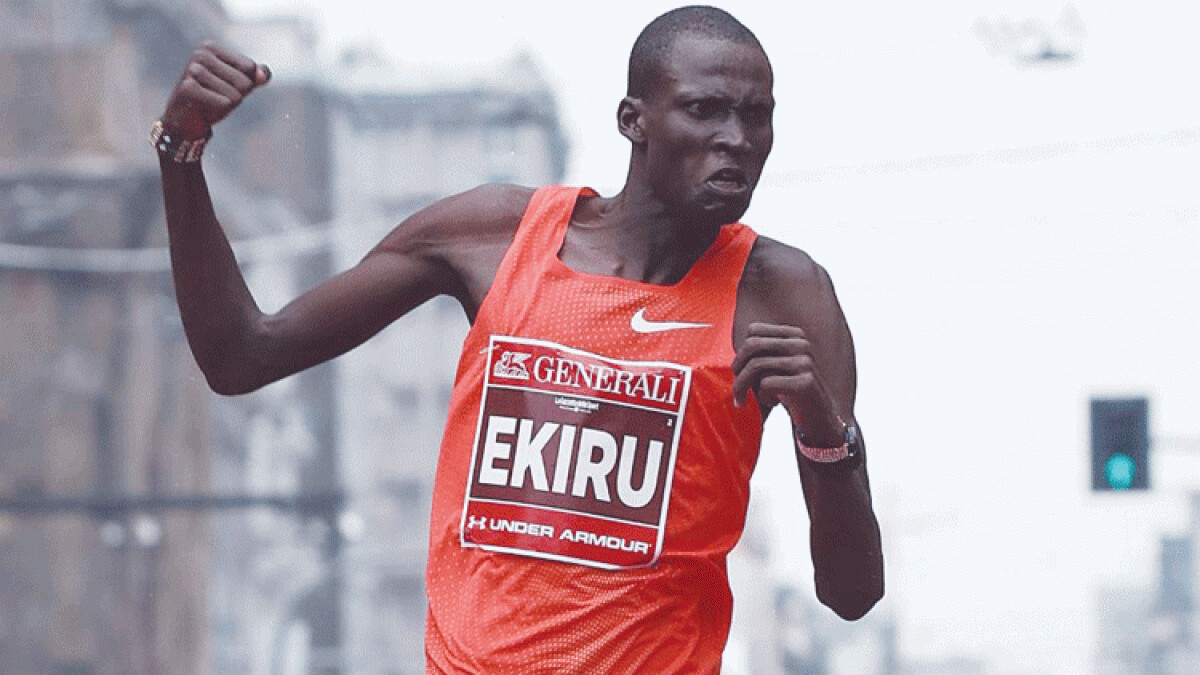
“I recognise the tradition of the Boston Marathon and look forward to racing in April,” said Bekele. “For many years Ethiopia has had a strong tradition in Boston, and I am excited to join that legacy. I have long looked forward to racing the Boston Marathon.”
Seven of the past eight winners will also return to Boston, including 2021 champion Benson Kipruto of Kenya. Lawrence Cherono (2019), Yuki Kawauchi (2018), Geoffrey Kirui (2017), Lemi Berhanu (2016), and Lelisa Desisa (2015 and 2013) are the other six former winners.
“Being back in Boston as a champion is very exciting, but at the same time I feel the pressure and the responsibility to defend my title,” said Kipruto. “I really admire those athletes that managed to be multiple champions in big races. I really want to do my best to be one of them and I really hope to make my name among those Boston champions that people will remember for a long time.”

Other strong contenders include Titus Ekiru, the fastest marathon runner in the world last year having run 2:02:57 in Milan, 2020 world leader Evans Chebet, New York City Marathon winner Albert Korir, and three-time world half marathon champion Geoffrey Kamworor.
Men’s elite field
Kenenisa Bekele (ETH) 2:01:41Titus Ekiru (KEN) 2:02:57Evans Chebet (KEN) 2:03:00Lawrence Cherono (KEN) 2:03:04Bernard Koech (KEN) 2:04:09Lemi Berhanu (ETH) 2:04:33Lelisa Desisa (ETH) 2:04:45Gabriel Geay (TAN) 2:04:55Benson Kipruto (KEN) 2:05:13Geoffrey Kamworor (KEN) 2:05:23Eric Kiptanui (KEN) 2:05:47Bethwell Yegon (KEN) 2:06:14Geoffrey Kirui (KEN) 2:06:27Eyob Faniel (ITA) 2:07:19Yuki Kawauchi (JPN) 2:07:27Albert Korir (KEN) 2:08:03Amanuel Mesel (ERI) 2:08:17Bayelign Teshager (ETH) 2:08:28Tsegay Tuemay Weldibanos (ERI) 2:09:07Scott Fauble (USA) 2:09:09Colin Bennie (USA) 2:09:38Trevor Hofbauer (CAN) 2:09:51Jared Ward (USA) 2:09:25Ian Butler (USA) 2:09:45Mick Iacofano (USA) 2:09:55Jake Riley (USA) 2:10:02Jerrell Mock (USA) 2:10:37Jemal Yimer (ETH) 2:10:38Juan Luis Barrios (MEX) 2:10:55Matt McDonald (USA) 2:11:10Matt Llano (USA) 2:11:14Elkanah Kibet (USA) 2:11:15CJ Albertson (USA) 2:11:18Diego Estrada (USA) 2:11:54
(01/13/2022) ⚡AMPby World Athletics
Boston Marathon
Among the nation’s oldest athletic clubs, the B.A.A. was established in 1887, and, in 1896, more than half of the U.S. Olympic Team at the first modern games was composed of B.A.A. club members. The Olympic Games provided the inspiration for the first Boston Marathon, which culminated the B.A.A. Games on April 19, 1897. John J. McDermott emerged from a...
more...Olympic Medalists Will Headline 2022 Boston Marathon Women’s Field
Peres Jepchirchir of Kenya, the 2021 Olympic gold medalist in the marathon, and her countrywoman Joyciline Jepkosgei, who ran the fastest marathon of 2021, 2:17:43, when she won the London Marathon, headline the Boston Marathon elite women’s field for 2022.
American Molly Seidel, who won Olympic bronze last summer, will also line up in Hopkinton on April 18.

The race marks the 50th anniversary of the first official women’s field at the Boston Marathon. This year’s elite women entrants include Olympic and Paralympic medalists, World Major Marathon champions, and sub-2:20 marathoners.
The race will include four Ethiopians with sub-2:20 credentials: Degitu Azimeraw, Roza Dereje, Zeineba Yimer, and Tigist Girma.
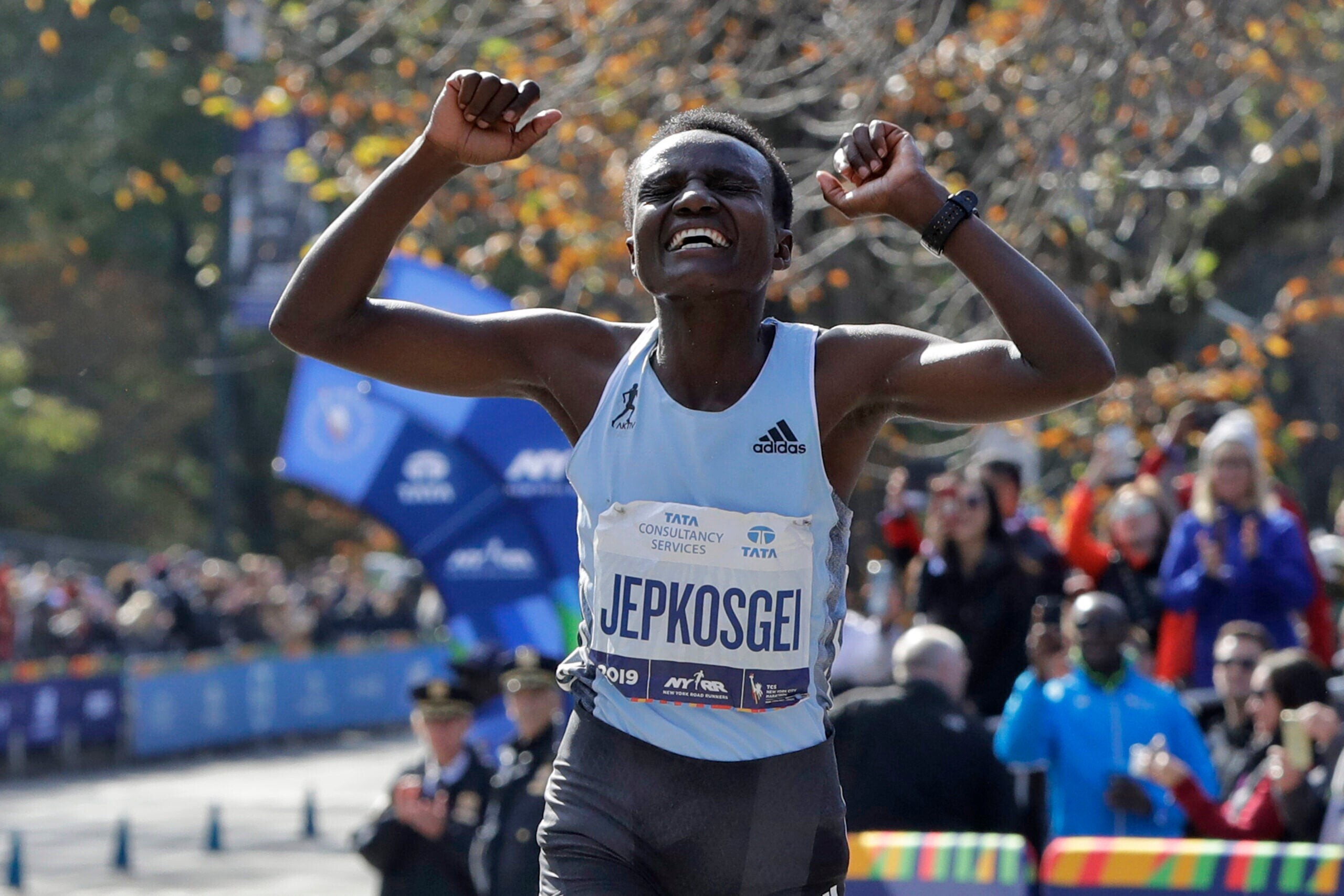
Former Boston Marathon champions Des Linden (2018) and Edna Kiplagat (2017) will race, as will Mary Ngugi of Kenya, who was third in Boston last October.
In addition to Linden, Sara Hall, who is the second-fastest woman in American marathoning history, is part of a strong crop of American talent. Nell Rojas, who was the top American finisher at Boston last year, and top-10 2020 Olympic Trials finishers Kellyn Taylor and Stephanie Bruce are also scheduled to run.
Other notable competitors include Canadian Olympian and national record-holder Malindi Elmore, two-time Canadian Olympian Natasha Wodak, and Charlotte Purdue, who is the third-fastest woman in British marathon history.
The Boston Marathon benefits from being the only World Marathon Major race on the calendar in the spring.
“As we look to celebrate the trailblazing women of 1972, we are delighted to welcome the fastest and most accomplished women’s field in the history of the Boston Marathon,” BAA President and CEO Tom Grilk said in a press release. “Though there have been many milestones in the five decades since the women’s division was established in Boston, this field of Olympic and Paralympic medalists, Boston champions, and global stars will make this a race to remember on Patriots’ Day.”
Elite field
Peres Jepchirchir (KEN) 2:17:16Joyciline Jepkosgei (KEN) 2:17:43Degitu Azimeraw (ETH) 2:17:58Roza Dereje (ETH) 2:18:30Zeineba Yimer (ETH) 2:19:28 Edna Kiplagat (KEN) 2:19:50Tigist Girma (ETH) 2:19:52Maurine Chepkemoi (KEN) 2:20:18Sara Hall (USA) 2:20:32Desiree Linden (USA) 2:22:38Viola Cheptoo (KEN) 2:22:44 Purity Changwony (KEN) 2:22:46Charlotte Purdue (GBR) 2:23:26Kellyn Taylor (USA) 2:24:28Molly Seidel (USA) 2:24:42Malindi Elmore (CAN) 2:24:50Mary Ngugi (KEN) 2:25:20 Monicah Ngige (KEN) 2:25:32Natasha Wodak (CAN) 2:26:19Nell Rojas (USA) 2:27:12 Stephanie Bruce (USA) 2:27:47Dakotah Lindwurm (USA) 2:29:04Roberta Groner (USA) 2:29:09Angie Orjuela (COL) 2:29:12Bria Wetsch (USA) 2:29:50Maegan Krifchin (USA) 2:30:17Elaina Tabb (USA) 2:30:33Lexie Thompson (USA) 2:30:37Kate Landau (USA) 2:31:56
(01/11/2022) ⚡AMP
by Chris Hatler
Boston Marathon
Among the nation’s oldest athletic clubs, the B.A.A. was established in 1887, and, in 1896, more than half of the U.S. Olympic Team at the first modern games was composed of B.A.A. club members. The Olympic Games provided the inspiration for the first Boston Marathon, which culminated the B.A.A. Games on April 19, 1897. John J. McDermott emerged from a...
more...World indoor record-holder Gudaf Tsegay will returns to Lievin, venue of world indoor record
Organizers of the Meeting Hauts-de-France Pas-de-Calais have confirmed that world indoor record-holder Gudaf Tsegay will compete in the mile at the World Athletics Indoor Tour Gold meeting in Lievin on February 17.
The 24-year-old Ethiopian got her 2021 indoor campaign under way in the French town last year, stunning the athletics world by smashing the world indoor 1500m record with 3:53.09.
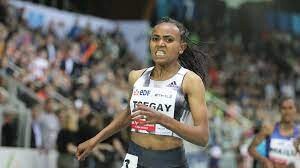
In the weeks that followed, she clocked world-leading indoor PBs of 1:57.52 for 800m and 8:22.65 for 3000m. She went on to set outdoor PBs of 3:54.01 for 1500m, a world-leading 14:13.32 for 5000m, and 29:39.42 for 10,000m. She capped her season by taking bronze over 5000m at the Olympic Games in Tokyo.
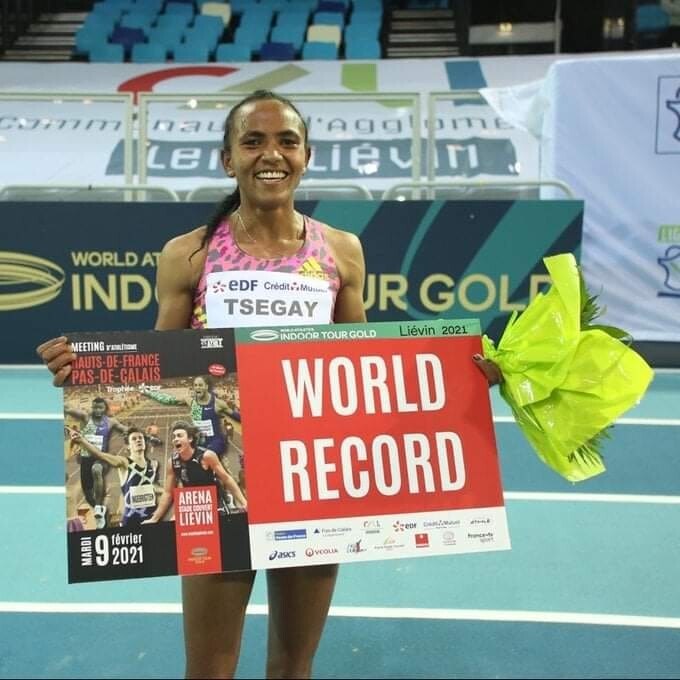
Tsegay hasn’t contested an indoor mile since 2016 when she set her current PB of 4:24.98. Her outdoor best stands at 4:16.14, set in 2018, but her form in recent years suggests that the world indoor record of 4:13.31, set by Genzebe Dibaba in 2016, could be under threat.
The Meeting Hauts-de-France Pas-de-Calais is one of seven Gold-level World Indoor Tour meetings this year. Last year’s edition was highlighted by world-leading performances from Jakob Ingebrigtsen over 1500m and Getnet Wale over 3000m, plus a 60m victory from Marcell Jacobs. The Italian, who went on to win Olympic 100m gold, will also be back in Lievin next month
(01/10/2022) ⚡AMPby World Athletics
Seyaum and Yihune claim Campaccio crowns
Dawit Seyaum and Addisu Yihune achieved an Ethiopian double at the 65th edition of the Campaccio in San Giorgio su Legnano, the eighth Gold level meeting of this season’s World Athletics Cross Country Tour, on Thursday (6).
The 2022 edition of the popular Northern Italian race celebrated the 100th anniversary of the local sports club Unione Sportiva Sangiorgese.
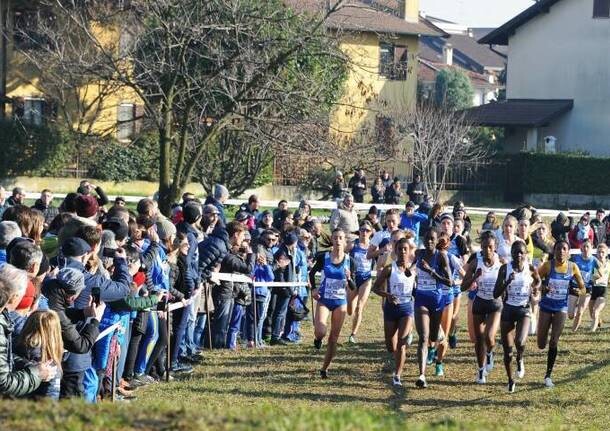
In the women’s race, Eritrea’s Rahel Daniel Ghebreyohannes took the early lead ahead of a seven-women group featuring Ethiopia’s Medina Eisa, Kenya’s world U20 champion Beatrice Chebet, Seyaum, Kenya’s Lucy Mawia, Ethiopia’s Fantaye Belayneh, Italy’s Anna Arnaudo and her compatriot Nadia Battocletti, the European U23 cross country champion. The leading pack went through the 2km mark in 6:38.
Seven runners remained at the front as the pace picked up at 4km. Seyaum changed gear, clocking a split of 2:49 between 4km and 5km. The leading pack was whittled down to five runners at 5km.
Seyaum, Chebet and Daniel Ghebreyohannes broke away with 500 metres to go and battled it out for the win. Seyaum unleashed her final kick to cross the finish line in 18:48, holding off Atapuerca cross country winner Daniel Ghebreyohannes by just one second in a close sprint. Chebet was beaten for the second time in this cross country season by Daniel Ghebreyohannes and had to settle for third place in 18:51 ahead of Belayneh (18:56) and Eisa (19:05).
Battocletti edged her Slovenian rival Klara Lukan to finish sixth in 19:06.
Seyaum claimed a back-to-back win after her recent triumph at the Boclassic 5km road race in Bolzano last Friday.
The men’s race saw a big group featuring Kenya’s Vincent Kipkurui Too, Emmanuel Korir Kiplagat and Amos Serem, together with Ethiopia’s Yihune, Eritrea’s Aron Kifle and Italian runners Iliass Aouani, Yohanes Chiappinelli and Eyob Ghebrehiwet Faniel, go through 3km in 8:43.
Too set the pace at the front of an eight-man group, closely followed by Serem, Kiplagat, Kifle, Yihune and Faniel during the third lap. They went through 4km in 11:46 and 5km in 14:30.
Aouani was the first to drop back at 7km and the leading group was whittled down to seven athletes. Kiplagat then moved to the front ahead of six other runners: Serem, Kifle, Faniel, Too, Yihune and Chiappinelli.
The first significant move came at 8km when Yihune, Kiplagat, Too, Serem and Kifle picked up the pace and pulled away from marathon runner Faniel by two seconds. Yihune pushed on at the front and increased his lead during the last lap, going on to cross the finish line in 28:39 with a six-second gap over Kiplagat.
Serem, who won the world U20 gold medal in the 3000m steeplechase in Nairobi last August, won a very close sprint for third place in 28:53, holding off Too. Kifle rounded out the top five in 28:59.
Faniel finished sixth as the first Italian athlete in 29:15, beating European 3000m steeplechase bronze medallist Chiappinelli (29:21) and Italian cross country champion Aouani (29:45).
Yihune joined the list of Ethiopian stars who have won the Campaccio race, that includes Haile Gebrselassie, Kenenisa Bekele, Muktar Edris, Imane Merga and Hagos Gebrhiwet.
Yihune, who will turn 19 in March, finished fourth in the 5000m at the World U20 Championships in Nairobi and clocked a PB of 12:58.99 over this distance in Hengelo last June.
“I felt confident during the race that I could win, as I knew that I was well prepared,” said Yihune. “I train with Selemon Barega. He is my role model.”
(01/09/2022) ⚡AMPby World Athletics
Jeruto and Ebenyo take 10km honours in Valencia
Norah Jeruto and Daniel Simiu Ebenyo secured a Kenyan double at the 10K Valencia Ibercaja – a World Athletics Label Road Race – held on Sunday (9) in the Spanish coastal city on a windy day, which somewhat hampered athletes' performances.
Ebenyo clocked a PB of 26:58 to move to seventh on the world all-time list, while Jeruto ran 30:35 for a three-second victory ahead of Karoline Bjerkeli Grovdal.
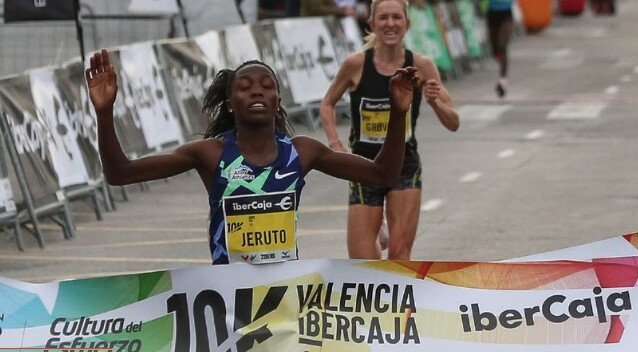
Fourth time lucky for Jeruto
Jeruto had claimed podium places on her three previous appearances in Valencia but the 26-year-old had never been the victor. The 2011 world U18 2000m steeplechase champion confirmed her role of hot favourite and dominated the race from the gun.
Paced by two male pacemakers, Mourad El Bannouri and Luis Agustin, the women’s event opened at a steady 3:03/3:04 pace, with a leading quintet featuring Jeruto, her fellow Kenyan Gladys Chepkurui, Ethiopian debutante Anchinalu Dessie Genaneh, Norway’s European cross country champion Grovdal and Sweden’s Meraf Bahta, the silver medallist at the European event in Dublin.
The first casualty was Bahta, who began to lose ground just before the fifth kilometre, which was reached in 15:18 to dash any hope of the world record being broken. Grovdal’s split of 15:19 was also outside Paula Radcliffe's European record pace.
The toughest section of the competition came between the fifth and seventh kilometres, because of an annoying headwind. Despite that barrier, Jeruto clearly pulled away from the lead pack, always following the pacemaker. Way back, Chepkurui was a lonesome second ahead of Genaneh, herself clear of Grovdal.
Over the closing kilometres the big questions were how close to 30 minutes Jeruto could be, and whether Grovdal would approach the European record. The 31-year-old Norwegian first moved into third place and by the eighth kilometre she had joined Chepkurui in second place, while Jeruto’s successive 3:05 kilometres meant she was off the pace needed to break 30:00.
After leaving Chepkurui behind with some 1500m remaining, Grovdal never threatened Jeruto’s win but she drastically closed the gap. Jeruto ran home in 30:35, three seconds ahead of Grovdal, whose 30:38 was her second-quickest ever time behind the 30:32 run she achieved in 2020, while Chepkurui completed a classy podium in 30:48.
Ebenyo breezes under the 27-minute barrier
The men’s start took place 15 minutes after the women’s and kicked off at the scheduled 2:42/km cadence in the hunt for a sub-27:00 clocking. In the absence of an official pacemaker, it was Ethiopia’s Chimdessa Debele Gudeta who took full command of the race, with only Kenya’s Ebenyo for company.
The leading duo went through the half way point in a promising 13:30, perfectly on schedule for the targeted time. By then, Jacob Krop travelled in third place, five seconds off the leaders, but also five seconds clear of his fellow Kenyan Boniface Kibiwott, while Great Britain’s European U23 10,000m bronze medallist Emile Cairess was the first European thanks to a 13:51 split. At that point he was four seconds ahead of Switzerland’s European record-holder Julien Wanders.
During the sixth kilometre, Ebenyo began to take a turn at the helm, and with some 20 minutes on the clock the 26-year-old Kenyan opened a gap on Gudeta, which grew over the following kilometres. Despite his lead, Ebenyo managed to maintain his 2:42 pace like a Swiss clock to reach the 9km checkpoint in 24:16, with a seven-second advantage over Gudeta.
The 2020 San Silvestre Vallecana winner covered the closing kilometre like a man on a mission to finally cross the finish line in a huge lifetime best of 26:58.
Runner-up Gudeta also improved his career best to 27:10 and Krop was third in a PB of 27:23.
Fast-finishing Cairess almost pipped Kibiwott on the line, with both athletes being given 27:44 – a 30-second improvement on his previous best for the Briton.
(01/09/2022) ⚡AMP
by Emeterio Valiente for World Athletics
Fast 10km times expected in Valencia
Two years ago at the 10K Valencia Ibercaja, Kenya’s Rhonex Kipruto set the current men’s world record with his impressive 26:24 performance. This year, organizers hoped to match that feat in the women’s event at the World Athletics Label Road Race by bringing together some of the most outstanding distance athletes, including Ethiopia’s Yalemzerf Yehualaw and Kenya’s Norah Jeruto.
Unfortunately Yehualaw, the main candidate to improve the 29:38 mark achieved by Bahrain’s Kalkidan Gezahegne in Geneva last October, will be unable to compete in Valencia on Sunday (9) after testing positive for Covid-19 just before travelling on Thursday. Gezahegne's performance is awaiting ratification as the women's world 10km record set in a mixed race, with the current ratified mark the 29:43 run by Joyciline Jepkosgei in 2017.
The 22-year-old Yehualaw holds the second-quickest ever time in the half marathon, courtesy of her 1:03:51 run in Valencia on 24 October, when she covered the opening 10km in 29:45. Her 3:01 per kilometer average pace suggested the world 10km record was well within the world half marathon bronze medallist's capabilities.
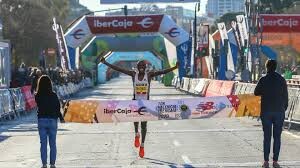
Jeruto will be in the Mediterranean city this Sunday, however, and is a classic contender in the event, having recorded times of 29:51 in January 2020 and 30:08 in October 2021. She boasts the world’s third-quickest 3000m steeplechase time in history with a stunning 8:53.65 clocking to her credit and confirmed her top shape by winning the Italica cross country meeting on 21 November against some top competition.
The European record that belongs to Great Britain’s Paula Radcliffe seems to be in jeopardy thanks to the presence of the newly-crowned European cross country champion Karoline Bjerkeli Grovdal. In Dublin the 31-year-old Norwegian achieved at last the elusive gold medal she had chased for many years, having previously won one silver and four bronze medals.
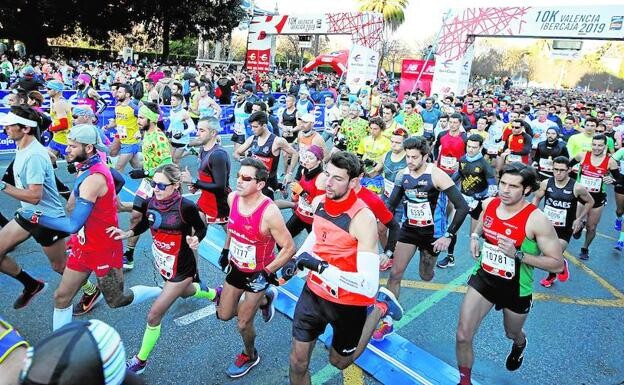
Boosted by her recent success, Grovdal should improve her lifetime best of 30:32 set in 2020 to attack the European record of 30:21 set by Radcliffe in 2003, when it was a world record. Sweden’s 2014 European 5000m champion Meraf Bahta, silver medalist in Dublin, will also be looking for a fast time after setting a national 5km record of 15:04 on 31 December in Barcelona.
Grovdal and Bahta will likely be joined by Kenya’s Gladys Chepkurui, who achieved a career best of 30:34 on the Spanish soil of Laredo last year, while the British pair of Charlotte Purdue and Samantha Harrison will try to break the 32-minute barrier for the first time.
Reportedly, Grovdal plans to go through the first half of the race in a moderate 15:15, to then pick up the pace during the second and more favorable closing 5km.
Men target sub-27:00 performance
Although somewhat overshadowed by the women’s event, the men’s race is also shaping up well and is headed by the Kenyan trio of Daniel Simiu Ebenyo, Boniface Kibiwott and Jacob Krop. The former won the 2020 San Silvestre Vallecana, boasts a fine 27:12 10km lifetime best and lowered his 5000m clocking to 12:55.88 last summer, while Kibiwott timed 27:13 in Geneva for third place last October. As for Krop, he’s a talented athlete who placed sixth at the World Athletics Championships in Doha over 5000m aged 18. He set his lifetime best of 27:30 in Valencia in 2020 and showed fine fitness during his last appearance in Herzogenaurach, where he won the 5km event in a PB of 13:06.
The Ethiopian response should come from the 17-year-old Chimdesa Debele, winner of the Lille 10km last November thanks to a career best of 27:16, while Switzerland’s Julien Wanders and Spain’s Carlos Mayo will be the leading Europeans. The Swiss athlete set the current European record of 27:13 here two years ago while Mayo, a 27:25.00 performer on the track, is targeting a national record to improve the mark which currently stands at 27:48.
In addition to the elite competition, there will be a mass race with 10,000 entrants divided into five waves as a security measure. Runners from 58 different countries will be looking to improve their PBs over one of the quickest circuits worldwide.
Weather forecasters predict a sunny but windy day on Sunday, with temperatures between 12 and 14ºC by the time of the event.
(01/08/2022) ⚡AMPby World Athletics
10k Valencia Ibercaja
Around the corner we have one more edition of the 10K Valencia Ibercaja, organized one more year by the C. 10K VALENCIA Athletics premiering the running season in Valencia. It is a massive urban race with more than 3,000 registered annually of 10 kilometers, where the maximum duration of the test will be 1 hour 40 minutes (100 minutes). The...
more...Defending champions will return to mark 50th anniversary of Chevron Houston Marathon
With 194,039 finishers having run 5,083,822 miles since the first Chevron Houston Marathon, the race will mark its 50th anniversary on January 16.
“When 113 runners lined up in 1972 to run loops in Memorial Park, no one would have predicted the marathon would have a Golden Anniversary at all, much less with a field of 28,000 celebrating on the streets of Houston,” said Houston Marathon Committee Executive Director Wade Morehead. “Led by some of the top marathoners and half marathoners in the world, we’re looking forward to a great day in the history of the race and the city.”
Returning to defend their Chevron Houston Marathon titles from 2020 – only a virtual race was held last year because of Covid – are Askale Merachi and Kelkile Gezahegn, both of Ethiopia. Making her seventh-consecutive appearance will be three-time champion Biruktayit Eshetu Degefa, who will renew her quest to become the race’s first four-time winner after finishing as runner-up to Merachi last year.
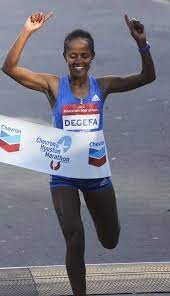
Among the Americans worth watching are Keira D’Amato and Frank Lara. D’Amato comes to Houston with a personal best of 2:22:56 and could challenge the 10-year-old course record of 2:23:14, while Lara – the 2014 Gatorade Boys’ High School Cross Country Runner of the Year out of Strake Jesuit College Prep – returns home to Houston to make his marathon debut.
Dan Green, the first winner in 1972, will serve as honorary starter, along with other members of the race’s Hall of Fame. In addition to marking its 50th anniversary, the race will serve as the first qualifier for the 2024 U.S. Olympic Team Trials – Marathon, with its newly-toughened standards of 2:18 for men and 2:37 for women.
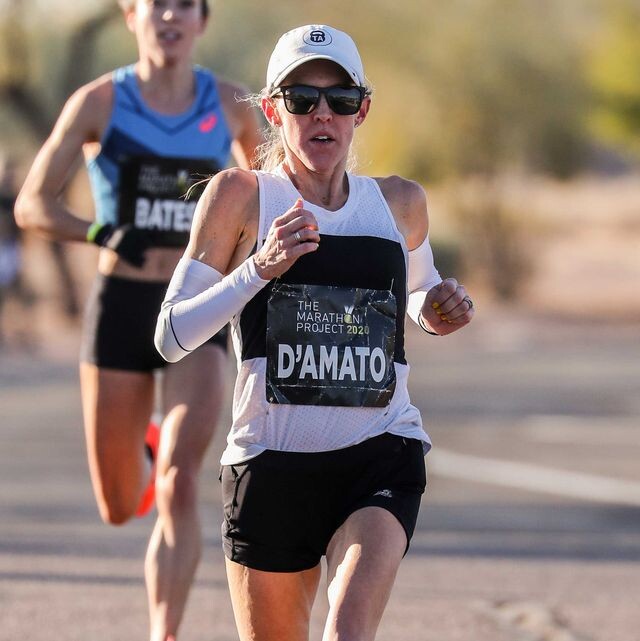
The Aramco Houston Half Marathon, run concurrently with the marathon, will be headlined by Kenya’s Vicoty Chepngeno and American Sara Hall. Chepngeno set her personal best of 1:07:22 in winning the Philadelphia Half Marathon last November, while Hall is the sixth-fastest woman in U.S. history at the half marathon and second-fastest in the marathon. On the men’s side, the fastest time in the field belongs to Shadrack Kimining Korir, who returns to Houston after finishing third here in 2020 in a personal best of 59:27.
This year, the elite fields for the two races will feature athletes representing 17 countries: the U.S., Kenya, Ethiopia, Mexico, Great Britain, Japan, Bulgaria, Guatemala, Peru, Eritrea, South Africa, Morocco, New Zealand, Canada, Israel and Australia.
The Chevron Houston Marathon and Aramco Houston Half Marathon will be broadcast on ABC-13 from 7 a.m.-10 a.m., with a race day recap at 10:35 p.m. Joining ABC-13’s Greg Bailey and Gina Gaston as expert commentator will be Des Linden, the 2018 Boston Marathon winner and 50K world-record holder. Linden made the first of her two U.S. Olympic Marathon teams in Houston in 2012.
(01/07/2022) ⚡AMPby AIMS
Chevron Houston Marathon
The Chevron Houston Marathon offers participants a unique running experience in America's fourth largest city. The fast, flat, scenic single-loop course has been ranked as the "fastest winter marathon" and "second fastest marathon overall" by Ultimate Guide To Marathons. Additionally, with more than 200,000 spectators annually, the Chevron Houston Marathon enjoys tremendous crowd support. Established in 1972, the Houston Marathon...
more...Geoffrey Kamworor eager to shine at Cross Country Tour in tribute to Tirop
Former world half marathon record holder Geoffrey Kamworor says he will be running at the World Cross Country Tour on February 12 in memory of 'close friend' and 2015 World Cross Country champion Agnes Tirop.
The inaugural cross country meet has been named Agnes Tirop Memorial World Cross Country Tour in honour of the fallen star who was found murdered in October last year at her home in Iten, Elgeyo Marakwet.
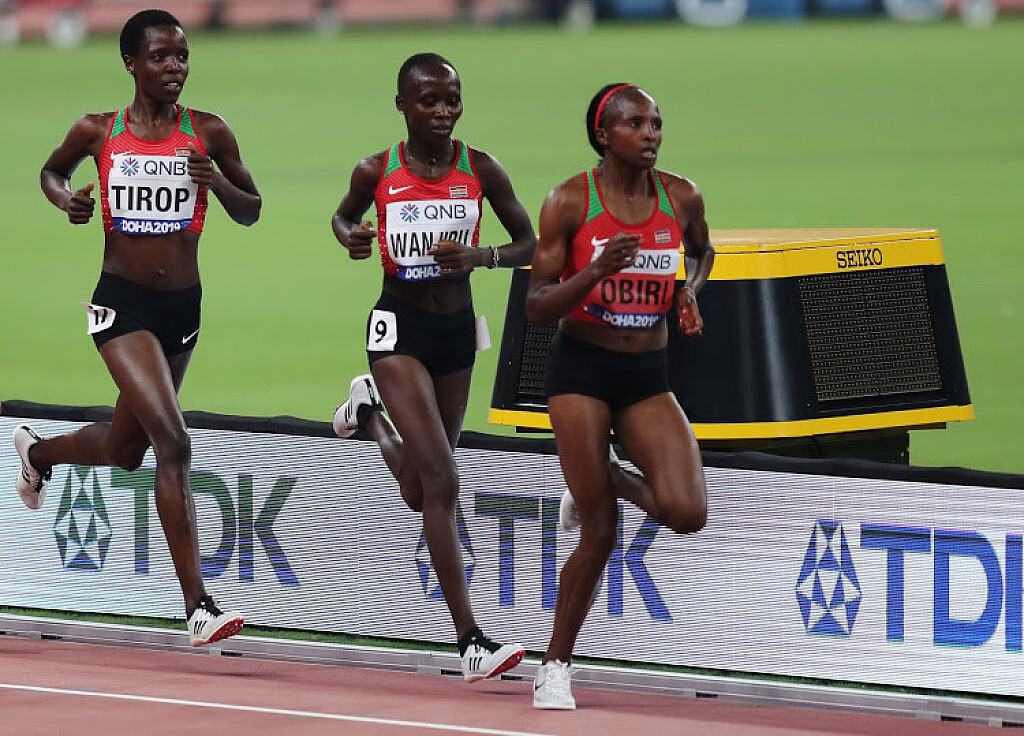
"She was one of my closest friends who always had encouraging words for me whenever we went for competitions. We would advise each other. So it is appropriate that this event be named after her and be held in the City of Champions, which is Eldoret. It is a privilege to run in this race to remember her and of course, to market it as a world-class," Kamworor said.
Despite successes in past cross country races, the 2011 World Junior Cross Country champion says he is not fixated on claiming a podium place in Eldoret.
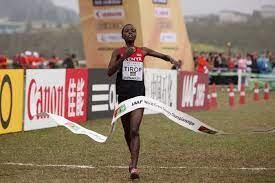
"Of course, I am naturally a cross country runner but for me, what matters most is to run a good race and remember my good friend Agnes. Other than that, it is difficult to tell how the race will pan out. I have managed to go around the course and it is perfect. I can't wait to run on it," the three-time world half marathon champion said.
It was not a rosy 2021 for Kamworor who began the year on a sour note, pulling out of the men's senior race at the national cross country championship before he had to pull out of the Tokyo Olympics due to an ankle injury.
Nonetheless, the 2017 and 2019 New York Marathon champion is keen to put the underwhelming year past him and focus on upcoming competitions in 2022.
"I don't want to comment much because last year was challenging for a lot of athletes. Many were not able to train effectively but we hope this year will be different and will be able to compete in a majority of competitions," he said.
Kamworor added: "The season is still young; we have just begun the year. I can't say much about my plans for the season but these cross country races are the perfect build-up for this year's competitions."
The 2017 World Cross Country champion is elated by the country's burgeoning reputation as a destination for major athletics events.
"It is wonderful to be competing against other great runners from other parts of the world. Normally, we are used to going outside for international events but this time it is coming home. This shows how Kenya is growing as a host nation for athletics events," he said.
The one-day invitational race will bring together a number of local and foreign athletes, among them, world 5k record holder Letesenbet Gidey of Ethiopia.
(01/06/2022) ⚡AMPby Omondi Onyatta
Top athletes for Memorial Agnes Tirop World Cross Country Tour
Three-time world half marathon champion Geoffrey Kamworor has confirmed his participation to the Memorial Agnes Tirop World Cross Country Tour on February 12 in Eldoret, Uasin Gishu County.
Kamworor said during the launch of the race at Lobo village in Kapseret Tuesday that he will be happy to compete with other international athletes in honoring the departed Tirop.
“It was so sad to loose such hard working athletes and competing in the race next month will give me joy because she was my best friend in cross country. We used to encourage one another before the race and since she is no more, I have to compete and run well,” said Kamworor.
Ethiopia’s Letesenbet Gidey the 5,000m, 10,000m and half marathon world record holder, will also line up in the women’s 10km race.
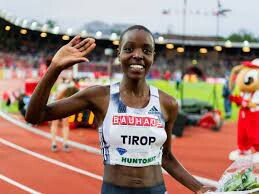
Forty invited athletes will grace the race with many Kenyan athletes expected to join the list once they are selected after the national trials which shall be held at the same venue in Eldoret.
Some of the races that will be taking place include 10km senior men and women, 8km junior men, 6km junior women, Under-18 6km boys, Under-18 4km girls, 2km boys and 1km for children and masters race.
Athletics Kenya President Jack Tuwei said the race is the only one in Africa and the last one in a series of 17, adding that Eldoret was picked by World Athletics as one of its venues for the inaugural 2022 World Cross Country Tour.
World Athletics introduced cross country tours races which will be subsequently categorized as gold, silver or bronze and will come with additional prize monies for the best performers.
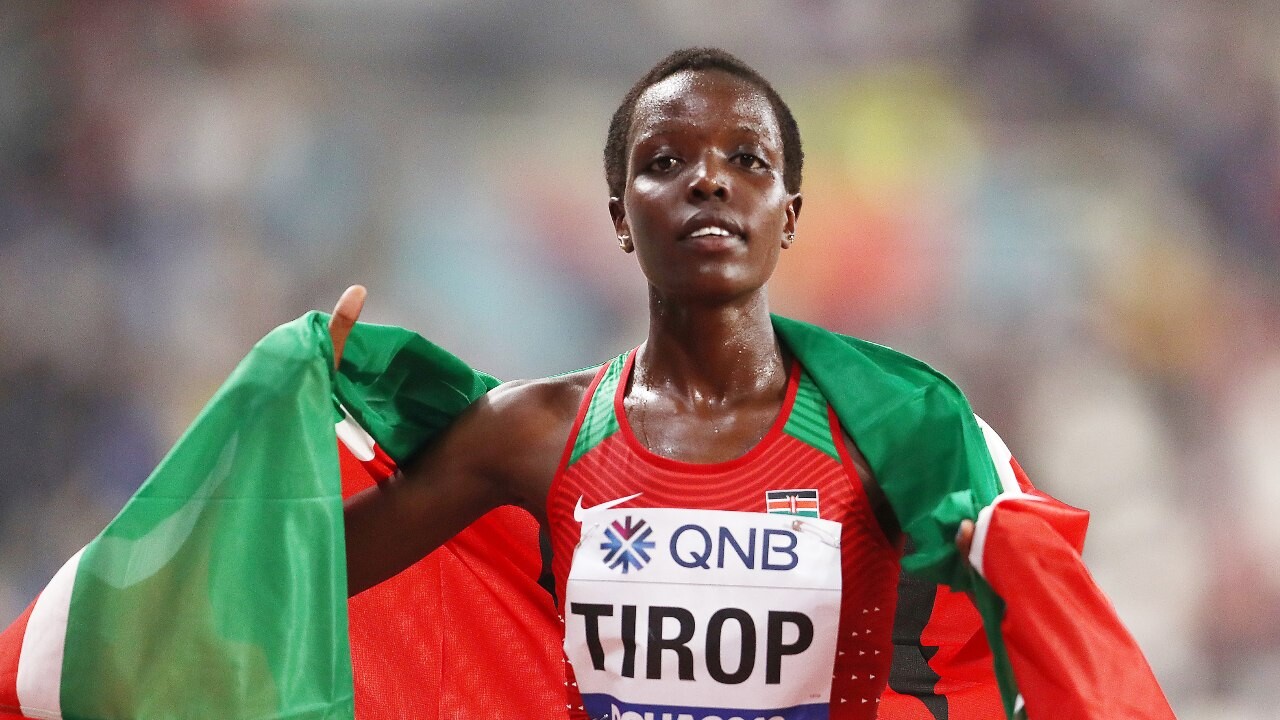
Out of the $400,000 (Sh43m) prize money for the best performers, $75,000 (Sh8m) will be set aside for the best male and female runners in the cross country tour.
“We decided to name the race after our hero Agnes Tirop who was murdered last year as one way of honoring her. The Local Organizing Committee is on top of things and we shall be able to deliver a world class event," said Tuwei.
Sports Cabinet Secretary Amina Mohamed warned rogue coaches and agents who want to ruin the sport by fleecing athletes of their hard earned cash or introducing them to drugs.
“It is really sad we are mourning the champion today who was to compete in the race because of rogue people surrounding her career. Going forward we shall be able to vet those handling athletes because the report that I will be releasing next week has a lot of issues which have to be addressed immediately,” said Amina.
She further said that Kenya has shown the world her prowess in the sport and athletes should continue working hard and carry the country’s flag high in the forthcoming events.
(01/04/2022) ⚡AMPby Bernard Rotich
Azimeraw and Katir end year on a high in Madrid
Ethiopia’s Degitu Azimeraw and Spain’s Mohamed Katir captured commanding wins at the San Silvestre Vallecana, a World Athletics Elite Label road race, in Madrid on 31 December on a perfect night for running.
Azimeraw, contesting her first race since her 2:17:58 runner-up finish at the London Marathon in October, won in 30:26, the third-fastest winning time in the event’s history. Katir, meanwhile, won in 27:45, becoming the first Spanish man in 18 years to win in Madrid.

Two-time world 5000m champion Hellen Obiri had been due to compete but she tested positive for Covid-19 and had to pull out on the eve of the race.
The women’s race started at a swift pace, the first kilometre being covered in 2:54 by Azimeraw, her fellow Ethiopian Haven Hailu and Kenya’s Edinah Jebitok. Israel’s Lonah Salpeter and Ethiopia’s Ayel Likina were a few strides behind, covering the first kilometre in 3:00.
The pace proved to be too quick for Hailu who lost ground before the third kilometre, covered in 8:46 by the lead group. Azemiraw and Jebitok went through the halfway point in 14:38, the quickest ever split and well on schedule to break the tough course record of 29:54. By then, Haven ran in third 13 seconds behind, Salpeter clocked 15:04 for Likina’s 15:11.
Azimeraw kept pushing hard over the following kilometres, possibly fearful of Jebitok’s finish, but she finally managed to leave the Kenyan behind just before the eighth kilometre at the beginning of the hardest section of the race.
Azimeraw’s cadence dropped significantly in the closing kilometres, missing her chance of breaking 30 minutes, but she still won comfortably in 30:26. Jebitok, recent winner at the Venta de Baños cross country meeting, was second in 30:44 in what was her first ever road race. Further back, the experienced Salpeter finished third in 31:14.
In contrast to the women’s race, the opening downhill kilometre in the men’s contest was covered in a relatively modest 2:46. It soon became clear that Burundi’s Rodrigue Kwizera, the current leader in the World Athletics Cross Country Tour, had no plans to be a front-runner. Instead, Spanish sub-2:09 marathon runners Daniel Mateo and Yago Rojo were the early leaders.
The lead pack continued at a steady 2:45/2:46 kilometre pace to reach 3km in 8:17 and halfway in 13:46. By then the lead group was still large and led by 40-year-old Spaniard Ayad Lamdassem.
Katir progressively moved to the front and shortly after the seventh kilometre (19:17) made a first serious attack which could be matched only by Kwizera while Kenya’s Shadrack Koech and Spain’s Nassim Hassaous began their own battle for third place.
Once at the uphill section of the race, Katir took command and gradually opened up a gap over Kwizera. By the time Katir crossed the line in 27:45, he had built a 10-second advantage over Kwizera, who in turn was 10 seconds ahead of Hassaous.
“It’s great to win such a prestigious race but I’m not at my peak yet,” said Katir, the Spanish record-holder at 1500m, 3000m and 5000m. “I’m now loading mileage and hope to be in top form in February when I would like to take part in several World Indoor Tour meets.”
(01/02/2022) ⚡AMP
San Silvestre Vallecana
Every year on 31st December, since 1964, Madrid stages the most multitudinous athletics event in Spain.Sport and celebration come together in a 10-kilometre race in which fancy dress and artificial snow play a part. Keep an eye out for when registration opens because places run out fast! The event consists of two different competitions: a fun run (participants must be...
more...Taye and Aregawi break world 5km records in Barcelona
Ethiopia’s Ejegayehu Taye and Berihu Aregawi broke the world 5km records* at the Cursa dels Nassos in Barcelona on Friday (31), clocking 14:19 and 12:49 respectively.
Taye, 21, had set an Ethiopian 3000m record of 8:19.52 earlier this year, and was the second-fastest woman in the world over 5000m this season, but tonight in Barcelona she was contesting just the second international road race of her career.
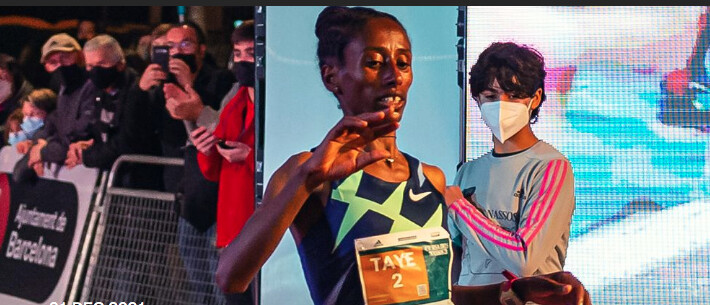
Twenty-year-old Aregawi, meanwhile, had come within one second of Joshua Cheptegei’s world record in Lille last month, so was keen to take another crack at the mark before the year was out to ensure he could end 2021 on a high.
With the women and men starting at the same time, Taye was able to use some of the men in the field as pacemakers. She opened up a clear gap on Sweden’s Meraf Bahta in the early stages and went on to win in 14:19, taking 24 seconds off the world record for the 5km in a mixed race. Bahta was second in 15:04.
Aregawi had a pacemaker for company for the first kilometre or so, but after then was out on his own. The Diamond League 5000m champion stormed through the finish line in 12:49, taking two seconds off Cheptegei’s world record. Peter Maru was a distant runner-up in 13:30.
(01/01/2022) ⚡AMP
by World Athletics
Kenyan Hellen Obiri, great star of the Nationale-Nederlanden San Silvestre Vallecana Internacional
The Kenyan athlete Hellen Obiri, double Olympic runner-up and 5,000 meter outdoor world champion, seeks to be crowned on December 31 at the Nationale-Nederlanden San Silvestre Vallecana International, being one of the favorites in the women’s category.
In 2018, in a record race, she could only be second after her compatriot Brigid Kosgei – current world marathon record holder -. Therefore, for this 2021, the objective is twofold: to climb to the top of the podium in the Vallecas Stadium, and snatch the record of the event from Kosgei, of 29:54.
Their biggest rivals for victory will be the trio of African athletes from the NN Running Team. The Ethiopians Degitu Azimeraw and Haven Hailu, and the Israeli Lonah Salpeter, will force Obiri to show his entire class if he wants to add this triumph to his extensive international record.
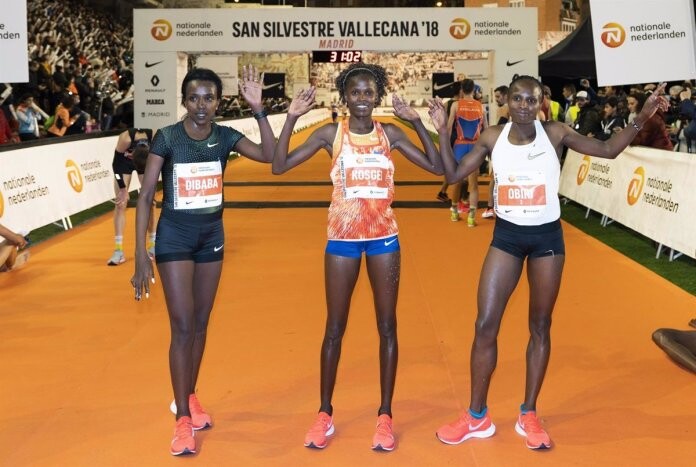
THE BEST SPANISH FUNDS WILL BE IN LA VALLECANA
Among the Spanish favorites, the Cantabrian Irene Pelayo is postulated as the best positioned. He arrives at the Nationale-Nederlanden San Silvestre Vallecana with the best marathon record of the season, with 2:29:16. In addition, you already know what it is to be the best national on December 31, with a seventh place and personal best in 10K in 2019 (32:46).
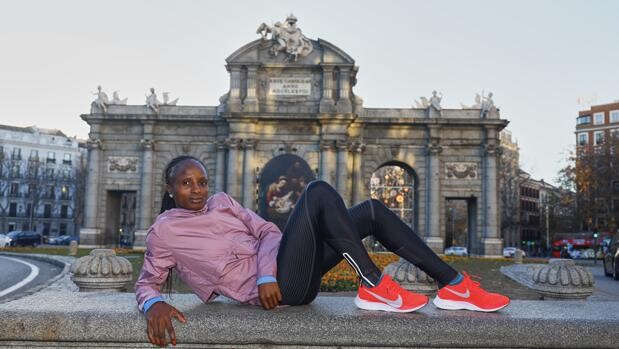
Laura Méndez is second in the national marathon ranking. The Valencian debuted in that distance in style, with 2:29:28, which earned her a place for the Tokyo Olympics. His best personal record in 10K is 33:01 achieved in Valencia in January 2020.
Another classic athlete in the test is the Olympian in Rio 2016 Azucena Díaz. A three-time national half-marathon champion, once a 10K champion, the 39-year-old veteran will not miss her appointment with Vallecas, where she came fourth in the 2017 edition with a time of 33:06.
But if we talk about the fastest in the test, Clara Viñarás can boast of having destroyed the 33-minute barrier. He did it last year in the 10K in Alcobendas with 32:42. With those credentials, and a best mark of the season of 34:49, we can expect the best of the Madrilenian, current national runner-up of 3,000 meters hurdles.
(12/28/2021) ⚡AMPby George Williams
San Silvestre Vallecana
Every year on 31st December, since 1964, Madrid stages the most multitudinous athletics event in Spain.Sport and celebration come together in a 10-kilometre race in which fancy dress and artificial snow play a part. Keep an eye out for when registration opens because places run out fast! The event consists of two different competitions: a fun run (participants must be...
more...Kenya’s Philemon Kiplimo and Ethiopia’s Gotytom Gebreslase win Bahrain Half Marathon
Ethiopia’s Gotytom Gebreslase and Kenya’s Philemon Kiplimo claimed victory at the Bahrain Royal International Night Half Marathon – a World Athletics Label road race – when the event returned for its second edition on Sunday (12).
After running 2:20:09 to triumph when making her marathon debut in Berlin in September, Gebreslase achieved another impressive result as she improved her half marathon PB to 1:05:36 in Manama to win by 11 seconds ahead of home favorite Kalkidan Gezahegne – the Olympic 10,000m silver medalist who was making her half marathon debut after breaking the world 10km record with 29:38 in Geneva in October.
The men’s race was much closer, with Kiplimo outsprinting his compatriot Collins Koros to the tape – both athletes recording a time of 1:00:01.
The women’s race had got off to a blistering start, with Gebreslase and Gezahegne both part of a group which passed the 5km mark in 14:53, well inside world record pace. The race also featured Kenya’s former world record-holder Ruth Chepngetich, who had run 1:04:02 in Istanbul in April and won October’s Chicago Marathon in 2:22:31, but she ran to around 17km in Manama and did not finish.
Following the fast start, Gebreslase and Gezahegne maintained their pace through 10km, with the clock showing 29:49 – four seconds off the split recorded by Ethiopia’s Letesenbet Gidey en route to the 1:02:52 women’s half marathon record she set in Valencia in October.
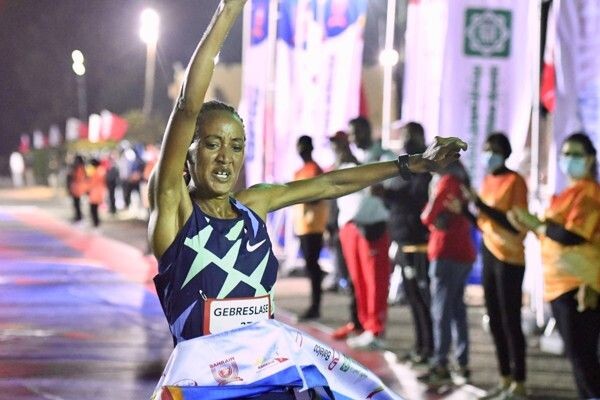
The wind had been behind them during the first half of the race and as they looped back the pace dropped, with Gebreslase passing 15km in 45:47 and Gezahegne following five seconds behind her. Chepngetich’s race came to an end a couple of kilometers later.
Gebreslase had increased her lead to 11 seconds by the finish, with the top two clear ahead of the rest of the field. Sheila Kiprotich secured third place in 1:07:01 and was followed by her Kenyan compatriots Irene Cheptai, who was four seconds back, and Daisy Cherotich, who ran 1:07:11, with a total of 11 athletes finishing inside 68 minutes.
Kiplimo led a Kenyan top five in the men’s race and had formed part of a lead group which followed the pacemakers through 5km in 13:58 and 10km in 27:35.
A seven-strong pack passed 15km in 42:24 and things remained close until the final stages, with Kiplimo edging ahead to deny Koros, and Mathew Kimeli finishing third just three seconds back.
Titus Mbishei finished fourth in 1:00:23, one second ahead of Geoffrey Koech, while Ethiopia’s Jemal Yimer was sixth in 1:00:29.
World Athletics, with assistance from Alberto Stretti
Leading results
Women1 Gotytom Gebreslase (ETH) 1:05:362 Kalkidan Gezahegne (BRN) 1:05:473 Sheila Kiprotich (KEN) 1:07:01 4 Irene Cheptai (KEN) 1:07:055 Daisy Cherotich (KEN) 1:07:11
Men1 Philemon Kiplimo (KEN) 1:00:012 Collins Koros (KEN) 1:00:013 Mathew Kimeli (KEN) 1:00:044 Titus Mbishei (KEN) 1:00:235 Geoffrey Koech (KEN) 1:00:24
(12/14/2021) ⚡AMPby World Athletics
Bahrain Night Half Marathon
The first-ever Bahrain Night Half Marathon was held in 2019 and the second in 2021. Bahrain Half Marathon is a golden opportunity for participants to pursue an active and healthy lifestyle. Make your health and wellness your life’s goal. The purpose of this marathon is not about winning or losing. It’s about being there and running together for one cause....
more...Five books to make you rethink your running
At moments, running can be a monotonous sport. The same routes traversed time and again over a long winter block of training. Sometimes all it takes to relight that fire is a good book.
Here are five that will inspire you to get the trainers on once more.

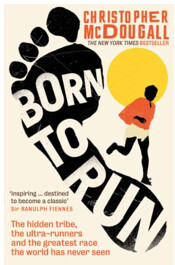
Out of Thin Air by Michael Crawley
Michael Crawley is a talented marathon runner who has competed internationally for Scotland, but it was his trip to Ethiopia that made him fall back in love with the sport. Living with some of the nation’s best athletes, Crawley provides a fascinating insight into one of running’s most fabled heartlands.
From travelling to altitudes where it is difficult to breathe all in search of almost mythical mountain air, to zig-zag runs through dense forests, Crawley introduces us to the almost spiritual association Ethiopia has with the sport.
An awe-inspiring, uplifting read, Out Of Thin Air will bring purpose to those daily runs and a spring in the step for anyone hoping to follow in their footsteps.
Coasting by Elise Downing
Elise Downing’s book starts with the familiar conundrum. A university graduate finding her feet in the working world, Downing faces up to the reality of what her future holds. Her solution, however, is not the typical.
Deciding to run the coast of Britain, Coasting follows her journey round the nation’s shores. It charts the highs and lows of the entire 5000-mile journey, the people she meets along the way and the truths she discovers about herself.
Coasting serves a fitting reminder of how running can provide a great platform to unwind your thoughts, to reflect and ultimately to move forward in a better place than when you headed out the door.
Born to Run by Christopher McDougall
An injury to his foot has McDougall in pursuit of a fix. But in searching for an answer, the author draws us to what many see as the birthplace of North American endurance: the Tarahumara tribe and their incredible ultra-running exploits.
The book follows McDougall in his attempt to complete a 50-mile race in Tarahumara territory and sees him try to answer how humans are capable of such extraordinary feats.
A mixture of high-level sports science and nostalgic romanticism will see you plodding along wondering whether you were born to do this.
Feet in the Clouds by Richard Askwith
Richard Askwith is, by his own admission, no fell-running superstar but his book on the sport provides a compelling illustration of just why so many find the sport so special. One in which the sport’s best and the rest face the same trials and tribulations.
Along his journey trying to complete the Bob Graham Round, a fell-running endurance challenge in the UK’s Lake District, Askwith tells the story of fell-running’s understated stars.
If a book can summarise what it means to be out on the fells, plotting your path, this is probably it.
Feet in the Clouds will have you searching for the tallest hill and making it your mission to climb it.
The Passion Paradox by Brad Stulberg & Steve Magness
In pursing your running goals, it can often feel like you lose balance in your life. When you don’t quite achieve what you are looking for, then it can have a big impact on how you feel. Not just about your running but also about your self-worth.
Stulberg and Magness tackle the notion of passion, how it is important for success but how it needs to be harnessed so as to avoid becoming something obsessive. They talk about the warning signs, how an element of imbalance is necessary but ultimately how you can channel it to your advantage.
Although this book isn’t just about running, it is for all those who feel they’re stuck in a rut and looking for something to freshen up their perspective to their passions.
(12/12/2021) ⚡AMPby World Athletics
Eliud Kipchoge would like to become first athlete to three-peat in the Olympic marathon
World Athletics sat down with the marathon world record holder and double Olympic marathon champion Eliud Kipchoge, to reflect on his great career. Kipchoge cited his previous Abbott World Major Marathon wins, his world record and running the first sub-two-hour marathon (unofficially) as things he joyfully looks back on.
When asked about his future goals, he said he wants to become the first athlete ever to win three straight Olympic gold medals in the marathon.
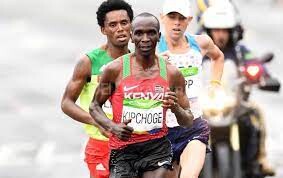
“My goal going into the 2020 games was to win back-to-back Olympic golds, and I’d like to win the third one,” Kipchoge said to World Athletics. He also mentioned other goals on his running bucket list, such as running all six Abbott World Marathon Majors and lowering his half marathon personal best.
If Kipchoge defends his title at the 2024 Paris Olympics, he would become the first-ever athlete to three-peat. Currently, he is in an exclusive club of three, the other two athletes being Abebe Bikila of Ethiopia (who won gold at both the 1960 and 1964 Games) and Waldemar Cierpinski of East Germany (who won gold at the 1976 and 1980 games, but it’s been highly speculated that he was part of East Germany’s state-sponsored doping program during the 1970s).
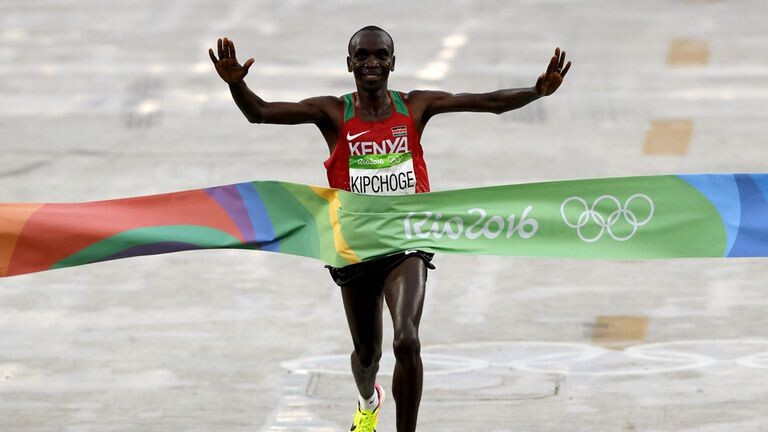
When he was asked about giving the world record another shot, Kipchoge said, “There are many people who could break my marathon world record. I think Geoffrey Kamworor will one day break the world record. Joshua Cheptegei will also make his mark in the marathon, and Kenenisa Bekele is still there.”
As his 2021 season comes to an end, Kipchoge isn’t sure of his 2022 race plans. “I always strive to improve my fitness, and I approach it like education. For example, if you have an exam in two years, you have to plan carefully for it to have success.”
(12/10/2021) ⚡AMPby Marley Dickinson
Paris 2024 Olympic Games
For this historic event, the City of Light is thinking big! Visitors will be able to watch events at top sporting venues in Paris and the Paris region, as well as at emblematic monuments in the capital visited by several millions of tourists each year. The promise of exceptional moments to experience in an exceptional setting! A great way to...
more...Lawrence Cherono receives State Award
Recently crowned Valencia Marathon champion Lawrence Cherono has urged young athletes to work hard and be patient, and success will come their way.
Speaking in Kabarnet, Baringo County while receiving his Head of State Commendation through the County Commissioner Henry Wafula, the 2020 Tokyo Games Olympiad, said he trained for many years before breaking into the limelight.
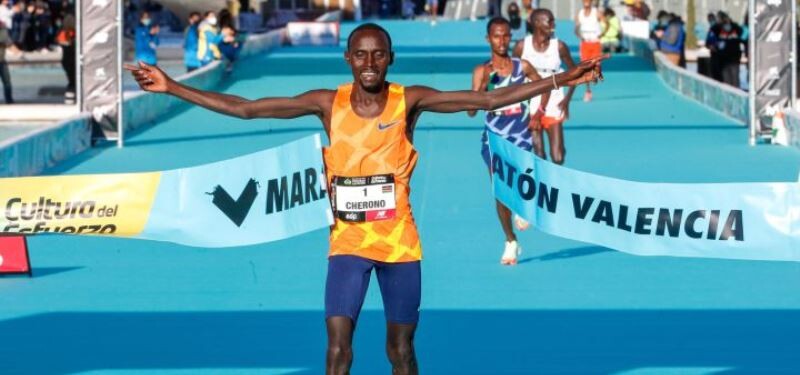
“I want to thank President Uhuru Kenyatta for the award I have received. I also want to encourage upcoming athletes to continue training hard because in athletics, one might take long before excelling," said Cherono.
“In my case, it took me five years to get on the podium and 10 years to be in the national team,” the 33-year-old runner said.
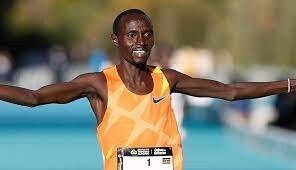
Cherono donned the Kenyan colours for the first time at the Tokyo 2020 Olympic Games where he finished fourth in the men’s marathon race in Sapporo.
He was one of the athletes honoured by President Kenyatta on Mashujaa Day.
Cherono, who trains under the Rosa Associati Management, is currently ranked as the eighth fastest marathoner of all time in the world.
He has won a couple of major marathons including Chicago and Boston and was recently crowned the Valencia Marathon champion.
The Kaptagat-based athlete on Sunday timed 2 hours, 05 minutes and 12 seconds ahead of Ethiopia’s Chalu Deso who was second in 2:05:16 while Kenya’s Philemon Kacheran finished third place in 2:05:19.
The women category saw Nancy Jelagat cross the line in 2:19:31 ahead of Ethiopians Woldu Etagegne (2:20:16) and Degefa Beyenu (2:23:04) who came in second and third respectively.
Cherono, who won the 2019 Boston and Chicago marathons, said that he will be taking the Christmas break as he waits for his manager to decide on which races he will feature in next year.
Wafula asked upcoming athletes to emulate Cherono by working hard and focusing on their careers for better results.
“Cherono is a good example to youth who are training in this region and they should follow his example because nothing comes easy,” said Wafula.
(12/09/2021) ⚡AMPby Bernard Rotich
VALENCIA TRINIDAD ALFONSO
The Trinidad Alfonso EDP Valencia Marathon is held annually in the historic city of Valencia which, with its entirely flat circuit and perfect November temperature, averaging between 12-17 degrees, represents the ideal setting for hosting such a long-distance sporting challenge. This, coupled with the most incomparable of settings, makes the Valencia Marathon, Valencia, one of the most important events in...
more...Cherono, Jelagat dominate Valencia Marathon
In the women's category, Jelagat won her first-ever marathon, clocking 2:19:31 as Ethiopia's Woldu Etagene came second in 2:20:16
The win by Cherono in the Spanish city comes after victories in Chicago and Boston in 2019, Amsterdam Marathon in 2018 and 2017, Honululu in 2017, Czech in 2016 and Sevilla in 2015.
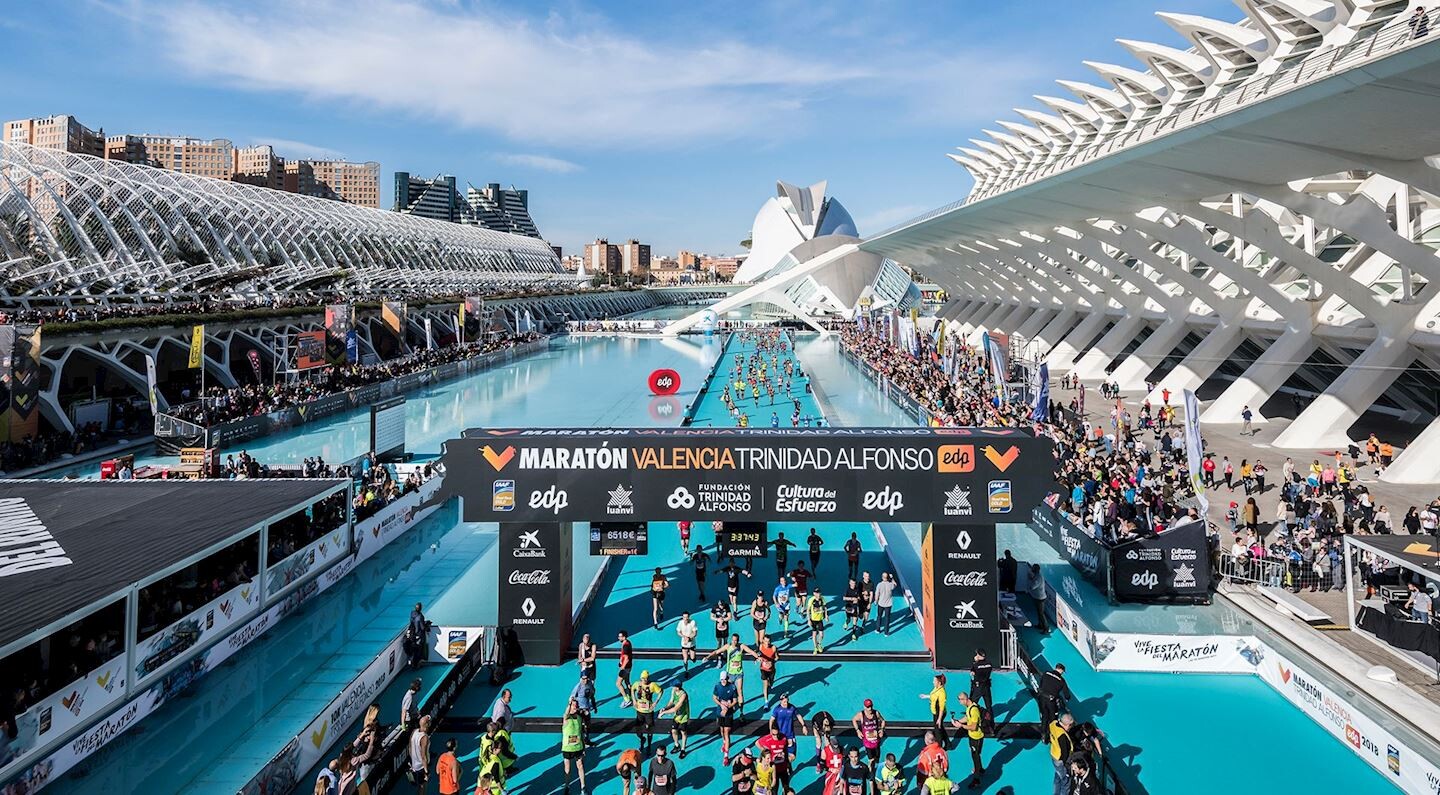
•Cherono clocked 2:05:12 to fend off Ethiopian Deso Chalu (2:05:16) in a sprint finish while Philemon Kacheran rounded off the podium positions by posting 2:05:19.
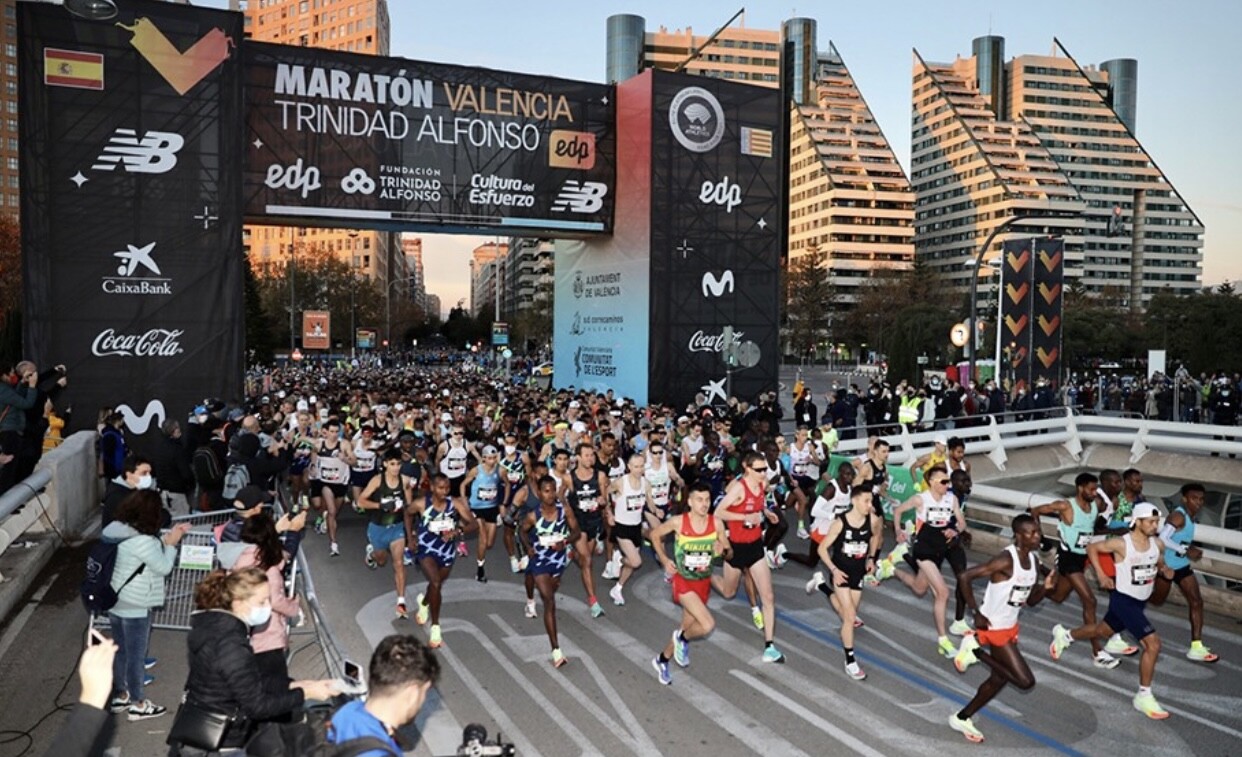
Lawrence Cherono and Nancy Jelagat secured a Kenyan double at the Valencia Marathon on Sunday.
Cherono clocked 2:05:12 to fend off Ethiopian Deso Chalu (2:05:16) in a sprint finish while Philemon Kacheran rounded off the podium positions by posting 2:05:19. Former winner Geoffrey Kamworor finished fourth in 2:05:23.
The win by Cherono in the Spanish city comes after victories in Chicago and Boston in 2019, Amsterdam Marathon in 2018 and 2017, Honululu in 2017, Czech in 2016 and Sevilla in 2015.
In the women's category, Jelagat won her first-ever marathon, clocking 2:19:31 as Ethiopia's Woldu Etagene came second in 2:20:16 with compatriots Degefa Beyenu (2:23:04) and Tusa Rahma (2:23:20) finishing third and fourth respectively.
Fionnuala McCormack of Ireland completed the top five positions in 2:23:58
(12/05/2021) ⚡AMP
Former Boston Marathon Lawrence Cherono will be leading Kenyan charge in Valencia Marathon
Former Boston Marathon Lawrence Cherono will be leading an elite field during this years’ Valencia Marathon in Spain on Sunday, a race which is considered to have one of the fastest courses.
According to Cherono, he has had good training and is looking forward to running well after a good recovery for the last two months.
He will be aiming to win the race after he was narrowly beaten last year by Evans Chebet who sprinted in the last 50 metres to bag victory in 2:03:00 with Cherono registering his personal best of 2:03:04. Ethiopia’s Birhanu Legese came third after timing 2:03:16.
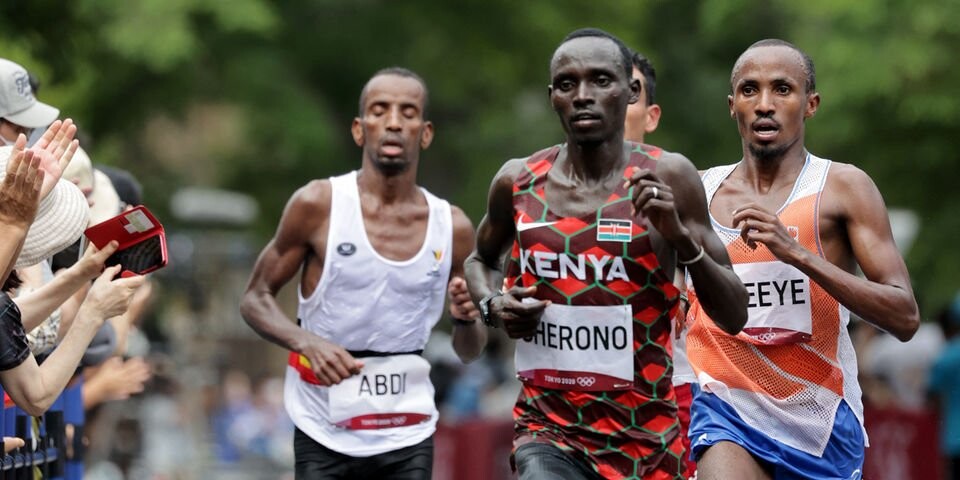
“I have recovered well after participating in the 2020 Olympic Games and went straight to camp to prepare for this race. It is competitive but I believe I will be able to run well on Sunday,” said Cherono who did not defend his Chicago and Boston Marathons races this year.
Also in the race is Geoffrey Kamworor who is seeking a comeback after some time out of competition due to an injury he suffered when he was knocked down by a speeding motorcycle in Eldoret, Uasin Gishu County in June last year.
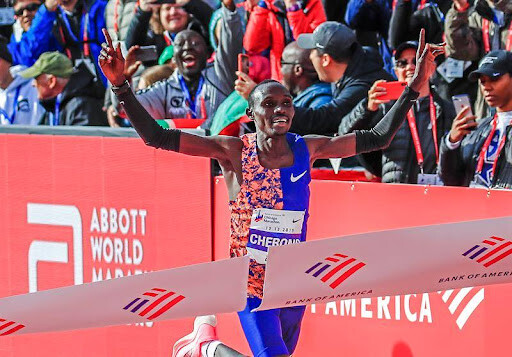
Dr. Victor Bargoria who treated Kamworor then told Nation Sport that he had fractured his tibia and had bruises in his head, something that forced him to take a break from competition.
Kamworor also missed the Olympic Games despite making the team in the 10,000m race after he was advised by his doctor to recover fully before competing again.
The two-time World Half Marathon champion who is fondly referred to as ‘man of all surfaces’ due to his good performance in track, cross country, road races and marathon will be looking to pull another surprise when he competes in Spain.
Cherono, who has the fastest time of 2:03:04 in the elite field will be battling it out with Ethiopians Herpasa Negasa (2:03:40), Kinde Atanaw (2:03:51) and Abebe Negewo (2:04:51), Chalu Deso (2:04:53).
Also in the lineup are Kenyans Philemon Kacheran (2:06:05) who also trains with Kamworor in Kaptagat, Michael Kunyuga (2:06:43), Alex Kibet (2:07:09), Bethwell Kipkemboi (2:07:41) and Japheth Kosgei (2:08:08).
Turkey's Polat Kemboi (2:08:14), Belgium’s Koel Naert (2:07:39), Eritrea’s Goitom Kifle (2:08:09) are the other notable competitors.
In the women's category, 2018 Prague Marathon champion Bornes Chepkirui will be battling it out with other athletes notably Uganda’s record-holder Juliet Chekwel and three-time Rome Marathon champion Rahma Tusa of Ethiopia.
Dorcas Tuitoek, who will be debuting during the race will also be looking to shine having trained with Olympics marathon champion Peres Jepchirchir in Kapsabet, Nandi County.
(12/04/2021) ⚡AMPby Bernard Rotich
VALENCIA TRINIDAD ALFONSO
The Trinidad Alfonso EDP Valencia Marathon is held annually in the historic city of Valencia which, with its entirely flat circuit and perfect November temperature, averaging between 12-17 degrees, represents the ideal setting for hosting such a long-distance sporting challenge. This, coupled with the most incomparable of settings, makes the Valencia Marathon, Valencia, one of the most important events in...
more...Kamworor aims to conquer Valencia
The Valencia Marathon Trinidad Alfonso EDP, a World Athletics Elite Platinum Label event, will return on Sunday (5) and as usual, the organizers have brought together a mouth-watering line-up, headed by Kenya’s Geoffrey Kamworor.
The city of Valencia has witnessed a number of world records in recent years – at 5000m, 10,000m, 10km, and the half marathon – and organizers aim for Valencia to be the epicenter of the running world again this Sunday.
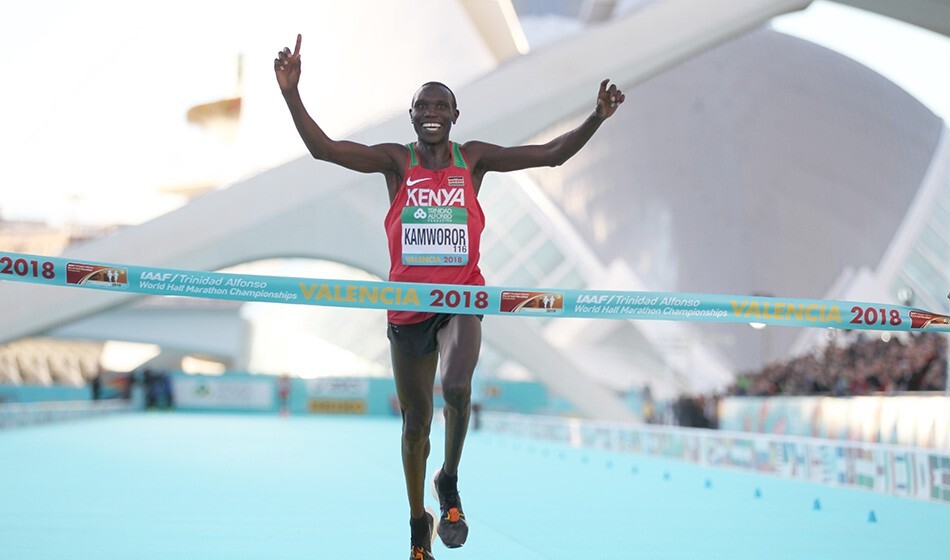
Undoubtedly, all eyes are on the three-time world half marathon champion Kamworor, who turned 29 last month. The Kenyan ace is now fully recovered from the injury which prevented him from competing at the Tokyo Olympics and his last outing was a promising 27:01.06 10,000m at the altitude of Nairobi during the Kenyan trials before he got injured. Once recovered, the two-time world cross country champion focused exclusively on his build-up for Valencia, where he should far improve his relatively modest 2:06:12 lifetime best set on his debut in Berlin back in 2012.
Kamworor has great memories of Valencia, as he became a commanding world half marathon champion in the city back in 2018. “Valencia is the city of running, the atmosphere is special,” he said. “I managed to be world champion here, I know the circuit is incredibly fast and definitely it’s a great opportunity to record a quick time.”
Reflecting after the injury, Kamworor's coach, Patrick Sang, said: “To me, Geoffrey came back stronger physically but also mentally. He is a more professional athlete now. I do not set any target for athletes like Geoffrey, or any other athlete actually, because setting targets is putting pressure. I believe that serious athletes like them, they have the willingness to give their best and that’s always what we should ask from them."
The course record is the goal
A large group of pacemakers – headed by Alexander Mutiso, Bernard Ngeno, and Victor Chumo – will target a steady 2:55 pace to go through the half marathon in 1:01:30, on schedule to break the course record of 2:03:00 set last year by Kenya’s Evans Chebet.
Kenya’s Lawrence Cherono should be one of Kamworor’s stiffest opponents. The 33-year-old was runner-up last year in a career best of 2:03:04 and finished just outside the medals at the Tokyo Olympics with a fourth-place to his credit.
The Ethiopian contingent is also strong as it comprises four athletes to have dipped under the 2:05:00 barrier during their careers: Herpasa Negasa, Kinde Atanaw, Abebe Negewo and Chalu Desu. The former boasts a 2:03:40 PB set in Dubai in 2019 but he has barely competed since then, while Atanaw took the victory in Valencia in 2019 thanks to a 2:03:51 performance, although he could not go faster than 2:11:00 in his only appearance so far this season in Prague.
As for Desu, he finished sixth last year and will be looking to bounce back after a below-par outing in Chicago two months ago, while Negewo, eighth in 2020, will be making his debut at any distance this year. The other sub-2:05 athlete on show is Tanzania’s Gabriel Geay, who ran 2:04:55 in Milan last May and is fresh from a season’s best of 1:00:16 at the Valencia half marathon six weeks ago. Watch out too for Ethiopian debutante Andamlak Belihu, a 58:54 half marathon performer.
Germany’s Amanal Petros, who has a lifetime best of 2:07:18, recently set a national half-marathon record of 1:00:09, also in Valencia, and Norway’s former European record-holder (2:05:48) Sondre Moen, who ran 1:00:15 on that occasion, also promises a fast time over the classic distance on Sunday. Spain’s Hamid Ben Daoud will attack the Spanish record of 2:06:52 following his half marathon PB of 1:01:05 here.
Wide open women’s contest
The women’s cast is led by Ethiopia’s Guteni Shone, holder of a career best of 2:20:11 set in Dubai a couple of years ago, while her season’s best is 2:21:46 to finish runner-up in Prague in May. The 30-year-old will be joined by her compatriots Azmera Gebru, who races her second marathon this year after clocking 2:22:58 in Tokyo in March; Bedatu Hirpa, owner of an identical time in Prague earlier this year; and Rahma Tusa, whose PB stands at 2:23:46.
The Kenyan squad includes 2:21:26 athlete Bornes Kitur, who ran barely six weeks ago in Rotterdam and will be eager to bounce back from her 2:30:41 clocking there, plus debutante Dorcas Tuitoek, a 1:06:33 half marathon specialist, and Nancy Jelagat, holder of a quick 1:05:21 clocking in the shorter distance.
Ugandan record-holder Juliet Chekwel won the Seville Marathon last year in a career best of 2:23:13 and should be a dangerous outsider on Sunday. While the course record of 2:17:16 set by Kenya’s Olympic champion Peres Jepchirchir last year doesn’t seem to be in jeopardy, organisers have planned a sub-70-minute split for the half marathon in the hunt for a sub-2:20 performance.
The weather looks set to be sunny but very windy, with the thermometer reaching 10-12ºC by the time of the event.
(12/04/2021) ⚡AMPOmicron variant complicates travel home for Canadian ultrarunners Remi Poitras and Jean-Francois Cauchon in South Africa
Running 100 kilometers was something Remi Poitras always wanted to accomplish, so when he had the chance to compete at the Ultra-Trail Cape Town 100K last weekend in South Africa, he could not pass up the opportunity.
Poitras finished 26th out of the 237 runners who started the race, in 13:26:56. Although he had a great result in his 100K debut, the toughest part for Poitras has been trying to get home.
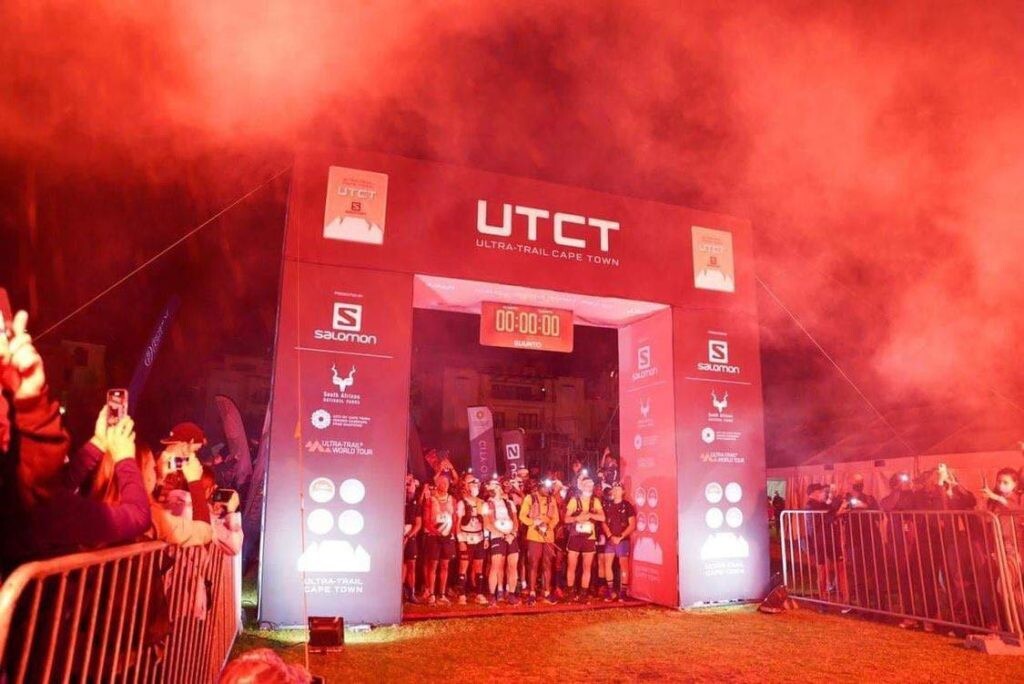
Poitras, a Moncton, N.B., native, always wanted to visit Cape Town to race internationally, but when he found out that international borders were closed to tourists, he was stuck in South Africa with fellow Canadian ultrarunner Jean-François Cauchon, who finished sixth overall at UTCT, seeking answers.
“In Cape Town, I didn’t notice anything out of the usual regulations we had in Canada,” Poitras says. “Locals were more concerned about the closures of the tourism industry.”
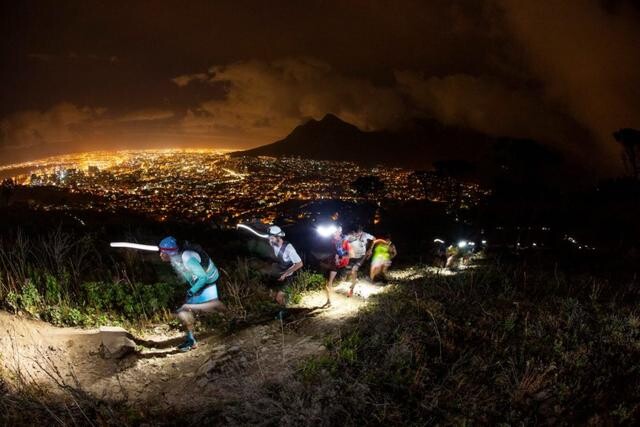
Since there are no direct flights to Canada from South Africa, there are only a few ways to travel. One option is to travel through Europe, but many major airlines such as Air France and KLM have stated that they will carry EU passengers only. The only city in North America that connects with Johannesburg is Atlanta, Ga., but again, U.S. citizens only. Another option to get back to Canada is to fly through Addis Ababa, Ethiopia, a country currently dealing with a civil war between the government and rebel groups.
Flights out of South Africa have reached high prices for tourists, and the airports are packed with tourists from Europe and North America looking to get home. “I tried connecting with the Canadians Abroad emergency hotline to see what they know and what they could do,” says Poitras. “After six days of no news or communication from the Canadian government, I decided to take matters into my own hands and book a flight to London.”
Unfortunately, there aren’t many PCR testing centres in South Africa, yet both Canada and Great Britain require negative results upon entry. “Keeping us all here is only prolonging our exposure,” says Poitras. “Everyone is scrambling trying to find a way home, the government isn’t helping us.”
Update: On Dec. 2, Cauchon and Poitras left South Africa on a flight to London, England, where they both await the results of their PCR tests to return to Canada. Poitras looks back on his first Ultra-Trail race as an unbelievable experience and hopes to conquer more ultras in 2022.
(12/03/2021) ⚡AMPby Marley Dickinson
Kenyan Geoffrey Kamworor faces tough test on fast course in Valencia
Kenyan leads strong line-up in the marathon on Sunday and judging by past results we are likely to see some very fast times
Geoffrey Kamworor believes he can break the world marathon record in future and possibly dip inside two hours. This Sunday (Dec 5) should offer clues as to whether he’s correct when he takes on a strong field on a super-fast course in Valencia.
The Maraton Valencia Trinidad Alfonso EDP takes place in a Spanish city that has hosted a number of record-breaking distance running performances lately. Before he thinks about getting close to Eliud Kipchoge’s world marathon record of 2:01:39, though, Kamworor must first win the race – and it won’t be an easy task.
Kamworor’s marathon best is “only” 2:06:12 but that dates back to 2012. In recent years he has focused on the New York City Marathon – which has no pacemakers and a slowish course – and which he has won in 2017 and 2019.
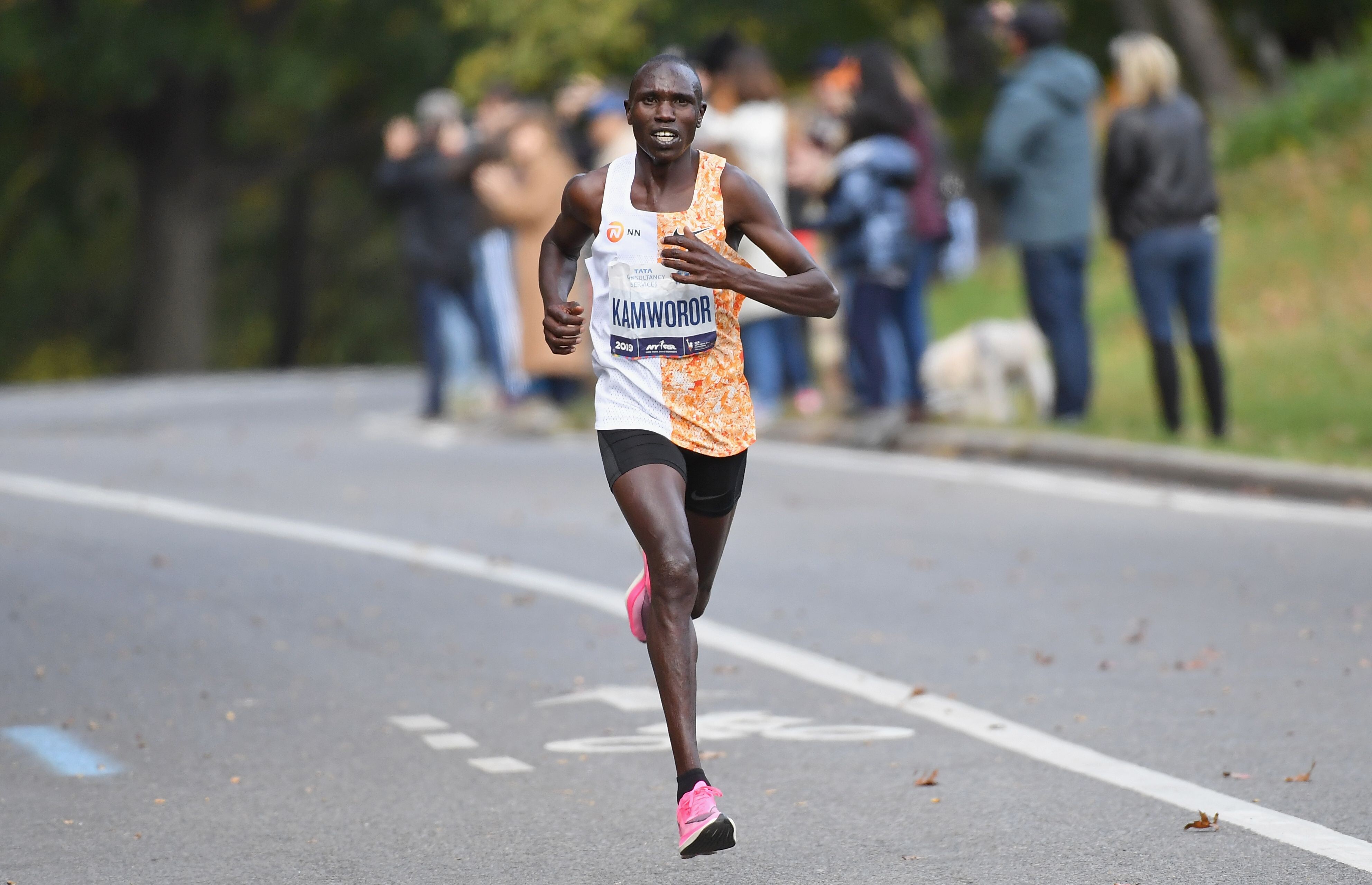
Kamworor is also a former world cross-country winner and has a good record in Valencia, as he won his third world half-marathon title in the city in 2018. When it comes to marathon potential, he will no doubt be comparing his fitness to training partner Kipchoge – as they are coached by the same man, Patrick Sang – although the 28-year-old is also on the comeback from a car accident last year.
“I have big dreams and ambitions in the marathon and want to run as fast as possible and break barriers,” he says. “Valencia will be ready to help us push our limits on race day and I am sure it will be amazing.”
Facing him in the marathon on Sunday are fellow Kenyan Lawrence Cherono, a former winner of the Boston and Chicago marathons with a best time of 2:03:04, which makes him the fastest in the field.
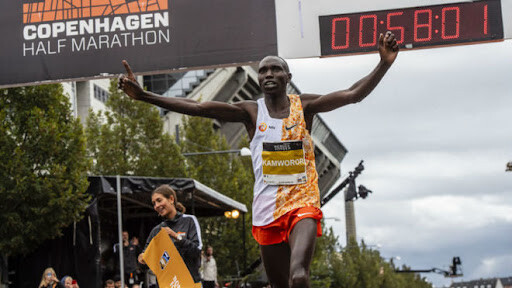
There is also Kinde Atanaw of Ethiopia, who won the Valencia Marathon in 2019 in 2:03:51 and was poised to run in London in October but had to withdraw after a positive Covid test.
In addition there is Herpasa Negasa of Ethiopia, who has a best of 2:03:51, another Ethiopian, Chalu Deso, who has a PB of 2:04:53, Tanzanian 2:04:55 man Gabriel Geay and Sondre Moen of Norway – the latter of whom held the European record until 2019.
Altogether there are three men who have run sub-2:04:00 and eight who have broken 2:06:00, which makes Kamworor only the 10th fastest in the field based on PBs.
The women’s field is not quite as strong, but is led by 2:20 performers Guteni Shone and Asmera Gebru of Ethiopia plus 2:21 runners Bornes Chepkirui of Kenya and Bedatu Hirpa of Ethiopia. Watch out too for Nancy Jelagat, who has a 65:21 half-marathon PB.
Sonia Samuels, Alice Wright and Norman Shreeve are among almost 500 British runners in the race, although the 16,000-strong field is of course dominated by more than 9000 runners from Spain. Samuels has a best of 2:28:04 but is now 42, whereas the US-based Wright is aiming to finish her first marathon.
There is a strong Irish contingent too which includes 2:26:47 runner Fionnuala McCormick, who ambitiously plans to run the European Cross Country Championships seven days later in Dublin.
The race is also taking place for the 41st time. The first race in 1981 was won by Teodoro Perez in a modest 2:57:55 with Nuria de Miguel the first woman home in 3:20:50.
After those humble beginnings the winning times began to improve rapidly, though, and in 1984 Vicente Anton won in 2:14:01 and the women’s winner Juana Pablos Acosta was inside three hours with 2:57:28.
Now in the era of super-shoes, the last four editions have been won in 2:05:15 (Sammy Kithara), 2:04:31 (Leul Gebresilase), 2:03:51 (Atanaw) and 2:03:00 (Evans Chebet) in an elite-only race minus the masses in 2020.
The last two women’s title, meanwhile, have gone to Roza Dereje in 2:18:30 in 2019 and Peres Jepchirchir with 2:17:16 in 2020. The latter of course went on to win the Olympic title this year.
(12/02/2021) ⚡AMPby Jason Henderson
VALENCIA TRINIDAD ALFONSO
The Trinidad Alfonso EDP Valencia Marathon is held annually in the historic city of Valencia which, with its entirely flat circuit and perfect November temperature, averaging between 12-17 degrees, represents the ideal setting for hosting such a long-distance sporting challenge. This, coupled with the most incomparable of settings, makes the Valencia Marathon, Valencia, one of the most important events in...
more...Kotut and Maru claim marathon crowns in Florence
Kenya’s Cybrian Kotut and Ethiopia’s Tsehay Alemu Maru took the honours at the 37th edition of the Asics Firenze Marathon, a World Athletics Label road race, on Sunday (28).
Kotut crossed the finish line in 2:08:59, recording the second fastest time in the history of the Florence Marathon. The 29-year-old missed James Kutto’s course record by 17 seconds. Samuel Lomoi from Kenya finished second, improving his PB from 2:12:14 to 2:09:54. Olivier Irabaruta from Burundi completed the podium, taking third place in 2:10:13 ahead of former Eritrean record-holder Oqbe Kibrom Ruesom.
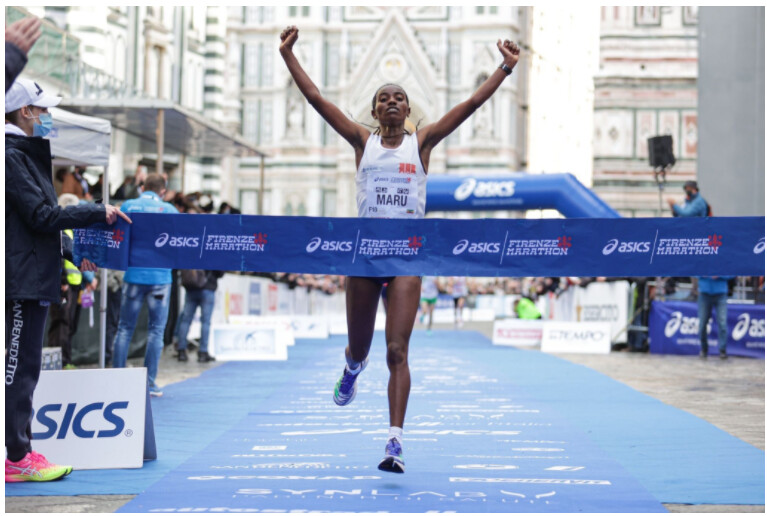
The leading pack – featuring Kotut, Salomon Soy, Lomoi, Irabaruta and Ruesom – set off at a conservative pace in the early stages of the men’s race and went through 10km in 31:16, 15km in 46:27 and 21km in 1:05:09.
The race really started at 30km, when three runners – Lomoi, Kotut and Kibrom – remained in contention. The leading trio reached the 30km mark in 1:31:48.
Lomoi and Kotut made the decisive move at 35km and ran neck and neck until 40km. Kotut launched his final sprint with 2km to go to win by 55 seconds over Lomoi.
Kotut won the Paris Marathon in 2016 in 2:07:11 and finished third in Frankfurt in 2:07:28 in the same year. He also set a half-marathon PB of 59:12 in New Dehli in 2012.
In the women’s race, Maru set the fourth fastest time in the history of the women's event in Florence with 2:27:17, beating her compatriot Megertu Ifa Geletu by four seconds. Kenya’s Mercy Kwambai finished third in 2:27:32 ahead of Morocco’s Souad Kabouchia (2:27:49).
Six runners were still in contention until 35km: Naomi Tuei, Maru, Flomena Cheyech Daniel, Kwambai, Geletu and Obse Abdeta Deme. They went through 15km in 51:53, 21km in 1:13:14, 30km in 1:44:42 and 35km in 2:02:41, with four runners left in the leading group at 40km.
Maru and Geletu ran together over the final 2km in a close race, while Deme and Tuei dropped back. Alemu unleashed her kick in the final kilometre to win in 2:27:17, as four women dipped under 2:28 for the first time at the Florence Marathon. Geletu with 2:27:21 and Kwamboi with 2:27:32 joined Maru in setting personal best times.
(11/28/2021) ⚡AMPFirenze Marathon
This is Firenze (Florence) Marathon! Along the way you will be surrounded by centuries of art, history and culture, a unique emotion that can only be experienced by those who run in Florence. Thousands of sports people and enthusiasts from all over the world come to participate in this classic race on the last Sunday in November. The route takes...
more...Ethiopia's Haile Gebrselassie and Feyisa Lilesa ready to join Tigray war
Ethiopian Olympic heroes Haile Gebrselassie and Feyisa Lilesa say they are ready to go to the front line in the war against rebel forces.
Their announcement comes after Prime Minister Abiy Ahmed said he would go to the front to lead the war.

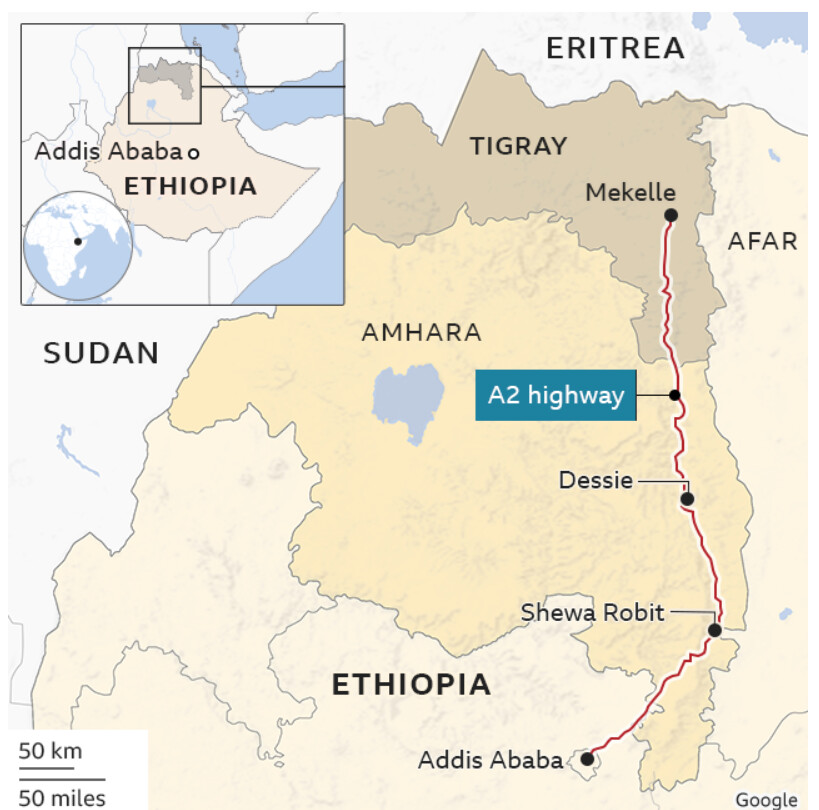
Tigrayan rebels say they are advancing towards the capital Addis Ababa.
The UK has urged its nationals to leave Ethiopia immediately, saying the fighting may move closer to Addis Ababa in the coming days.
The rebels earlier this week said that they had taken control of Shewa Robit, a town about 225km (140 miles) north-east of Addis Ababa. There is no independent confirmation of the claim.
Communication Minister Legese Tulu said the military has had "many successes" since Mr Abiy's decision to lead the battle, and victory was "so close".
Earlier, Gebrselassie, 48, was quoted by state television as saying: "I am ready to do whatever is required of me, including going to the front line."
Gebrselassie is regarded as a legend in Ethiopia, and his comments were seen as an attempt to rally public support behind the war effort.
During his 25-year career as an athlete, he claimed two Olympic gold medals, eight World Championship victories and set 27 world records. He announced his retirement from competitive running in 2015.
Expressing his support for the war, Feyisa, 31, was quoted by the state-affiliated Fana Broadcasting Corporation website as saying that he was ready to draw inspiration from the "gallantry of my forefathers" and go to the front line to "save my country".
The athlete won the marathon silver at the 2016 Rio Olympics.
He became famous for holding up his crossed wrists as if they were shackled to draw global attention to the crackdown on demonstrators demanding political reforms in Ethiopia.
The Tigray People's Liberation Front (TPLF) was the dominant party in government at the time. Following the protests, Mr Abiy became prime minister and the TPLF lost the grip on the country it had held for 27 years.
It later retreated to its stronghold of Tigray, from where it launched a rebellion last November after a huge fall-out with Mr Abiy over his reforms.
The war has created a massive humanitarian crisis, leaving thousands dead, forcing millions from their homes, and several hundred thousand in famine-like conditions as aid agencies battle to get food in war-affected areas.
The African Union is leading efforts to find a negotiated end to the fighting, but neither side has committed to talks.
The TPLF are advancing towards Addis Ababa on the A2 highway.
On Tuesday, Germany and France advised their citizens to leave Ethiopia.
The prospect of some of Ethiopia's most venerated sporting figures heading to the front lines to fight captures something profound and powerful about the mood in Addis Ababa and beyond.
At a time of intense crisis, many Ethiopians are clearly rallying behind their flag and prime minister, and are keen to play their part in galvanising public support for a military campaign that has suffered undeniable setbacks in recent months, though much remains in dispute in terms of casualty figures and battlefield momentum.
It is clear many people see the military threat posed by the TPLF and their assorted allies as an existential one for Ethiopia.
Added to that is a profound dislike of the TPLF itself, which stems from its decades heading an authoritarian national government. But there is more to it than that.
The prime minister has sought to portray his country as a victim, not just of Tigrayan aggression, but of a vast international conspiracy designed to weaken Ethiopia and punish it for, allegedly, challenging Western colonial interests on the continent.
Western media are portrayed as enthusiastic backers of that conspiracy theory - one which appears to have gained widespread credibility in a country struggling to explain how the rebel group could have made such startling headway.
(11/27/2021) ⚡AMP
by BBC
Ethiopia's Haile Gebrselassie and Feyisa Lilesa ready to join Tigray war
Ethiopian Olympic heroes Haile Gebrselassie and Feyisa Lilesa say they are ready to go to the front line in the war against rebel forces.
Their announcement comes after Prime Minister Abiy Ahmed said he would go to the front to lead the war.
Tigrayan rebels say they are advancing towards the capital Addis Ababa.
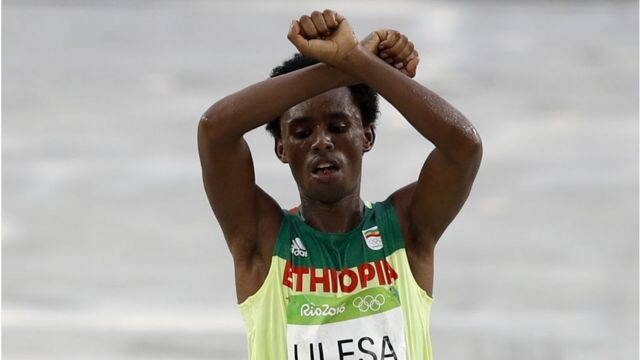
Germany and France have become the latest countries to advise their citizens to leave Ethiopia, amid an escalation in the civil war.
On Tuesday, US envoy to the region Jeffrey Feltman warned that tentative diplomatic progress towards ending the conflict was being jeopardised by alarming developments on the ground.
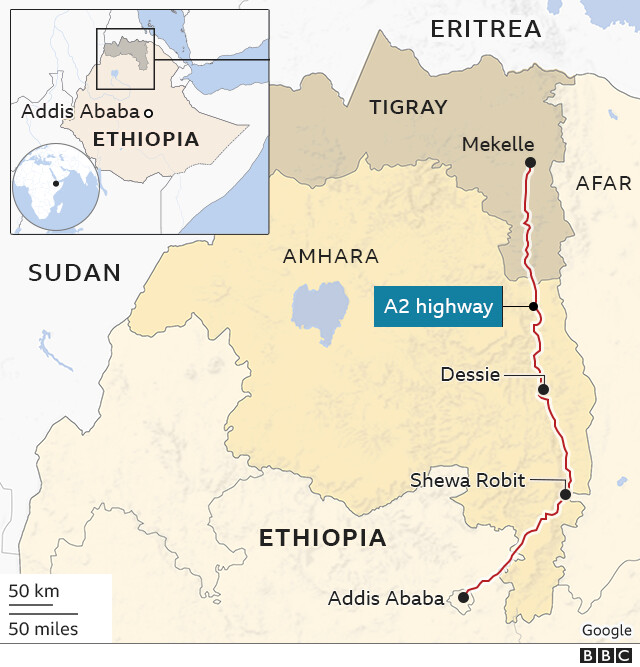
The rebels earlier this week said that they had taken control of Shewa Robit, a town about 225km (140 miles) north-east of Addis Ababa. There is no independent confirmation of the claim.
Communication Minister Legese Tulu said the military has had "many successes" since Mr Abiy's decision to lead the battle, and victory was "so close".
With Mr Abiy gone to direct the war effort, his deputy, Demeke Mekonnen Hasse, had taken charge of routine government business, a spokesman was quoted by state-linked media as saying.
Mr Abiy's announcement has bolstered recruitment for the army, with hundreds of new recruits attending a ceremony, marked by patriotic songs, in Addis Ababa on Wednesday.
Communication Minister Legese Tulu said the military has had "many successes" since Mr Abiy's decision to lead the battle, and victory was "so close".
Earlier, Gebrselassie, 48, was quoted by state television as saying: "I am ready to do whatever is required of me, including going to the front line," he said.
Gebrselassie is regarded as a legend in Ethiopia, and his comments were seen as an attempt to rally public support behind the war effort.
During his 25-year career as an athlete, he claimed two Olympic gold medals, eight World Championship victories and set 27 world records. He announced his retirement from competitive running in 2015.
Expressing his support for the war, Feyisa, 31, was quoted by the state-affiliated Fana Broadcasting Corporation website as saying that he was ready to draw inspiration from the "gallantry of my forefathers" and go to the front line to "save my country".
The athlete won the marathon silver at the 2016 Rio Olympics.
He became famous for holding up his crossed wrists as if they were shackled to draw global attention to the crackdown on demonstrators demanding political reforms in Ethiopia.
The Tigray People's Liberation Front (TPLF) was the dominant party in government at the time. Following the protests, Mr Abiy became prime minister and the TPLF lost the grip on the country it had held for 27 years.
It later retreated to its stronghold of Tigray, from where it launched a rebellion last November after a huge fall-out with Mr Abiy over his reforms.
The war has created a massive humanitarian crisis, leaving thousands dead, forcing millions from their homes, and several hundred thousand in famine-like conditions as aid agencies battle to get food in war-affected areas.
The African Union is leading efforts to find a negotiated end to the fighting, but neither side has committed to talks.
The TPLF are advancing towards Addis Ababa on the A2 highway, having previously said they had taken Kemise.
The prospect of some of Ethiopia's most venerated sporting figures heading to the front lines to fight captures something profound and powerful about the mood in Addis Ababa and beyond.
At a time of intense crisis, many Ethiopians are clearly rallying behind their flag and prime minister, and are keen to play their part in galvanising public support for a military campaign that has suffered undeniable setbacks in recent months, though much remains in dispute in terms of casualty figures and battlefield momentum.
It is clear many people see the military threat posed by the TPLF and their assorted allies as an existential one for Ethiopia.
Added to that is a profound dislike of the TPLF itself, which stems from its decades heading an authoritarian national government. But there is more to it than that.
The prime minister has sought to portray his country as a victim, not just of Tigrayan aggression, but of a vast international conspiracy designed to weaken Ethiopia and punish it for, allegedly, challenging Western colonial interests on the continent.
Western media are portrayed as enthusiastic backers of that conspiracy theory - one which appears to have gained widespread credibility in a country struggling to explain how the rebel group could have made such startling headway.
(11/24/2021) ⚡AMPby BBC News
Norah Jeruto and Rodrigue Kwizera triumph at Cross de Italica
Kenya’s Norah Jeruto and Burundi’s Rodrigue Kwizera secured victories at the Cross Internacional de Itálica on the outskirts of Seville in what was the fifth World Athletics Cross Country Tour Gold meeting of the season, held (21) on a cloudy but dry day.
Right from the start of the women’s 7.9km contest, Jeruto took command of the race and led a quartet that included compatriot Beatrice Chebet, Ethiopia’s 5km world record-holder Senbere Teferi and recent Atapuerca winner Rahel Daniel. Margaret Chelimo, the defending Cross de Italica champion and world 5000m silver medallist, was a few seconds adrift of the leaders within the first few kilometres.
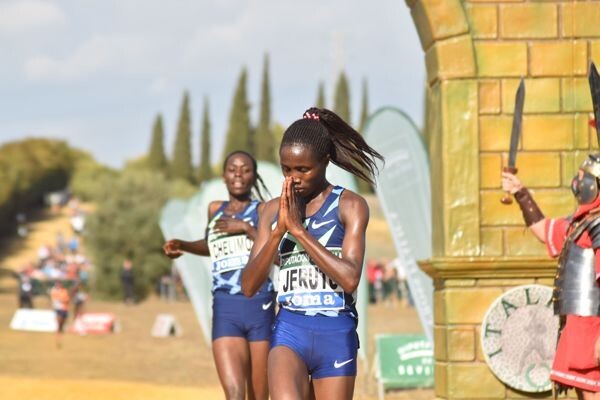
While Jeruto and Chebet took charge of the pacing duties, Teferi and Daniel ran at the back of the lead pack. Just before the halfway point, Chelimo made contact with the lead group and moved to the front alongside Chebet and Jeruto. Daniel, meanwhile, began to lose contact after the fourth kilometre as the race became a duel between the Kenyan trio and Teferi.
Half way through the final circuit, Teferi couldn’t live with the pace being set by Chelimo and Jeruto. Chebet lost ground on her compatriots in the final kilometre, leaving Jeruto and Chelimo to battle for victory.
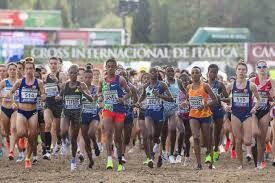
It briefly seemed as though the long-legged Chelimo would reel in the long-time leader, but Jeruto, who this year clocked a world-leading 8:53.65 in the steeplechase to move to third on the world all-time list, found an extra gear in the home straight to win marginally ahead of Chelimo, herself two seconds clear of Chebet.
The men’s 10.1km event began at a moderate pace, set by the Spanish duo of Carlos Mayo, a 27:25.00 10,000m performer, and the 40-year-old Ayad Lamdassem, a creditable fifth at the Tokyo Olympics in the marathon. Shortly before the third kilometre, world U20 3000m champion Tadese Worku moved to the front to whittle down the leading group to six other men: fellow Ethiopian Nibret Melak, Uganda’s Thomas Ayeko, Eritrea’s Aron Kifle, Kwizera, Mayo and Abdessadam Oukhelfen.
The first significant move came some 15 minutes into the race when Kifle, the winner in Atapuerca last weekend, put in a surge to leave Ayeko and the Spaniards behind within a matter of seconds. Kifle and Worku then took turns at the front with Melak and Kwizera tucked behind.
Throughout the closing loop, Worku tried to shake off Melak, Kwizera and Kifle, but Kwizera was able to stick to the teenager’s relentless pace. After negotiating the tricky final bend, Kwizera overtook Worku with relative ease to take the biggest win of his career so far in 28:33, one second ahead of the defending champion Worku, while Melak secured third spot in 28:42, seven seconds clear of Kifle.
“Winning the Itálica permit is incredible for me,” said 22-year-old Kwizera, who finished 11th at the 2019 World Cross Country Championships. “I’m doing very well this cross country season and hope to maintain this. I feel very comfortable in cross country races but I also would like to improve my career bests on the track (13:34.65 for 5000m and 28:21.92 for 10,000m).”
(11/22/2021) ⚡AMPby World Athletics
Cross internacional de Italica
The Cross Internacional de Itálica is an annual cross country running competition it will be held on 21st of November in Santiponce, near Seville, Spain. Inaugurated in 1982, the race course is set in the ruins of the ancient Roman city of Italica. As one of only two Spanish competitions to hold IAAF permit meeting status, it is one of...
more...Top fields gather for Cross Internacional de Italica
The Cross Internacional de Italica in Santiponce on the outskirts of the Spanish city of Seville – the fifth Gold standard meeting in the current World Athletics Cross Country Tour – always boasts a mouth-watering line-up, and this year’s race on Sunday (21) is no exception.
The men’s 10,092m contest features one of the most promising distance runners, Ethiopia’s Tadese Worku, who was the last victor here in January 2020. The 19-year-old is the current world U20 cross country and 3000m champion, has recently shown impressive form with a 26:56 clocking at a 10km road race in Herzogenaurach and should be tipped as one of the favourites. He will be joined by his fellow Ethiopian Nibret Melak, a 12:54.22 5000m performer this year.
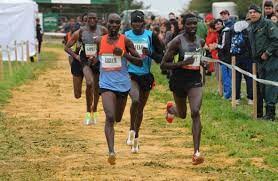
They will face stiff opposition from the whole Atapuerca podium, as Eritrea’s Aron Kifle, Burundi’s Rodrigue Kwizera and Uganda’s Joel Ayeko will also be in contention. The latter’s compatriot Thomas Ayeko, Burundi’s Thierry Ndikumwenayo and Eritrea’s Yemane Hailesilassie should also rank in the top 10 on Sunday.
Spanish hopes rest on the European U23 cross country bronze medallist Abdessamad Oukhelfen. The 22-year-old has proven to be in fine form at this early stage of the season, with third and fifth-place finishes in San Sebastian and Atapuerca respectively. Watch out too for Carlos Mayo, who also made the top 10 in Atapuerca and will be aiming to match that feat here.
Eritrea’s Rahel Daniel Ghebreneyohannes managed an upset victory in Atapuerca last weekend, defeating a mighty Kenyan armada featuring Beatrice Chebet, Margaret Chelimo and Norah Jeruto who were second, third and fourth-place finishers respectively there following a tight and intriguing finish. The four of them will clash again over 7910m on Sunday and the battle for the win promises to be epic.
Reportedly, the unheralded Eritrean competed in Atapuerca wearing two right shoes, but despite that disadvantage she got the better of a world-class line-up and will be eager to prove her victory was no fluke.
Daniel’s top performance is a 14:55.56 5000m clocking from Hengelo last June, but she couldn’t advance to the final at the Tokyo Olympics. Meanwhile, the Kenyan triumvirate holds impressive backgrounds. While Chelimo is the reigning world 5000m silver medallist and defends her victory in Santiponce last year, Jeruto boasts the third fastest ever time in the 3000m steeplechase thanks to a 8:53.65 performance. As for Chebet, the 2018 world U20 5000m champion was runner-up behind Chelimo in 2020 and narrowly beat Chelimo and Jeruto in Atapuerca.
Another Kenyan, Eva Cherono, was eighth at the 2019 World Cross Country Championships and will make her second outing this autumn after a winning 19:17 clocking over four miles in Groningen last month.
To add more quality to Sunday’s field, organisers also announced the late addition of Ethiopia’s Senbere Teferi. The 26-year-old came sixth at the Tokyo Olympics over 5000m and bettered her lifetime best for the distance to an impressive 14:15.24 this season. Teferi will be aiming to regain her 2017 win here and seems ready to do so after her 14:29 overwhelming victory and outright women's world 5km record of 14:29 in Herzogenaurach in September.
The most remarkable Europeans on show will be Turkey’s Yasemin Can and Italy’s Nadia Battocletti; the former having claimed four consecutive European cross country titles and the latter having finished just outside the top 10 in Atapuerca.
Previous winners in Santiponce include Kenenisa Bekele (2003, 2004 and 2007), Fernando Mamede (1984 and 1985), Paul Kipkoech (1987 and 1988), Paul Tergat (1998 and 1999), Moses Kipsiro (2008 and 2009), Leonard Komon (2010 and 2011), Linet Masai (2010 and 2012) and Paula Radcliffe (2001), among others.
Weather forecasters predict a rainy day and a temperature of 18ºC by the time of the event.
(11/21/2021) ⚡AMPby World Athletics
Kiplimo breaks world half marathon record in Lisbon
Uganda’s Jacob Kiplimo broke the world record* at the EDP Lisbon Half Marathon on Sunday (21), clocking 57:31 at the World Athletics Label road race.
The world half marathon champion won by more than two minutes and took one second off the previous world record set by Kenya’s Kibiwott Kandie in Valencia last year.

Kiplimo, who finished third in the 10,000m and fifth in the 5000m at the Tokyo Olympics earlier this year, passed through the first 5km in 13:40, having already dropped the rest of the field.
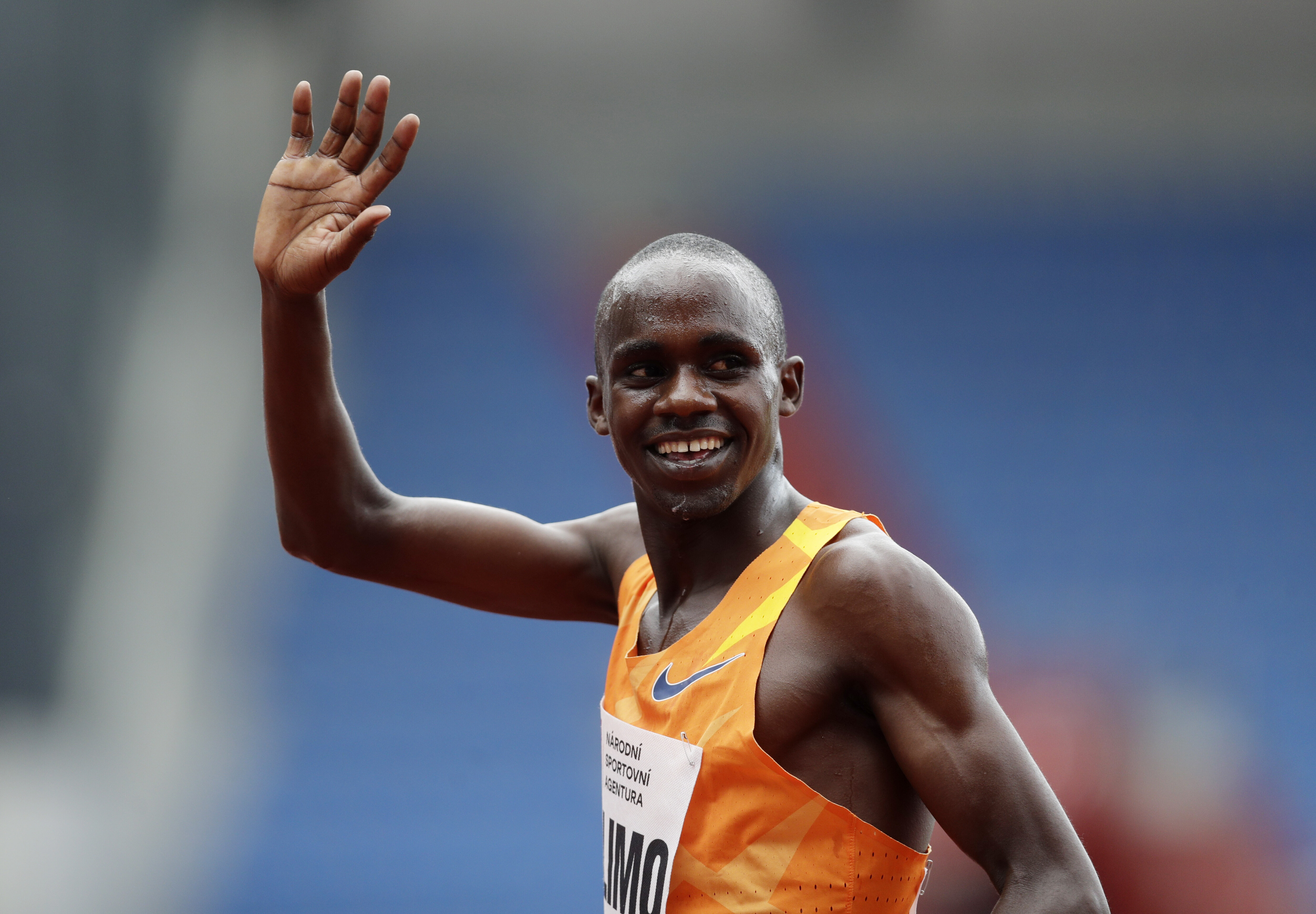
By the time he reached 10km in 27:05, he had a lead of about one minute over the chase pack and was well on schedule to break Kandie’s world record.
Kiplimo passed through 15km in 40:27, the fastest time ever recorded for the distance and indicative of a sub-57-minute finish. With no nearby competitors to work off, Kiplimo’s pace dropped slightly in the closing stages, but he managed to just finish inside the world record, crossing the line in 57:31.
Ethiopia’s Esa Huseyidin Mohamed finished second in 59:39, just ahead of compatriot Gerba Beyata Dibaba, who was given the same time for third place. The top nine men all finished inside 60 minutes.
The women’s race was a close affair as Ethiopia’s Tsehay Gemechu won in 1:06:06 from Kenya’s Daisy Cherotich (1:06:15) and Joyce Chepkemoi (1:06:19).
Leading results
Women1 Tsehay Gemechu (ETH) 1:06:062 Daisy Cherotich (KEN) 1:06:153 Joyce Chepkemoi (KEN) 1:06:194 Hiwot Gebrekidan (ETH) 1:08:005 Vibian Chepkirui (KEN) 1:08:026 Ethlemahu Sintayehu Dessi (ETH) 1:08:167 Yitayish Mekonene Agidew (ETH) 1:08:188 Jess Piasecki (GBR) 1:09:449 Tsige Haileslase Abreha (ETH) 1:10:3110 Debash Kelali Desta (ETH) 1:11:01
Men1 Jacob Kiplimo (UGA) 57:312 Esa Huseyidin Mohamed (ETH) 59:393 Gerba Beyata Dibaba (ETH) 59:394 Hillary Kipkoech (KEN) 59:415 Ibrahim Hassan (DJI) 59:416 Milkesa Mengesha (ETH) 59:487 Antenayehu Dagnachaw (ETH) 59:488 Edmond Kipngetich (KEN) 59:499 Isaac Kipsang (KEN) 59:5210 Solomon Berihu Weldeslassie (ETH) 1:00:00
(11/21/2021) ⚡AMPby World Athletics
EDP HALF MARATHON OF LISBON
EDP Lisbon Half Marathonis an annual internationalhalf marathoncompetition which is contested every March inLisbon,Portugal. It carries World Athletics Gold Label Road Racestatus. The men's course record of 57:31 was set byJacob Kiplimoin 2021, which was the world record at the time. Kenyanrunners have been very successful in the competition, accounting for over half of the total winners, withTegla Loroupetaking the...
more...Top fields gather for Cross Internacional de Italica
The Cross Internacional de Italica in Santiponce on the outskirts of the Spanish city of Seville – the fifth Gold standard meeting in the current World Athletics Cross Country Tour – always boasts a mouth-watering line-up, and this year’s race on Sunday (21) is no exception.
The men’s 10,092m contest features one of the most promising distance runners, Ethiopia’s Tadese Worku, who was the last victor here in January 2020. The 19-year-old is the current world U20 cross country and 3000m champion, has recently shown impressive form with a 26:56 clocking at a 10km road race in Herzogenaurach and should be tipped as one of the favorites. He will be joined by his fellow Ethiopian Nibret Melak, a 12:54.22 5000m performer this year.
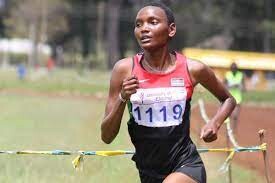
They will face stiff opposition from the whole Atapuerca podium, as Eritrea’s Aron Kifle, Burundi’s Rodrigue Kwizera and Uganda’s Joel Ayeko will also be in contention. The latter’s compatriot Thomas Ayeko, Burundi’s Thierry Ndikumwenayo and Eritrea’s Yemane Hailesilassie should also rank in the top 10 on Sunday.
Spanish hopes rest on the European U23 cross country bronze medalist Abdessamad Oukhelfen. The 22-year-old has proven to be in fine form at this early stage of the season, with third and fifth-place finishes in San Sebastian and Atapuerca respectively. Watch out too for Carlos Mayo, who also made the top 10 in Atapuerca and will be aiming to match that feat here.

Eritrea’s Rahel Daniel Ghebreneyohannes managed an upset victory in Atapuerca last weekend, defeating a mighty Kenyan armada featuring Beatrice Chebet, Margaret Chelimo and Norah Jeruto who were second, third and fourth-place finishers respectively there following a tight and intriguing finish. The four of them will clash again over 7910m on Sunday and the battle for the win promises to be epic.
Reportedly, the unheralded Eritrean competed in Atapuerca wearing two right shoes, but despite that disadvantage she got the better of a world-class line-up and will be eager to prove her victory was no fluke.
Daniel’s top performance is a 14:55.56 5000m clocking from Hengelo last June, but she couldn’t advance to the final at the Tokyo Olympics. Meanwhile, the Kenyan triumvirate holds impressive backgrounds. While Chelimo is the reigning world 5000m silver medalist and defends her victory in Santiponce last year, Jeruto boasts the third fastest ever time in the 3000m steeplechase thanks to a 8:53.65 performance. As for Chebet, the 2018 world U20 5000m champion was runner-up behind Chelimo in 2020 and narrowly beat Chelimo and Jeruto in Atapuerca.
Another Kenyan, Eva Cherono, was eighth at the 2019 World Cross Country Championships and will make her second outing this autumn after a winning 19:17 clocking over four miles in Groningen last month.
To add more quality to Sunday’s field, organisers also announced the late addition of Ethiopia’s Senbere Teferi. The 26-year-old came sixth at the Tokyo Olympics over 5000m and bettered her lifetime best for the distance to an impressive 14:15.24 this season. Teferi will be aiming to regain her 2017 win here and seems ready to do so after her 14:29 overwhelming victory and outright women's world 5km record of 14:29 in Herzogenaurach in September.
The most remarkable Europeans on show will be Turkey’s Yasemin Can and Italy’s Nadia Battocletti; the former having claimed four consecutive European cross country titles and the latter having finished just outside the top 10 in Atapuerca.
Previous winners in Santiponce include Kenenisa Bekele (2003, 2004 and 2007), Fernando Mamede (1984 and 1985), Paul Kipkoech (1987 and 1988), Paul Tergat (1998 and 1999), Moses Kipsiro (2008 and 2009), Leonard Komon (2010 and 2011), Linet Masai (2010 and 2012) and Paula Radcliffe (2001), among others.
Weather forecasters predict a rainy day and a temperature of 18ºC by the time of the event.
(11/19/2021) ⚡AMPby World Athletics
Cross internacional de Italica
The Cross Internacional de Itálica is an annual cross country running competition it will be held on 21st of November in Santiponce, near Seville, Spain. Inaugurated in 1982, the race course is set in the ruins of the ancient Roman city of Italica. As one of only two Spanish competitions to hold IAAF permit meeting status, it is one of...
more...Geoffrey Kamworor, Lawrence Cherono and Guteni Shone confirmed for Valencia Marathon
Valencia will once again become the epicentre of the running world on December 5, when it holds the Valencia Marathon Trinidad Alfonso EDP, a World Athletics Elite Platinum Label race that in 2021 wants to continue making history by breaking records.
And to achieve this, it will count on some of the best athletes in the world including Geoffrey Kamworor, Lawrence Cherono and Guteni Shone.
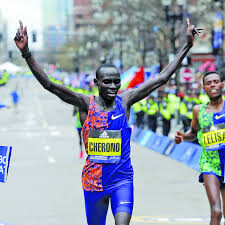
Kamworor, winner of three world half marathon titles and two world cross-country titles, is eager to improve on his 2:06:12 PB, set on his debut at the distance back in 2012. Since he had to withdraw from the Tokyo Games due to injury, the two-time New York Marathon champion from Kenya has been preparing exclusively and conscientiously to achieve a great result in Valencia.
Cherono is coming off a fourth-place finish at the Tokyo Olympics. The 2019 Boston and Chicago champion will return to the scene of his 2:03:04 PB, a time which makes him the fastest in the field.
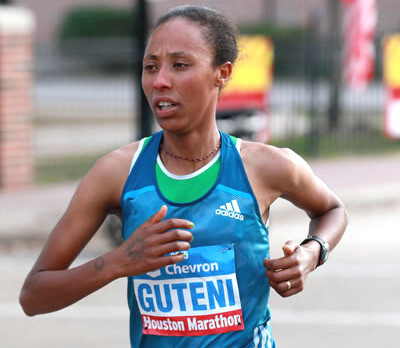
Herpasa Negasa, the 2019 Dubai runner-up, and 2019 Valencia winner Kinde Atanaw are the other sub-2:04 performers in the field.
Ethiopia’s Andamlak Belihu, who finished fifth over 10,000m at the 2019 World Championships and at the 2020 World Half Marathon Championships, will be making his marathon debut. The 22-year-old’s PBs of 26:53:15 for 10,000m and 58:54 for the half marathon point to a potentially fast time for the full marathon distance.
Although no one in the women’s field has a PB faster than 2:20, organisers are hopeful that barrier will be broken again in Valencia for the third year in a row.
Guteni Shone came close to that mark last year when finishing second in Dubai with 2:20:11. Fellow Ethiopian Azmera Gebru is also less than a minute shy of the barrier, thanks to her 2:20:48 PB from the 2019 Amsterdam Marathon.
Kenya's 2018 Prague Marathon champion Bornes Chepkirui, Ugandan record-holder Juliet Chekwel and three-time Rome Marathon champion Rahma Tusa of Ethiopia are also in the field. Marathon debutante Dorcas Tuitoek is also one to watch.
“This year’s marathon is extremely competitive, as we like it in Valencia,” said elite athlete coordinator Marc Roig. “I don’t rule out a sprint finish in both the men’s and women’s races – in fact, I’m counting on it. The athletes know that Valencia offers one of the best courses for achieving personal best times. And this, with the level of runners we have, can easily translate into several athletes breaking the course record. By how much? We will see on December 5.”
(11/19/2021) ⚡AMPby World Athletics
VALENCIA TRINIDAD ALFONSO
The Trinidad Alfonso EDP Valencia Marathon is held annually in the historic city of Valencia which, with its entirely flat circuit and perfect November temperature, averaging between 12-17 degrees, represents the ideal setting for hosting such a long-distance sporting challenge. This, coupled with the most incomparable of settings, makes the Valencia Marathon, Valencia, one of the most important events in...
more...Run the fast and flat Edinburgh Marathon - voted the fastest in the UK by Runners World and be part of Scotland's biggest running festival on May 2022
The Edinburgh marathon is one of the best events on the long-distance running calendar, and organisers were proud to announce it’s back in full swing following a COVID-19 hit year. A date is set, and crowds will be back running the course through the Scottish capital following the relaxation of UK coronavirus rules in the summer. Organisers, runners and fans are excited to see the return of what is a real favourite and one of the world’s most scenic marathons. It’s also another sign that Scottish sport is heading full steam towards recovery.
The Edinburgh Marathon Festival, with its full marathon, half marathon, relay, 10k, 5k and junior 5k, 2k, 1.5k and 1k, will take place in the gorgeous and historic city on 28 and 29 May 2022. Last year’s event took place, but it was a virtual run with entrants from all over the world mapping out a course and distance near them and logging their routes and times on the EMF site. The runners raised money for charity, completed personal bests, run with family members or in memory of loved ones. It wasn’t the kind of festival atmosphere we have come to love about the Edinburgh Marathon, but it was a memorable experience.
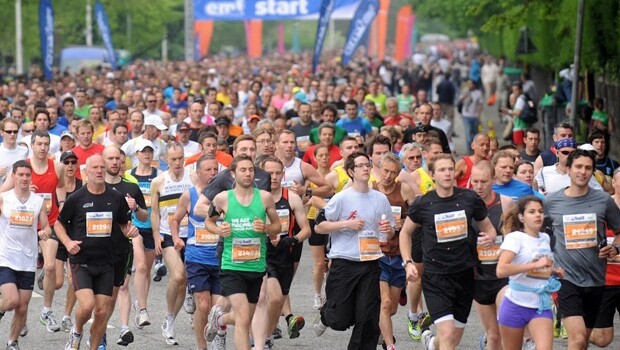
You don’t have to run long distances to enjoy the weekend, of course. There are many ways you can get closer to the action if you are unable to enter. Armchair fans can watch the marathon live on TV and place bets on the outcome, choosing their favourite distance runner and conducting a sportsbook review to see which bookie is offering the most generous odds on them recording the fastest time.
In addition to the marathon winner betting, the leading bookies also have several eye-catching specials, including a podium finish, winning nation, best finishing Brit and more. There’s something for all fans of online gambling to enjoy. The Edinburgh marathon is an exciting run but landing a profit from the occasion is an even more thrilling experience.
Why everyone loves the Edinburgh marathon
The last two Edinburgh marathons have been virtual events which was a huge blow for the event, the charities involved and the businesses in Edinburgh that enjoy the financial boost of having runners, fans and volunteers arrive in the city from across the globe. It has been a difficult two years for the city in general, but the wait will make the return of the Edinburgh marathon even more interesting.
Why is there so much excitement in the air ahead of the spring return, and why does the Edinburgh marathon hold a special place in the hearts of professional runners, amateurs and fundraisers? There are many reasons for EMF’s popularity. For the pros in town to record a personal best time and have a crack at the course record or even the world record, Edinburgh is great because it is one of the flattest courses on the circuit. It lends itself well to runners with pace and has thrown up some eye-catching times over the years. That has been true of both the marathon and the half marathon.
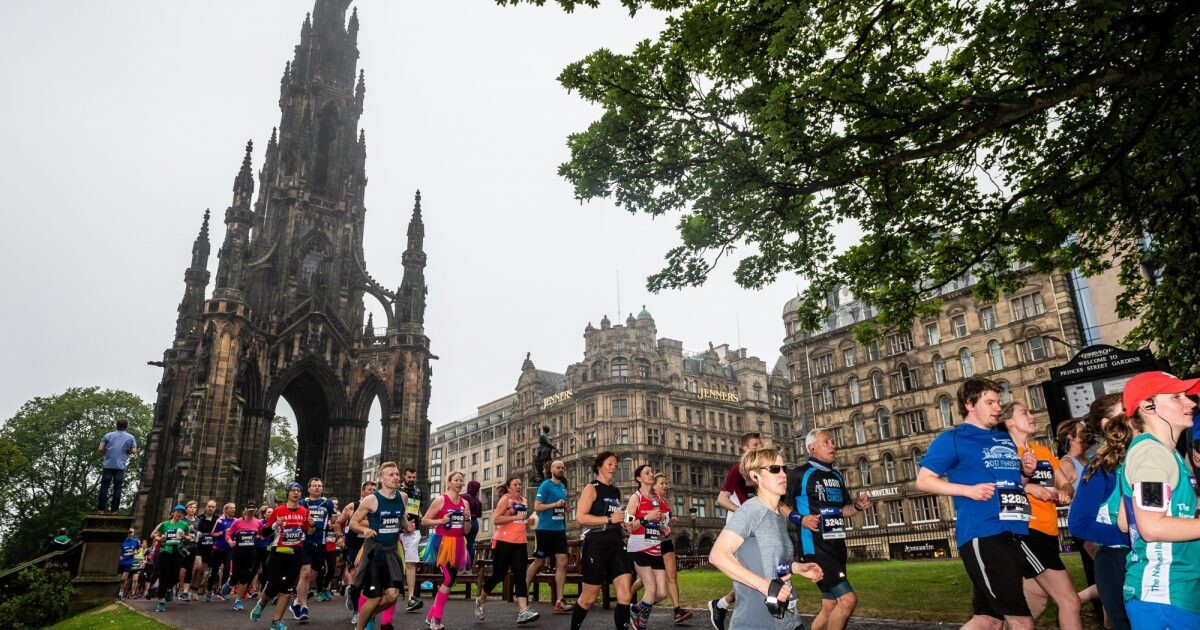
The course record was set by Joel Kiptoo of Kenya when recording an astounding 2.13.33. The fastest female ever to complete the Edinburgh marathon was Zinaida Semenova from Russia, who posted an as-yet unbeaten time of 2.33.36. Will either of those records be broken this year? It’s certainly possible as runners seem to get faster every season. The last Briton to win the race was Phil Nicholls in 2011. Since then, we’ve had one Ethiopian champion and seven Kenyan winners. Another attraction of the EMF is the scenery of the course. The marathon takes in some of Edinburgh’s most famous landmarks and locations from both the Old Town and the New Town. It isn’t all for the tourists, though. The course covers much of the city, allowing followers to see the splendour of the parliament buildings as well as some of the city’s poorest areas. It is the best way to see the true Edinburgh in all its glory.
When entering the marathon, half marathon or one of the other races, you’ll start in Holyrood Park, then take in the likes of Grassmarket, Princes Street, Easter Road and Meadowbank Stadium.
(11/13/2021) ⚡AMPReuben Kipyego, Abel Kirui, Vivian Kiplagat and Alemu Megertu confirmed to participate in the 2021 ADNOC Abu Dhabi Marathon
With less than three weeks to go until the third edition of the ADNOC Abu Dhabi Marathon, race organiser, Abu Dhabi Sports Council (ADSC), and race title sponsor, Abu Dhabi National Oil Company (ADNOC), have confirmed four more elite athletes that will be vying for the top spot in the highly anticipated race on November 26.
Following the recent announcement of the first group of world-class athletes, the latest additions to the elite category of male runners include the reigning 2019 ADNOC Abu Dhabi Marathon winner, Reuben Kiprop Kipyego.
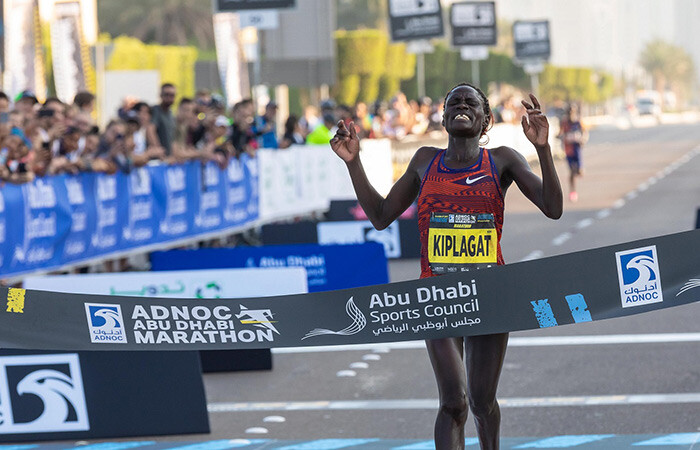
Returning to try and beat his personal best race time of 2:03:55 while defending his crown, the Kenyan is ranked 20th in the world, and his recent successes include a second-place finish in 2019’s Buenos Aires Marathon and the 2021 Milano Marathon.
He will be joined by fellow Kenyan Abel Kirui, whose personal best record of 2:05:04 makes him a serious contender in Abu Dhabi. He has won both the 2009 Berlin Marathon and 2011 Daegu Marathon and was placed 4th in 2018’s London Marathon.
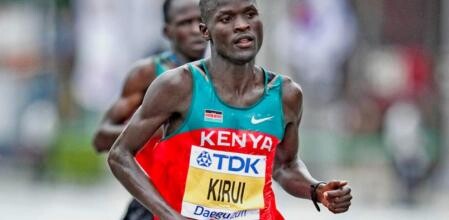
The confirmed female elite athletes include Kenya’s Vivian Kiplagat, who returns to the UAE in a bid to defend her 2019 ADNOC Abu Dhabi Marathon win. Kiplagat was also crowned the winner of the 2019 Milano Marathon and the 2018 Buenos Aires Marathon and will be going all out to beat her personal best record of 2:22:11.
Joining her will be Ethiopian, Alemu Megertu, who is currently ranked 40th in the world with a personal best time of 2:21:10. Her marathon achievements include 1st place in 2019’s Rome Marathon and 2nd place in the 2019 Frankfurt Marathon.
Speaking on the confirmation of the latest world-class athletes, Aref Al Awani, General Secretary of the Abu Dhabi Sports Council, said: "As we return for our much-anticipated third edition, this year’s elite level line-up will see some of the world’s best male and female runners heading to Abu Dhabi to compete for the top prize.
With two ADNOC Abu Dhabi Marathon champions returning in 2021 to defend their title, we can look ahead to an incredible display of competition and talent, further enhancing the event’s global reputation as one of the most prestigious races to participate at. We are proud that they have chosen our wonderful city and this fantastic event, and we look forward to welcoming them to the start line in Abu Dhabi."
Prior to the race, on November 22-25, a vibrant race village will be hosted at the ADNOC HQ Campus, welcoming participants and supporters with photo opportunities, family entertainment and a dedicated race pack collection area.
Open to 6 to 70 - year-olds and runners of all fitness levels, the family-friendly event aims to promote healthy lifestyles and elevate the physical wellbeing of the Abu Dhabi community. To register for the 2021 ADNOC Abu Dhabi Marathon, please visit:https://www.adnocabudhabimarathon.com/register-now/
(11/11/2021) ⚡AMPby Tariq alfaham and Hatem Mohamed
ADNOC Abu Dhabi Marathon
The Abu Dhabi Marathon is shaping up to being first class marathon for both elite runners and average runners as well. Take in the finest aspects of Abu Dhabi's heritage, modern landmarks and the waters of the Arabian Gulf, at this world-class athletics event, set against the backdrop of the Capital's stunning architecture.The race offered runners of all abilities the...
more...Nominees have been announced for 2021 Male Rising Star Award
Ahead of next month’s World Athletics Awards 2021, World Athletics is delighted to announce the five nominees for the 2021 Male Rising Star Award to recognise this year's best U20 athlete.
The nominations reflect the many incredible performances that the sport has witnessed this year, at the World Athletics U20 Championships in Nairobi, Tokyo 2020 Olympic Games and other events around the world.
The winner of the 2021 Male Rising Star Award will be selected by an international panel of experts and be announced live at the World Athletics Awards 2021 on December 1.
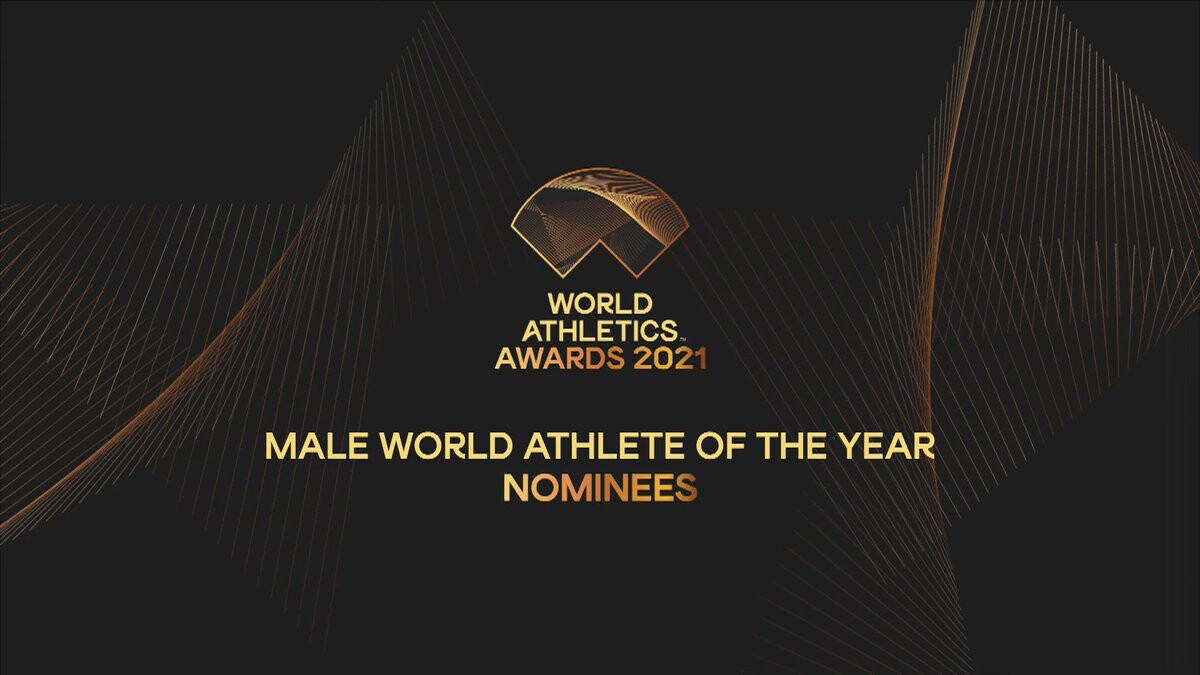
The nominees are:
Sean Burrell, USA
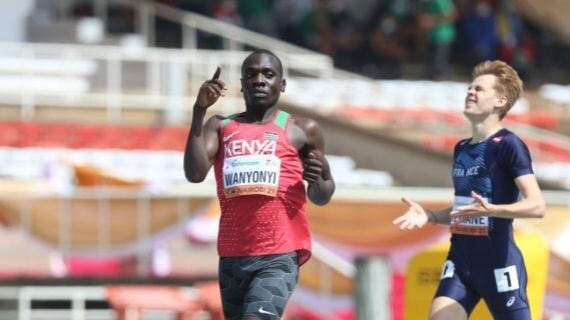
- World U20 400m hurdles record
- NCAA 400m hurdles champion
- Sixth on world U20 indoor 400m list
Erriyon Knighton, USA
- Olympic 200m fourth place
- World U20 200m record
- World U18 200m best
Emmanuel Wanyonyi, KEN
- World U20 800m champion
- World U20 leading time
- National U18 800m record
Tadese Worku, ETH
- World U20 3000m champion and 5000m silver medalist
- World U20 leading times at 3000m, 10,000m and 10km
- Senior Ethiopian 10km record Sasha Zhoya, FRA
- World U20 110m hurdles champion
- European U20 110m hurdles champion
- World U20 110m hurdles record
Further information about the World Athletics Awards 2021 will be announced in the weeks leading up to the event.
(11/09/2021) ⚡AMPby World Athletics
How the Dibaba sisters from Ethiopia became the fastest family on earth
Ethiopian distance runner Tirunesh Dibaba made history at the 2008 Beijing Olympics when she became the first woman to win gold in both the 5,000-metre and 10,000-metre races. She defended her gold medal title in the 10,000 metres at the 2012 London Olympics, becoming the first woman to win the event at two consecutive Olympics.
She was inspired by a family of runners. In fact, she and her sisters have been amazing in the field of distance running. The Dibaba sisters — Tirunesh, Genzebe, Anna, and Melat — are the only siblings in recorded history to hold concurrent world records, and they are a fiercely competitive family from a humble background.
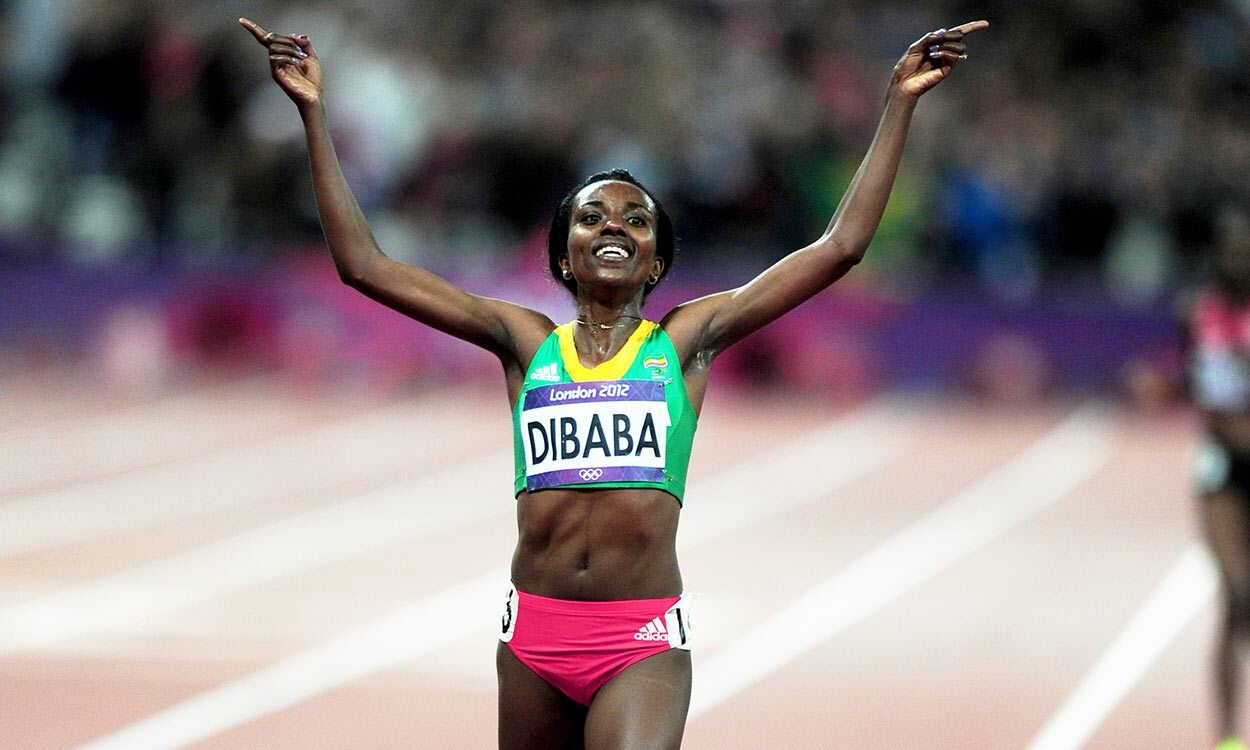
They were raised in a round mud hut in the Ethiopian capital, Addis Ababa, without electricity. Their parents were subsistence farmers who grew wheat, barley and teff. As a matter of fact, the Dibaba siblings are seven in all, and all of them run. Tirunesh, however, is the most decorated, having three Olympic gold medals. She had wanted to enroll in school but opted for the Corrections (Prisons Police) sports club.
At age 15, she debuted internationally on Ethiopia’s junior squad at the 2001 world cross-country championships, where she placed fifth. She continued with junior-level silver medals in cross-country and on the track in 2002. She won the world junior cross-country title in 2003, set a 5,000-metre junior world record and won gold in the 5,000 metres at the International Association of Athletics Federations (IAAF) world track and field championships, making her the youngest-ever world champion in her sport.
Her sister, Genzebe, is not doing badly in sports. Ejegayehu, who is their older sister, is also an Olympian who won silver from Athens. Their cousin, Derartu Tulu, was the first Black African woman to win Olympic gold in the 1992 games. She won another Olympic gold medal in Sydney in 2000.
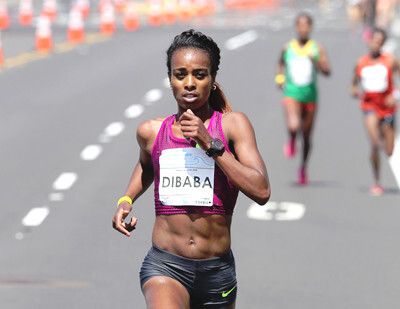
“It’s not a stretch to say they are the world’s fastest family”, Ato Boldon, NBC’s track analyst, told Vogue in 2016. The sisters have remained a household name in Ethiopia, a country that has produced some of the world’s greatest runners, alongside Kenya.
The mother of the Dibaba sisters told Vogue that the siblings are successful thanks to the environment they were raised in, especially the ready supply of milk they get from the family cows. According to Vogue, author David Epstein has said that much of Ethiopia and Kenya lies in an altitude “sweet spot” high enough to cause physiological changes but not so high that the air is too thin for hard training.
The runners’ feat is also attributed to their diet — especially teff rich in iron and calcium — and their “small lightweight frame”. The Dibaba sisters have the body type good for sports, analysts say. Boldon said in 2016 that if one compares the sisters to a car, they would be a Ford Focus with a Ferrari engine.
The Dibabas are good at sports but they don’t really like watching sports. They prefer movies, especially Amharic films, said Tirunesh, who in 2008 married fellow track-and-field Olympic medalist Sileshi Sihine in a nationally televised wedding ceremony.
And just like other successful athletes, the Dibabas have invested their monies back into their communities. The sisters, alongside their in-laws, are real estate moguls owning several buildings in Addis Ababa. Still, the sisters continue to shine brightly in the sports world.
(11/07/2021) ⚡AMPby Mildred Europa Taylor
Kenyan duo of Peres Jepchirchir, Albert Korir win 50th edition of New York City Marathon
Peres Jepchirchir pulled off a historic double Sunday.
Three months after she won gold at the Summer Olympics in Tokyo, Jepchirchir turned around and won the 50th edition of the New York City Marathon, emerging from a pack of three in the final mile to cross the finish line in 2 hours, 22 minutes and 39 seconds.
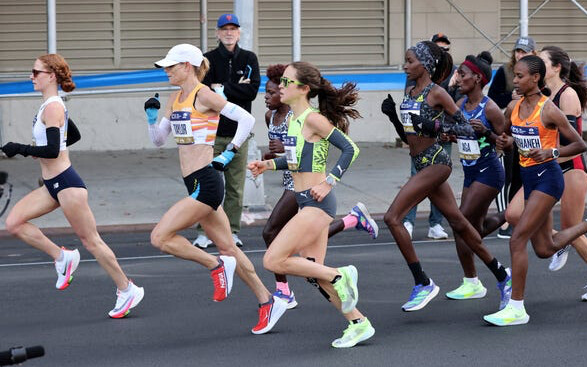
The 28-year-old Kenyan is the first woman to win Olympic gold in the marathon, then win a major fall marathon thereafter.
Meanwhile, countryman Albert Korir won the men's race in dominant fashion, with a time of 2:08:22.
While Korir separated himself from the rest of the field by Mile 20, the women's race proved to be much tighter, with three women neck-and-neck entering the final mile. Viola Cheptoo ended up finishing second, followed by Ababel Yeshaneh of Ethiopia in third.
Cheptoo, the younger sister of retired American marathoner Bernard Lagat, shared a moment with her brother after the race; Lagat was working as a commentator for ESPN's television coverage of the event.
Molly Seidel, who won a surprising bronze at the Tokyo Olympics over the summer, was the highest-placing American in the women's field. The 27-year-old finished fourth with a time of 2:24:42.
Elkanah Kibet, who also placed fourth, was the top American finisher on the men's side with a time of 2:11:15.
Sunday's race marked the 50th running of the New York City Marathon. The event initially consisted of 127 people running laps around Central Park in 1970, with a $1 entry fee. It has since blossomed into one of the largest and most iconic marathons in the world.
Reigning Paralympic champion Marcel Hug of Switzerland dominated the men's wheelchair race, besting the rest of the field by more than six minutes with a time of 1:31:24. Madison de Rozario of Australia also followed up a Paralympic gold with a win in New York, cruising to victory in the women's wheelchair race in 1:51:01.
(11/07/2021) ⚡AMPTCS New York City Marathon
The first New York City Marathon, organized in 1970 by Fred Lebow and Vince Chiappetta, was held entirely in Central Park. Of 127 entrants, only 55 men finished; the sole female entrant dropped out due to illness. Winners were given inexpensive wristwatches and recycled baseball and bowling trophies. The entry fee was $1 and the total event budget...
more...Victor Kiplangat takes debut win in Istanbul, Sheila Jerotich comes from behind in stunning sister act
Running his debut at the classic distance Victor Kiplangat became the surprise winner of the N Kolay Istanbul Marathon. The 21 year-old Ugandan, who is a training partner of Olympic 5,000 m Champion and world record holder Joshua Cheptegei, clocked 2:10:18 after battling with three other contenders in the final mile of the race. Kenya’s Robert Kipkemboi took second with 2:10:23 while Solomon Mutai of Uganda was third in 2:10:25.
There was even more drama in the women’s race: With just 500 metres to go Kenyan Sheila Jerotich came from behind to then triumph on Istanbul’s Sultanahmet Square in 2:24:15. To make it even more stunning: The runner the 32 year-old overtook shortly before the finish was her sister, Jackline Chepngeno. While she was the runner-up in 2:24:21, Ethiopia’s Ayantu Abdi followed in third place with 2:24:45. It is most likely unique that sisters took the first two places in a major international marathon. The men’s and women’s winners receive a prize purse of 35,000 Dollar each.
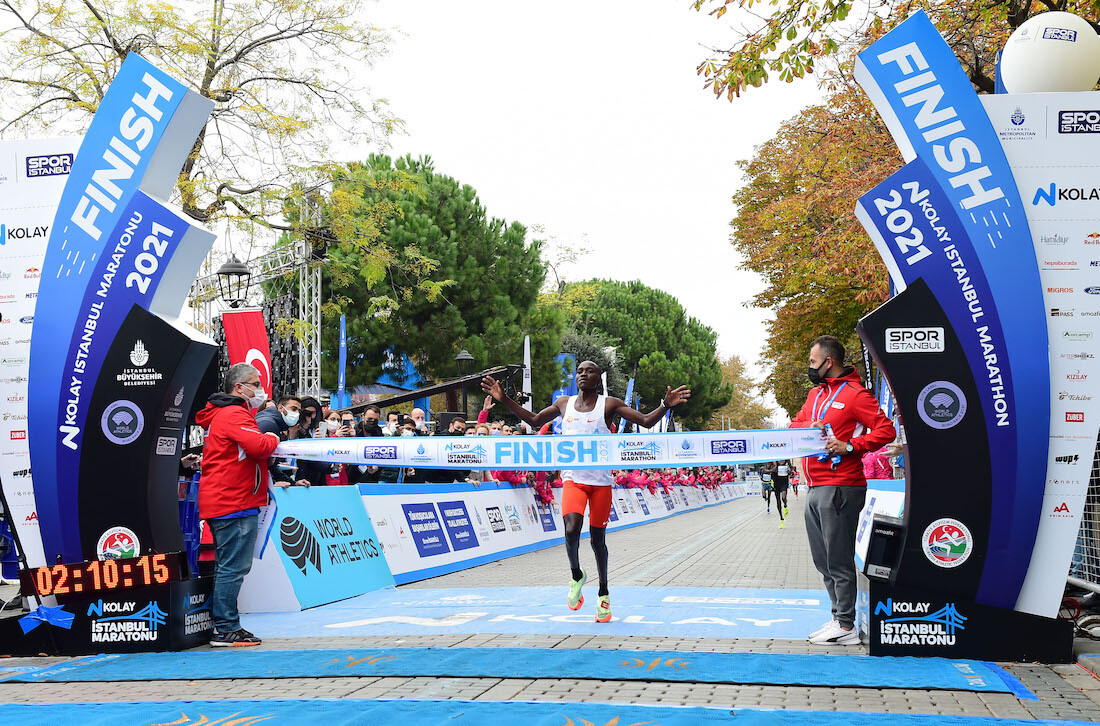
Including events at shorter distances a total number of over 35,000 runners entered the race. With this figure the N Kolay Istanbul Marathon was one of the biggest races worldwide since the beginning of the pandemic. In view of the Covid 19 situation strict hygiene regulations were in place. The N Kolay Istanbul Marathon is a World Athletics Elite Label Road Race.
Men’s Race
Starting on the Asian side of Istanbul the course has a significant drop once it reaches European territory within the first five kilometres. Despite this drop and good weather conditions the pace was slow. The favorites opted for a tactical race instead of following a pace which was set to break the Turkish allcomers’ record of 2:09:35. A group of 17 men then passed the half way mark in 65:21.
There was no proper attack until very late in the race. Runners knew about the steep climb up to the finish that waited for them in Istanbul’s historic centre and held back. Records were out of reach, but a thrilling race for victory developed.
It was Robert Kipkemboi who finally started a move with around five kilometers to go. Fellow-Kenyan and defending champion Benard Sang lost contact to the group and when the 38th kilometer was covered in 2:53 course record holder Daniel Kibet could not follow as well. He had won the N Kolay Istanbul Marathon in 2019 with 2:09:44. Four runners were still in contention when the climb began with around a mile to go: Kenyans Robert Kipkemboi and Moses Kemei as well as Ugandans Victor Kiplangat and Solomon Mutai. Surprisingly it was the debutant who took the lead and pushed hard all the way up the hill. Kiplangat, who has a good half marathon PB of 59:26, was rewarded with his biggest career win.
“I am thrilled to have won my debut marathon. But I knew that I was in good shape. I train in very hilly terrain and was confident that I would be strong in the final section,“ said the 21 year-old winner, who trains with Joshua Cheptegei in Kapchorka in Uganda at an altitude of around 2,000 m. “Joshua is my idol. And he helps me a lot,“ said Victor Kiplangat, who thinks that he has the potential to run 2:05 to 2:06 in his next marathon in spring. “If I achieve such a time on a flat course I hope to get selected for the World Championships’ marathon next summer. And then I would love to come back to Istanbul to defend my title.“
While the first four finishers ran a negative split which is very rare in Istanbul due to the nature of the course, Turkey’s best runner produced a fine performance as well: Hüseyin Can finished 14th with 2:16:01 and broke the national record for under 23 year-olds.
Women’s Race
In contrast to the men the women ran a blistering pace during the first part of the race. A group of ten runners passed the 10k point in 32:48 which pointed towards a 2:18:30 finishing time. Three years ago Kenya’s World Champion Ruth Chepngetich established a sensational course record of 2:18:35. However the leaders could not hold on to this sort of pace. They reached half way in 70:19 and then passed the 30k mark in 1:40:48.
Four runners were left in the leading group shortly after 30k: Sheila Jerotich, Jackline Chepngeno, Ayantu Abdi and Judith Cherono of Kenya. Cherono soon dropped back and then it was Jackline Chepngeno who moved clear. At 40k she was already 22 seconds ahead and looked certain to win the race. But during the uphill stretch Sheila Jerotich came closer and closer and finally overtook her sister with just 500 metres to go.
“I am not disappointed at all. My aim was to finish on the podium and I have achieved that,“ said Jackline Chepngeno, who improved her PB by 17 seconds with a time of 2:24:21. It was only then when she revealed that it was her sister, who had stopped her from winning the race. „We are best friends, we train together and we are actually sisters. Since we are both married we have different names.“ While Sheila Jerotich, who improved her PB from 2:26:06 to 2:24:15 in Istanbul, can not speak English her sister translated for her: “I am really happy to have won the race. Next year we both want to come back to Istanbul.“
Results
Men:
1. Victor Kiplangat UGA 2:10:18
2. Robert Kipkemboi KEN 2:10:23
3. Solomon Mutai UGA 2:10:25
4. Moses Kemei KEN 2:10:28
5. Benard Sang KEN 2:10:59
6. Daniel Kibet KEN 2:11:09
7. Mengistu Nigatu ETH 2:11:15
8. Chalachew Tiruneh ETH 2:11:20
Women:
1. Sheila Jerotich KEN 2:24:15
2. Jackline Chepngeno KEN 2:24:21
3. Ayantu Abdi ETH 2:24:45
4. Judith Cherono KEN 2:27:23
5. Fetale Tsegaye ETH 2:28:53
6. Zinash Debebe ETH 2:29:45
7. Emily Kipchumba KEN 2:30:25
8. Betty Chepkwony KEN 2:30:28
photo credit:Spor Instabul
(11/07/2021) ⚡AMPby Race-News-Service
N Kolay Istanbul Marathon
At the beginning, the main intention was simply to organise a marathon event. Being a unique city in terms of history and geography, Istanbul deserved a unique marathon. Despite the financial and logistical problems, an initial project was set up for the Eurasia Marathon. In 1978, the officials were informed that a group of German tourists would visit Istanbul the...
more...Course record holder Daniel Kibet aims to regain Istanbul Marathon title
Kenya’s Daniel Kibet seeks a second victory when he returns to the N Kolay Istanbul Marathon, a World Athletics Elite Label road race, on Sunday (7).
The 25-year-old, who was inspired by former world record-holder Paul Tergat, produced a surprise two years ago when he won the race despite starting as a pacemaker, improving the course record to 2:09:44.
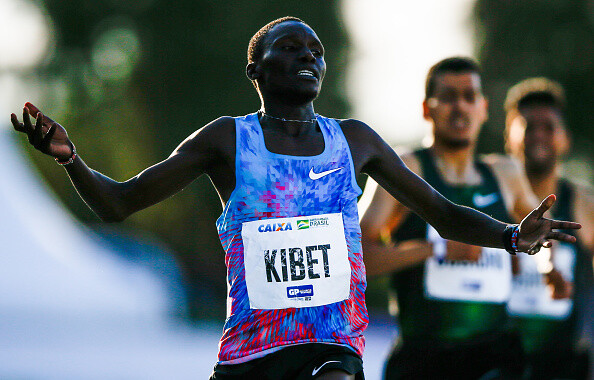
He may well have to break the record again to repeat his victory. With a dozen runners on the start line featuring sub-2:10 PBs, organisers hope that the event can regain the Turkish all-comers’ record it lost to Izmir in April, when Ethiopia’s Tsegaye Getachew ran 2:09:35.
“I am happy to be back in Istanbul and my aim is to regain my title,” said Kibet, who set his PB of 2:06:49 when finishing fifth at the Seville Marathon in 2019.
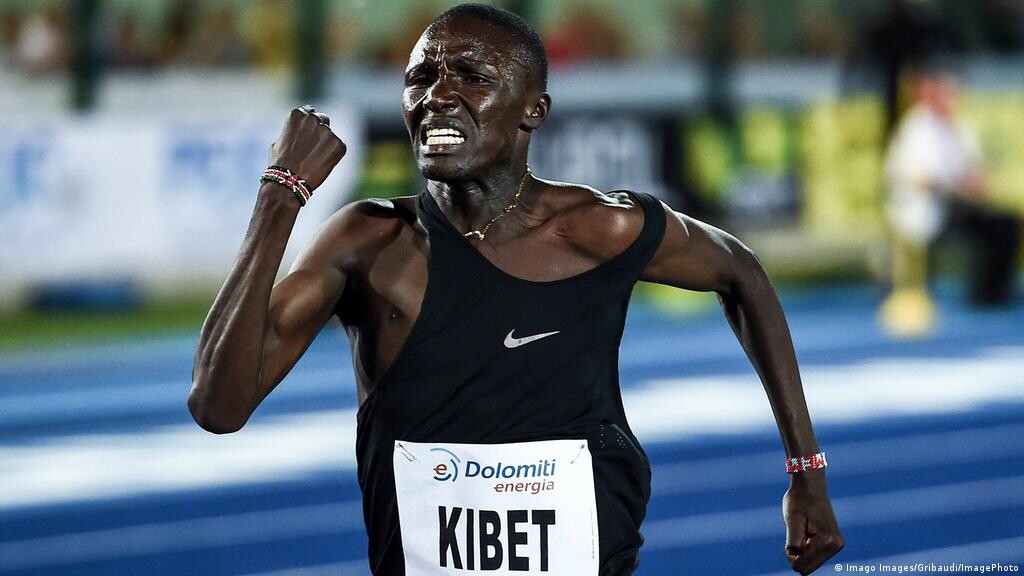
“I am ready for a faster time than in 2019, but my main focus will be on victory. The question always is: will the favourites in the first group follow the pace of the pacemakers or will they sit back? You will not want to be the only athlete to go with the pacers.”
Kibet first raced the Istanbul Marathon in 2018. “I was in really good shape, but got a hamstring problem after 32 kilometres, which forced me to drop out,” he explained.
“Knowing the course in Istanbul is an advantage. It is fast, but some parts are difficult, especially the last three kilometres with some uphill sections.”
Leading the entry lists with their respective personal bests of 2:05:25 and 2:21:59 are Ethiopia’s Bazu Worku and Mamitu Daska.
Joining Kibet and Worku among the men’s race entries are Ethiopia's Yitayal Atnafu Zerihun, the 2019 runner-up who has a best of 2:06:21, plus 2:06:25 runner Chele Dechasa and Abayneh Ayele, who has run 2:06:45 and finished fourth at the 2016 World Half Marathon Championships in Cardiff.
Kenya’s defending champion Bernard Sang, who ran his PB of 2:11:49 to win in Istanbul last year, also returns.
The women’s race will feature eight runners who have personal bests under 2:28. The former Dubai and two-time Frankfurt Marathon champion Daska, who was third in the 2017 New York City Marathon, is the fastest on paper with her PB set in 2011.
She will line up alongside Kenya’s Jackline Chepngeno, who has shown some promising recent form with a half marathon PB of 1:09:07 set when finishing second in Paris in September, while her marathon best of 2:24:38 was run in 2018.
They will be joined by two other sub-2:26 athletes in her fellow Kenyans Janet Rono and Sheila Jerotich, the 2018 Commonwealth Games marathon fourth place finisher.
(11/06/2021) ⚡AMPby World Athletics
N Kolay Istanbul Marathon
At the beginning, the main intention was simply to organise a marathon event. Being a unique city in terms of history and geography, Istanbul deserved a unique marathon. Despite the financial and logistical problems, an initial project was set up for the Eurasia Marathon. In 1978, the officials were informed that a group of German tourists would visit Istanbul the...
more...Ethiopian Kenenisa Bekele will be making his TCS New York City Marathon debut this sunday
As a four-time Olympic medalist, 16-time world champion and the second-fastest marathoner in history, Kenenisa Bekele is one of the world’s greatest long-distance runners of all-time. In 2021, he will making his TCS New York City Marathon debut.
Bekele is the second of six children and began running in primary school when he was inspired by Haile Gebrselassie. With the natural ability to accelerate very quickly at the end of long-distance races, Bekele worked his way up the junior and senior international competition circuit, ultimately winning the 10,000-meter world title at the 2003, 2005, 2007, and 2009 World Athletics Championships, in addition to the 5,000-meter title in 2009. He held both the 5,000 and 10,000 meter world records for nearly 15 years until they were broken in 2020.
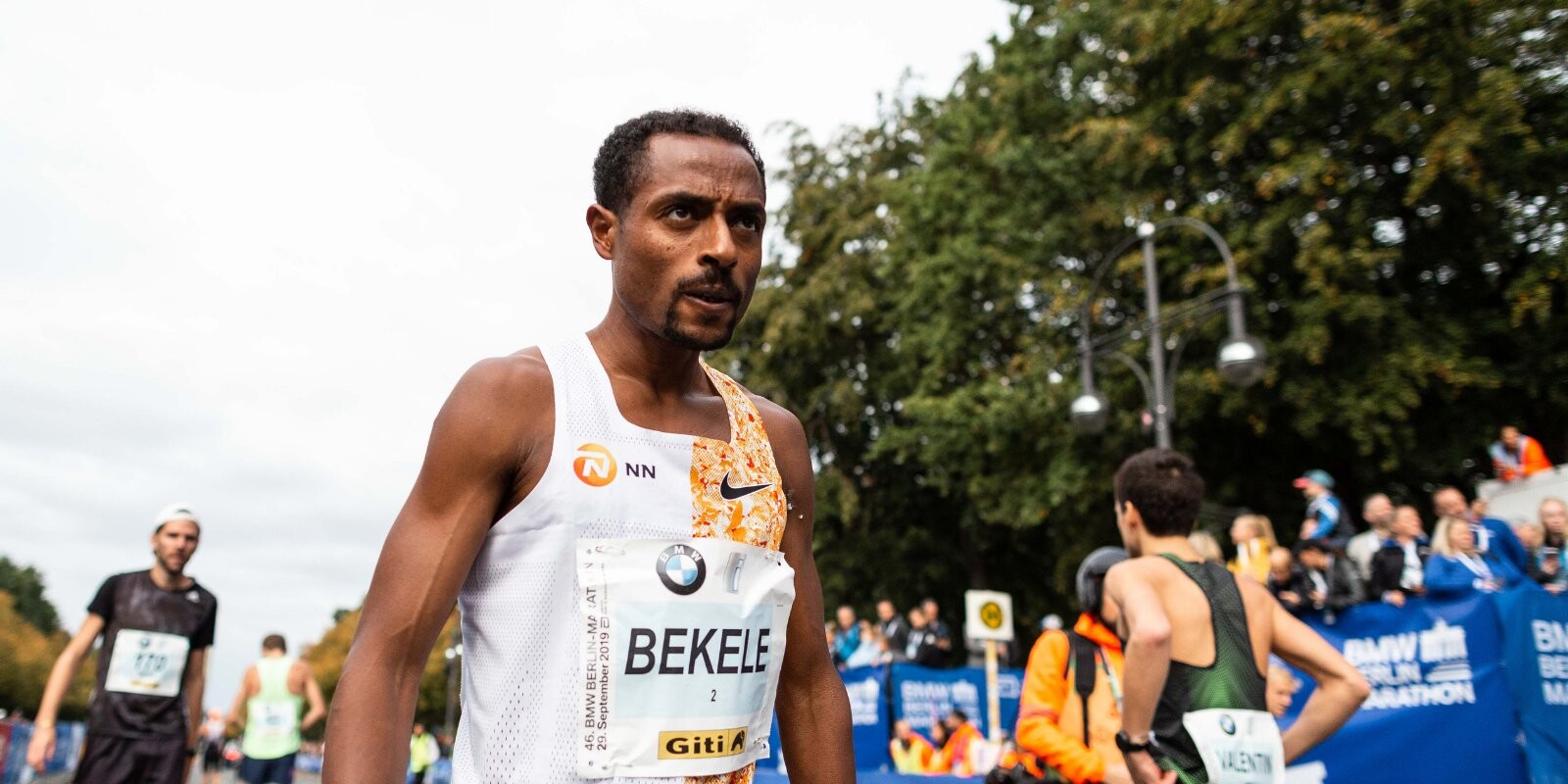
In his Olympic debut at the Athens 2004 Games, he won gold in the 10,000 and silver in the 5,000, and four years later in Beijing took gold in both distances. During that time, he also won 11 gold medals at the World Cross Country Championships.
In 2014, he produced the sixth fastest marathon debut ever, winning the Paris Marathon in a course-record time of 2:05:04. In 2016, he won the Berlin Marathon in what was then the third-fastest time in history. He has also finished on the podium twice at the London Marathon.
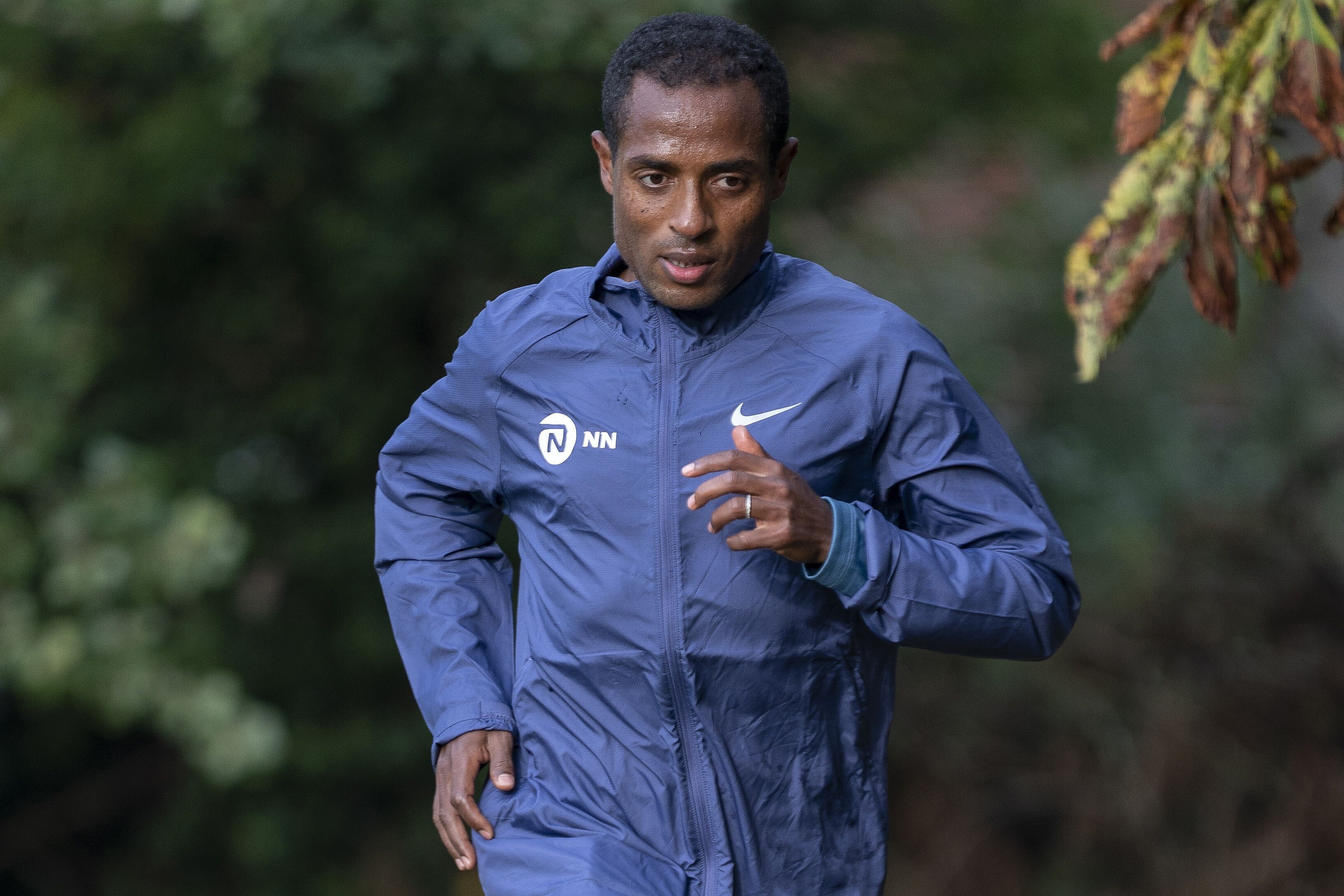
Bekele’s most recent marathon appearance was one for the history books, winning the 2019 Berlin Marathon in the second-fastest time ever, only two seconds off the world-record time set by Eliud Kipchoge in Berlin the year prior.
He is married to Ethiopian actress Danawit Gebregziabher and off the track owns a construction business, having built commercial buildings in the Addis Ababa and Arsi regions of Ethiopia.
(11/05/2021) ⚡AMPTCS New York City Marathon
The first New York City Marathon, organized in 1970 by Fred Lebow and Vince Chiappetta, was held entirely in Central Park. Of 127 entrants, only 55 men finished; the sole female entrant dropped out due to illness. Winners were given inexpensive wristwatches and recycled baseball and bowling trophies. The entry fee was $1 and the total event budget...
more...Olympic silver medalist Keely Hodgkinson to race at Müller Indoor Grand Prix Birmingham
Olympic silver medalist Keely Hodgkinson (coach: Trevor Painter, club: Leigh) will take on the world at the Müller Indoor Grand Prix Birmingham on Saturday February 19, 2022.
The British 800m record holder is the first leading athlete to announce their intention to compete at the event, which returns to the Utilita Arena Birmingham in the new year.
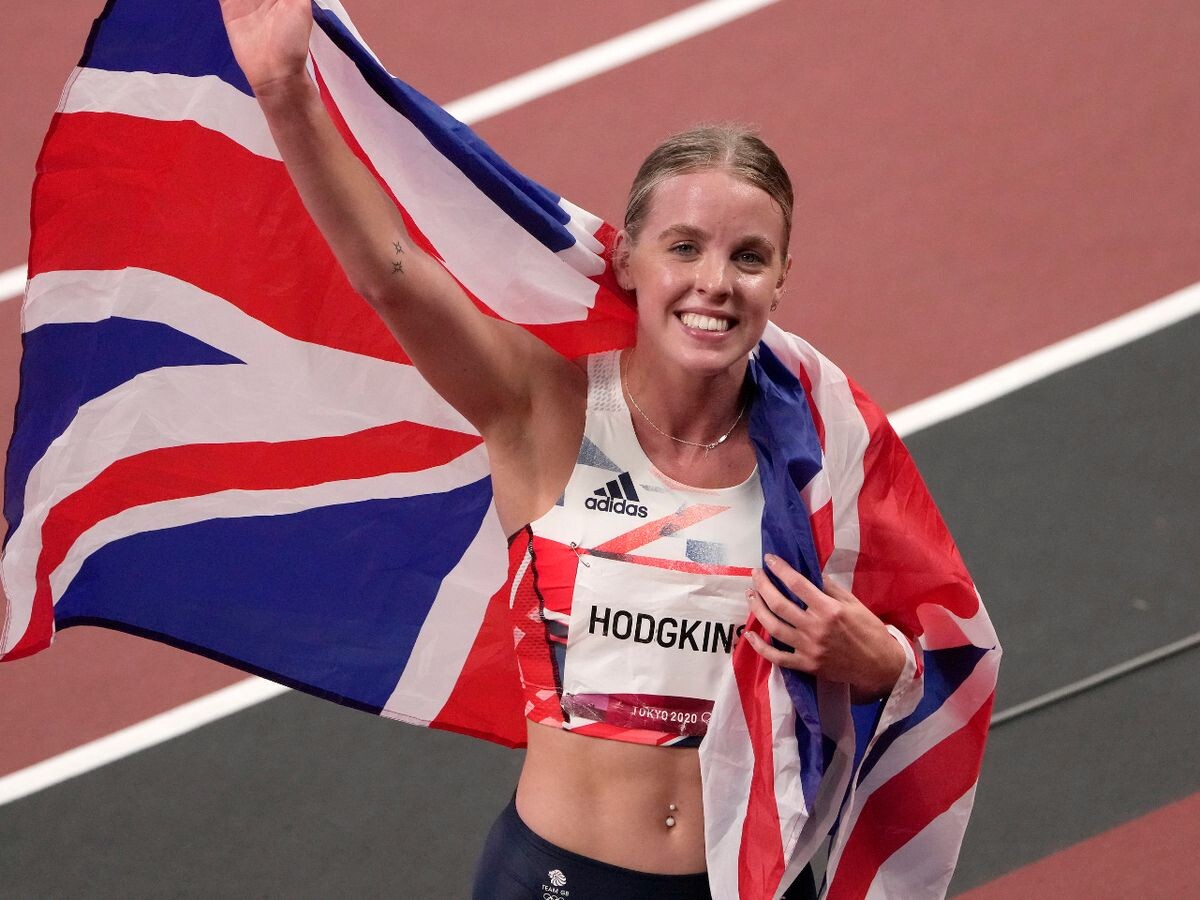
Star-studded fields are set to align for the World Athletics Indoor Tour Gold event, one of seven marquee indoor events across the globe, with Hodgkinson to the fore.
With tickets now on general sale, you can secure your seat to watch Hodgkinson in the second city.
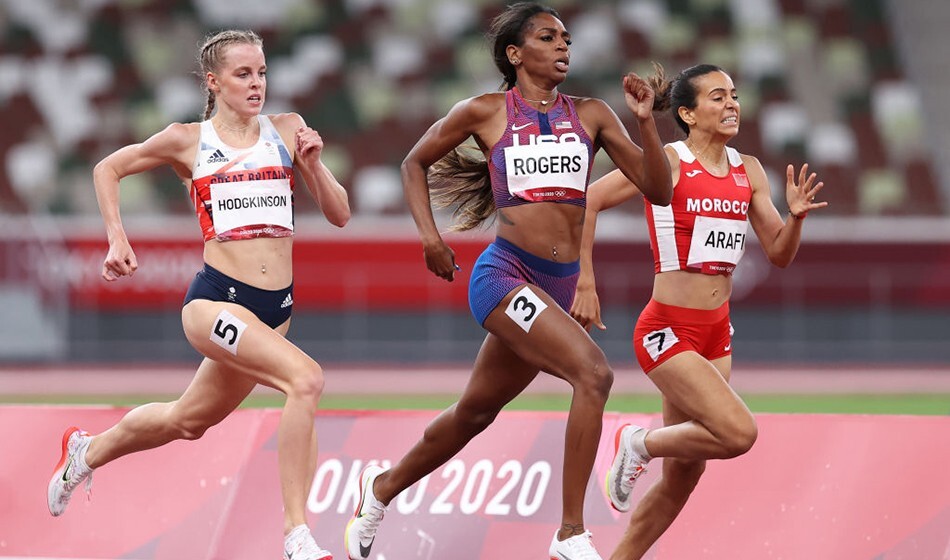
“I’m so excited to be running at the Müller Indoor Grand Prix Birmingham,” said the 19-year-old. “It’s going to be one of my big races of the season and I can’t wait to be back in front of a home crowd.
“I had a great indoor season in 2021 and that set me up perfectly for the outdoors and the Olympic Games.
“Competing at home with a big crowd in Birmingham, will hopefully set me up for the same in 2022 with some massive major Championships on the horizon.”
Hodgkinson made her big breakthrough in the 2021 indoor season. She smashed the world under-20 indoor 800m record in Vienna last January with a clocking of 1:59.03 seconds.
The Leigh Harrier then won 800m gold at the European Athletics Indoor Championships in Torun, becoming the youngest British winner of a European indoor title for more than 50 years.
Hodgkinson’s feats in the 2021 outdoor season need no introduction as she claimed a landmark second national title at the Müller British Athletics Championships. She then took Tokyo by storm, smashing Dame Kelly Holmes’s national record with 1:55.88 to win Olympic silver on her Games debut.
The Müller Indoor Grand Prix Birmingham was last staged in 2019, when Hodgkinson’s fellow Olympic silver medallist Laura Muir broke the 31-year-old British mile record. Women’s middle-distance running took centre stage with Britain’s Shelayna Oskan-Clarke, who went on to win European indoor gold that season, taking 800m victory with 2:01.16.
Ethiopia’s Samuel Tefera broke the men’s 1500m world record two years ago and hopes will be high once again for fast times and packed crowds in Birmingham.
Tickets are on sale NOW.
(11/04/2021) ⚡AMPMuller Indoor Grand Prix Birmingham
The Müller Indoor Grand Prix Birmingham is one of the leading indoor meetings in the world with world-class athletics as part of the World Indoor Tour Gold series. The event will be staged at its traditional home at Utilita Arena Birmingham setting the tone for what is set to be an incredible year of track & field. ...
more...Olympic champion Peres Jepchirchir sets sights on winning World Marathon Majors this weekend
Peres Jepchirchir is the favorite to bag the World Marathon Majors crown set to conclude this weekend with the New York race.
Jepchirchir, who is a two time World Half Marathon champion, needs a win to tie Olympic silver medalist Brigid Kosgei and Joyciline Jepkosgei, who are locked on 50 points .
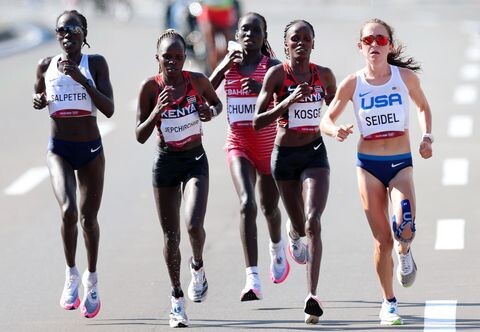
Kosgei, who is the Olympic silver medalist, won the 2019 Chicago and 2020 London 2020 Marathon while Jepkosgei triumphed in New York City in 2019 and London in 2021.
In the men's category, a new overall champion will be crowned with Olympic champion and world marathon record holder Eliud Kipchoge not taking part.
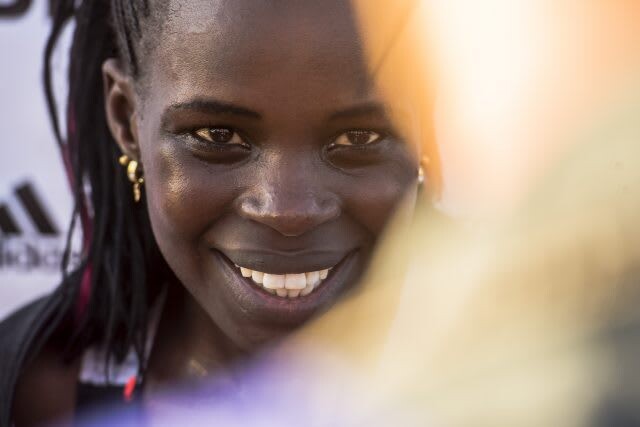
Kipchoge has won the last four editions of the World Marathon Majors but his only victory this time round was at the Tokyo Olympics in August.
Ethiopia's Sisay Lemma currently has the advantage having amassed 34 points from his victory at the 2021 London Marathon and third place at the same venue in 2020.
Only two men can deny the Ethiopian a first AbbottWMM series crown and they are both scheduled to run the New York City Marathon.
His compatriot Kenenisa Bekele’s nine points earned at the 2021 BMW Berlin Marathon mean he can equal Lemma’s 34 points if he wins in the Big Apple.
Belgium’s Abdi Nageeye finished second in the Olympic Marathon and could overtake Lemma if he registers his first Abbott WMM victory this weekend.
Should Bekele triumph, there is no head-to-head contest during the series between the two Ethiopians, so the six race directors of the Majors would each have a vote to decide the champion.
If neither Bekele nor Nageye make the top two, Kenyan pair Vincent Kipchumba and Lawrence Cherono will claim second and third respectively.
Kipchumba bagged the Vienna and Amsterdam marathons in 2019, clocking 2:06:56 and 2:05:09 and finished second in the London in 2020, where he posted 2:05:42 before registering 2:04:28 in 2021.
Cherono clinched the Boston and Chicago marathons in 2019 ,posting 2:07:57 and 2:05:45 respectively and came home second in the Valencia marathon in 2020 in a time of 2:03:04.
(11/03/2021) ⚡AMPby William Njuguna
TCS New York City Marathon
The first New York City Marathon, organized in 1970 by Fred Lebow and Vince Chiappetta, was held entirely in Central Park. Of 127 entrants, only 55 men finished; the sole female entrant dropped out due to illness. Winners were given inexpensive wristwatches and recycled baseball and bowling trophies. The entry fee was $1 and the total event budget...
more...The basics, benefits and limits of altitude training
For years, altitude training has formed an important part of the training of many endurance athletes who cite it as a core part of their season. Here we break down the basic theory behind it, the difficulties athletes must overcome and the main spots to do it.
Though different definitions exist of what constitutes altitude training, we will, for the sake of clarity, consider altitudes in the region of 1500m to 3000m above sea level.
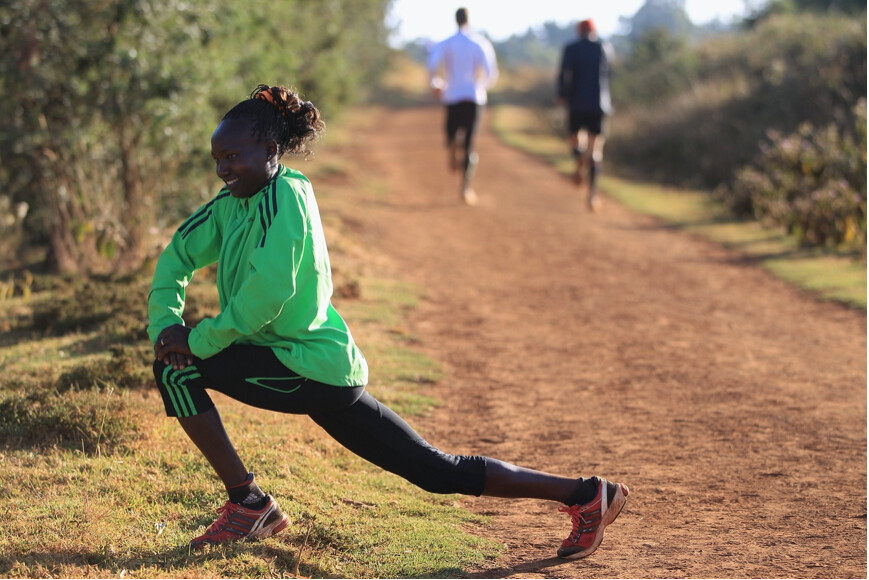
The theory behind altitude training
In simple terms, the oxygen inhaled from the air people breathe affects the energy their muscles receive to perform physical activities. Oxygen is carried around the body within red blood cells and helps the molecules in muscles perform their functions.
The higher the altitude, the lower the atmospheric pressure, which makes it harder for the body to transfer the oxygen into the blood. This is why people can often feel lethargic at altitude.
In response to this situation, the brain triggers the increased production of the hormone erythropoietin (EPO), encouraging the body to make more red blood cells to better transport the oxygen available. This means, over time, the body begins to transport the limited oxygen better than when it first arrived at altitude.
When an athlete then returns to sea level this increased level of red blood cells, coupled with the higher atmospheric pressure, means the body is better able to transport oxygen than it was before and an athlete’s aerobic capacity is increased.
The body will, over time, return to normal levels of red blood cell production if the process is not repeated and the time taken for this to happen will vary from one athlete to the next.
How long do people train at altitude for?
It takes time for the body to adapt to higher altitude and many of the effects do not occur until after a prolonged period of time. Various studies suggest there is no increase in red blood cell count within the first seven to 10 days, meaning usually athletes choose to spend a minimum of three to four weeks at altitude.
Some athletes choose to be based at high altitude throughout the year (e.g. Boulder in Colorado, Iten in Kenya and Addis Ababa in Ethiopia), coming down to sea level for shorter periods around a racing season.
The difficulties of living at altitude
Early on in any stay at altitude individuals will likely find themselves to be lethargic as their body responds to the lower atmospheric pressure. Other side effects can include headaches and difficulty sleeping but these will often wear off as the body slowly adjusts to its new environment.
In extreme cases and at the highest altitudes (usually in excess of 3000m), severe failures to adjust can result in acute mountain sickness (AMS) with a range of possible harmful effects.
Athletes will also find it difficult to replicate the pace they are able to run at sea level because of their body’s reduced ability to transport the available oxygen.
Many will therefore choose to head to lower altitude to perform much of their more intense training. This approach is generally referred to as “live high, train low” but it is an approach only possible where different altitudes exist in close proximity.
Where do people train at altitude?
There are a number of locations where athletes choose to train across the world but some locations are particularly popular. These include Iten (c. 2400m) in the Rift Valley, home to many famous athletes including Mary Keitany and Lornah Kiplagat.
Over the border in Ethiopia, established camps exist in Sululta (c. 2700m) and in the capital Addis Ababa (c. 2355m), with products including Kenenisa Bekele and Haile Gebrselassie.
Europe plays host to a number of Alpine and Pyrenees resorts, including Font Romeu (c. 1850m) in France, and St Moritz (c. 1856m) in Switzerland.
The USA has a number of high altitude hubs, with Boulder (c. 1624m) in Colorado a huge centre of North American running as well as Flagstaff (c. 2106m) in Arizona and Albuquerque (c. 1619m) in New Mexico.
Other locations include Mexico City (c. 2240m), Potchefstroom (c. 1378m) in South Africa, Falls Creek (c. 1600m) in Australia and Ifrane (c. 1660m) in Morocco. All locations come with their various pros and cons so it is important to research properly prior to any trip to altitude.
Are there alternatives to training at altitude?
Some athletes choose to replicate the experience of living in these locations through an altitude tent. These tents reduce the amount of oxygen within them and can be lived and slept in without the need to move location. Some see this as a less expensive and more pragmatic alternative to long trips away from home.
(10/30/2021) ⚡AMP
by World Athletics
Eliud Kipchoge has been named best male athlete of Tokyo 2020 Olympics
Kenya's Eliud Kipchoge on Sunday won the Best Male Athlete accolade during the 2021 Association of National Olympic Committees (ANOC) Awards held in Greece.
Kipchoge delivered a masterclass in marathon running, breaking away at the 30-kilometre mark and never looking back to retain his Olympic title in two hours, eight minutes and 38 seconds during the Tokyo Olympics in August.
He became only the third man to defend the Olympic men’s marathon title after Ethiopia’s Abebe Bikila (1960 and 1964) and East Germany’s Waldemar Cierpinski (1976 and 1980).
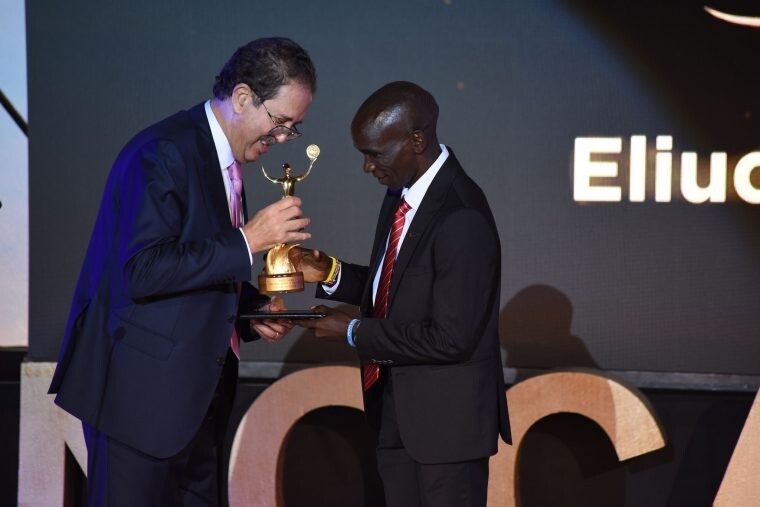
The victory at the Tokyo 2020 Olympics was Kipchoge’s 13th success in the 15 marathons he has raced in since 2013. He broke the world record in 2018 when he timed 2:01.39 in the Berlin Marathon.
On October 12, 2019, Kipchoge timed 1:59.40 at the Ineos 1:59 Challenge in Vienna, Austria. But the time did not count as a new marathon record since standard competition rules were not followed.
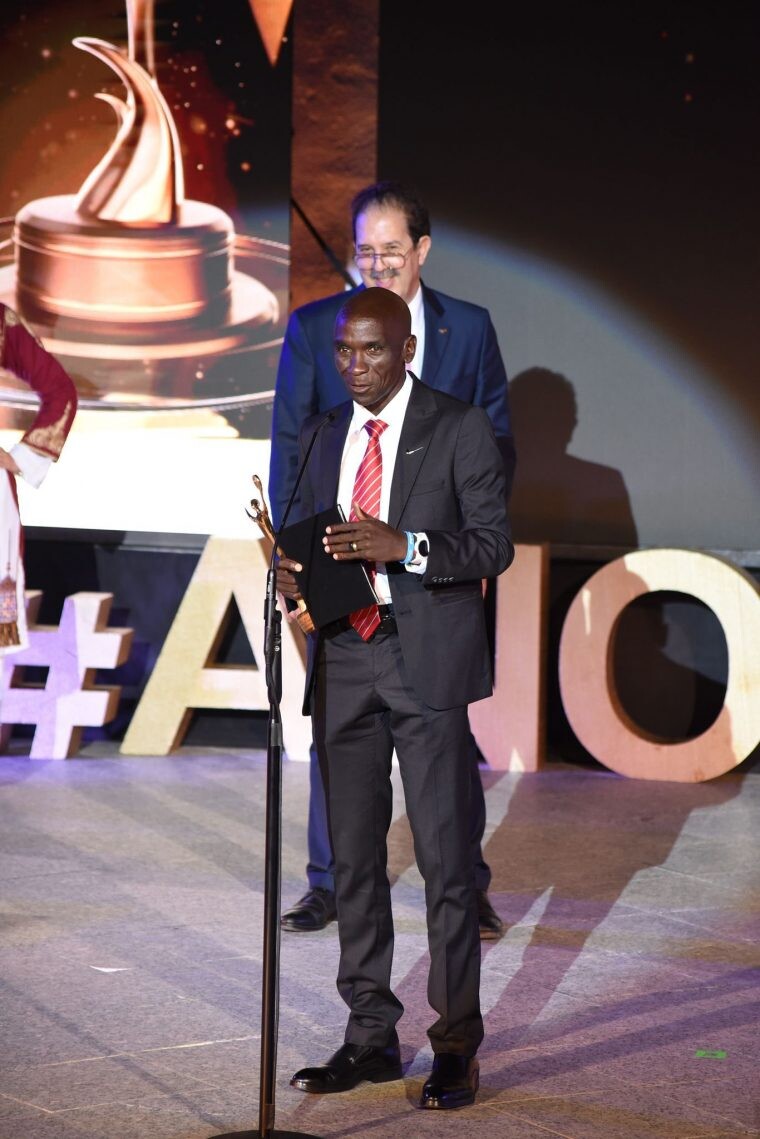
"It is an honor to win the ANOC Award for the Best Male Athlete at the Tokyo Olympics. With so many beautiful performances by so many athletes, I am proud to be the recipient of this award. Thank you all for your great support," the world record holder said.
He received his award from the president of Association of National Olympics Committee of Africa Mustapha Berraf at the Open Air Theatre of the Creta Maris Beach Hotel, in Greece.
The awards were organized by ANOC to celebrate the achievements of athletes at the Tokyo Games.
(10/25/2021) ⚡AMPby Brian Yonga


